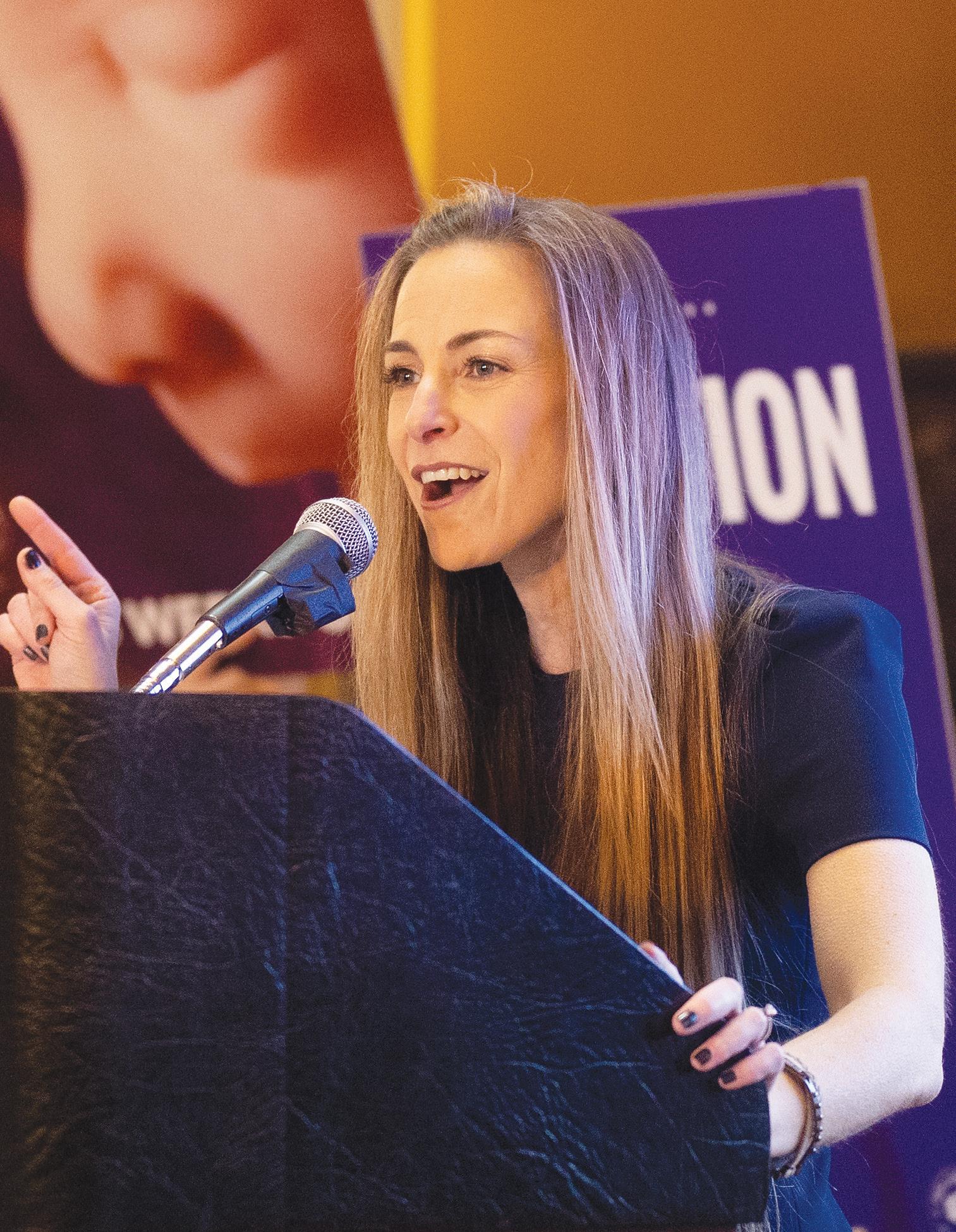

March 9, 2023 • Newspaper of the Archdiocese of Saint Paul and Minneapolis TheCatholicSpirit.com United for Life Alarmed by pro-abortion legislation in Minnesota, pro-life advocates make their voices heard — Page 5 FREEDOM TO DRIVE 5 | HELP TO HOMELESS IN SNOWSTORM 6 | CHURCH FIRE REBOUND 7 PONTIFICATE AT 10 YEARS 12-14 | RETREATS AND LISTENING 15 | CALLING ALL COMPOSERS 19
Pope Francis reflecting on the Transfiguration of Christ as some 25,000 visitors gathered to pray the Angelus in St. Peter’s Square at the Vatican March 5.
NEWS notes
EDUCATING IN A DIGITAL AGE
Catholic school leaders in the Archdiocese of St. Paul and Minneapolis listen to psychiatrist and Sister of Mercy Marysia Weber about the neurobiology of the brain’s reward center and how addictive screens (social media, video games and pornography) induce alterations similar to those noted in substance use disorders. About 80 Catholic grade school and high school leaders, and members of their communities, gathered at the University of St. Thomas in Minneapolis Feb. 28 for the daylong conference “Emerging Questions in Catholic Education: Educating in a Digital Age,” hosted by the archdiocese’s Office for the Mission of Catholic Education. Participants also heard from presenters with ScreenStrong and LiveMore ScreenLess about the challenges, opportunities and risks of students’ digital consumption, and how they can create school environments that foster digital well-being.
STANDING AT THE EQUATOR
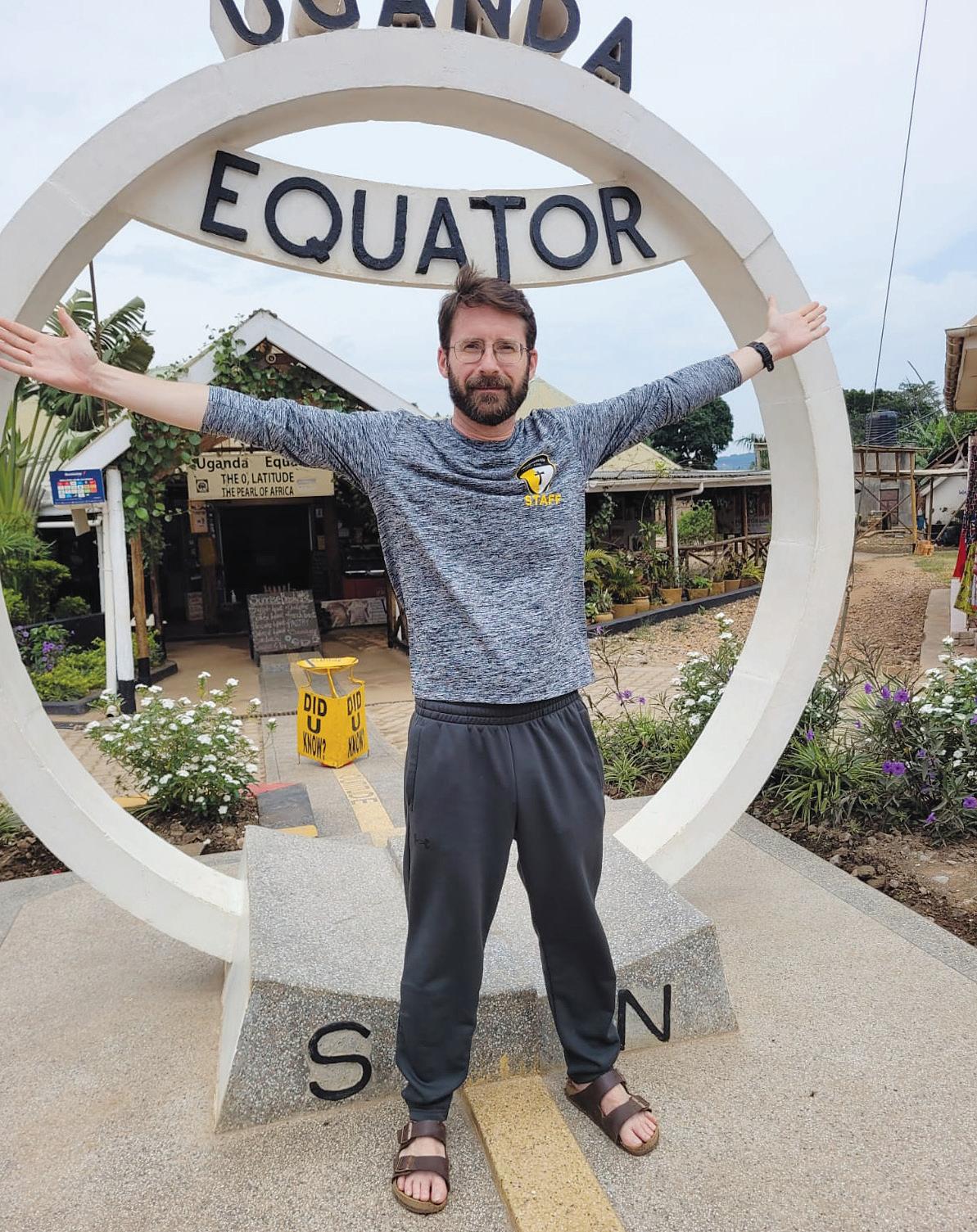
Father John Paul Erickson, pastor of Transfiguration in Oakdale, stands at a marker in Uganda where the equator “passes through.” He returned March 6 from a trip to Uganda to visit Father Zephirino (“Zeph”) Tumwejunise. Father Zeph attended The St. Paul Seminary in St. Paul, with Transfiguration assigned as his teaching parish from 2018 to 2021. Father Erickson planned to attend Father Zeph’s ordination in Uganda in 2021, but could not due to COVID-19related international travel restrictions. Father Zeph now teaches at St. Charles Lwanga high school seminary in Uganda’s Diocese of Kabale. The local Knights of Columbus Council 4374 (St. Paul East Metro Knights of Columbus) raised funds for Father Erickson’s travel expenses.
ON THE COVER Renee Carlson, general counsel of public-interest law firm True North Legal and Minnesota Family Council, leads the cheers at a United for Life rally Feb. 28 at the State Capitol in St. Paul. Nearly 700 pro-life advocates gathered in the rotunda to voice their opposition to pro-abortion legislation working its way through the Legislature. Many also visited lawmakers in their offices. See story on page 5.
DAVE HRBACEK | THE CATHOLIC SPIRIT
Men in the Catholic Watchmen movement and across the archdiocese are invited to a conference March 18 at All Saints in Lakeville designed to help awaken, invigorate and strengthen them in their love for Jesus as his disciples. Archbishop Bernard Hebda will celebrate the opening Mass for the daylong Archdiocesan Men’s Conference. The keynote speaker will be Devin Schadt, executive director of Pennsylvania-based Fathers of St. Joseph. Titled, “Raising the Bar, Men of Faith Walking Together,” the conference will include Bishop Joseph Williams and Deacon Joe Michalak providing an update on Synod Evangelization Teams and discussing the impact of small groups. Register at tinyurl com/Pruc7jun
With a snowstorm affecting travel in Minnesota, Archbishop Bernard Hebda offered clergy and the faithful a four-day window to receive Ash Wednesday ashes. Ash Wednesday fell on Feb. 22 this year, and ashes could be distributed through Feb. 26, the first Sunday of Lent. While Ash Wednesday is not a holy day of obligation, it is considered by many to be an important introduction to the Lenten season. The archbishop said the additional options for distribution of ashes could take place so long as the ashes were blessed on Ash Wednesday and the distribution occurred outside of Mass. The ritual is found in the Book of Blessings, no. 1656.
The School Sisters of Notre Dame Central Province announced Feb. 24 it signed a purchase agreement for Drummer Growth, LLC, in Mankato to buy its property in that city at 170 Good Counsel Drive, minus Loyola Catholic School. The site was established in 1912 on about 135 acres to serve the educational needs of the surrounding community and aid in the formation of sisters. About 110 sisters living at Our Lady of Good Counsel have been moving to Benedictine Living Community in Shakopee, and about 25 plan to live independently in Mankato and continue their ministry there.
Two directors of music at local parishes had the chance to showcase their talent during a recently recorded musical performance. Brenda Sevcik, music director at St. John the Baptist in Savage, and Samuel Backman, director of sacred music and liturgical life at Holy Cross in Minneapolis, performed with other members of the Twin Cities Chapter of the American Guild of Organists for the Feb. 13 edition of the nationally broadcast Pipedreams program. Hosted by Minnesota Public Radio since 1982, the weekly program explores the art of pipe organ music. Sevcik performed “Joie et clarté de Corps Glorieux,” composed by Oliver Messiaen. Backman performed “Fanfare and Gothic March,” composed by Guy Weitz.
New Life Family Services’ First Care center reported damage and vandalism at its location in Minneapolis’ Phillips neighborhood March 3. The president of the center — which at no cost offers baby items and has on-site social workers to inform mothers about alternatives to abortion — captured video of broken windows and exterior graffiti. “We are fully committed to continue serving the Phillips community, as well as at all our centers, with the holistic compassion and care families deserve,” a statement on the center’s website read in response to the damage.
PRACTICING Catholic
On the March 3 “Practicing Catholic” radio show, host Patrick Conley interviews Deacon Joe Michalak, director of the archdiocesan Office of Synod Evangelization, who provides an update on parish-based Synod Evangelization Teams studying at The St. Paul Seminary Catechetical Institute’s School of Discipleship. Also featured are Leah Darrow, a former model on a reality television show, who now teaches her own personal development program from her family’s 80-acre farm; and Lauren DeZelar and Katie Stambrosky from St. Paul’s Outreach, who discuss the best ways to keep young people connected to their faith at college. Listen to interviews after they have aired at PracticingcatholicShow com or anchor fm/Practicing-catholic-Show with links to streaming platforms
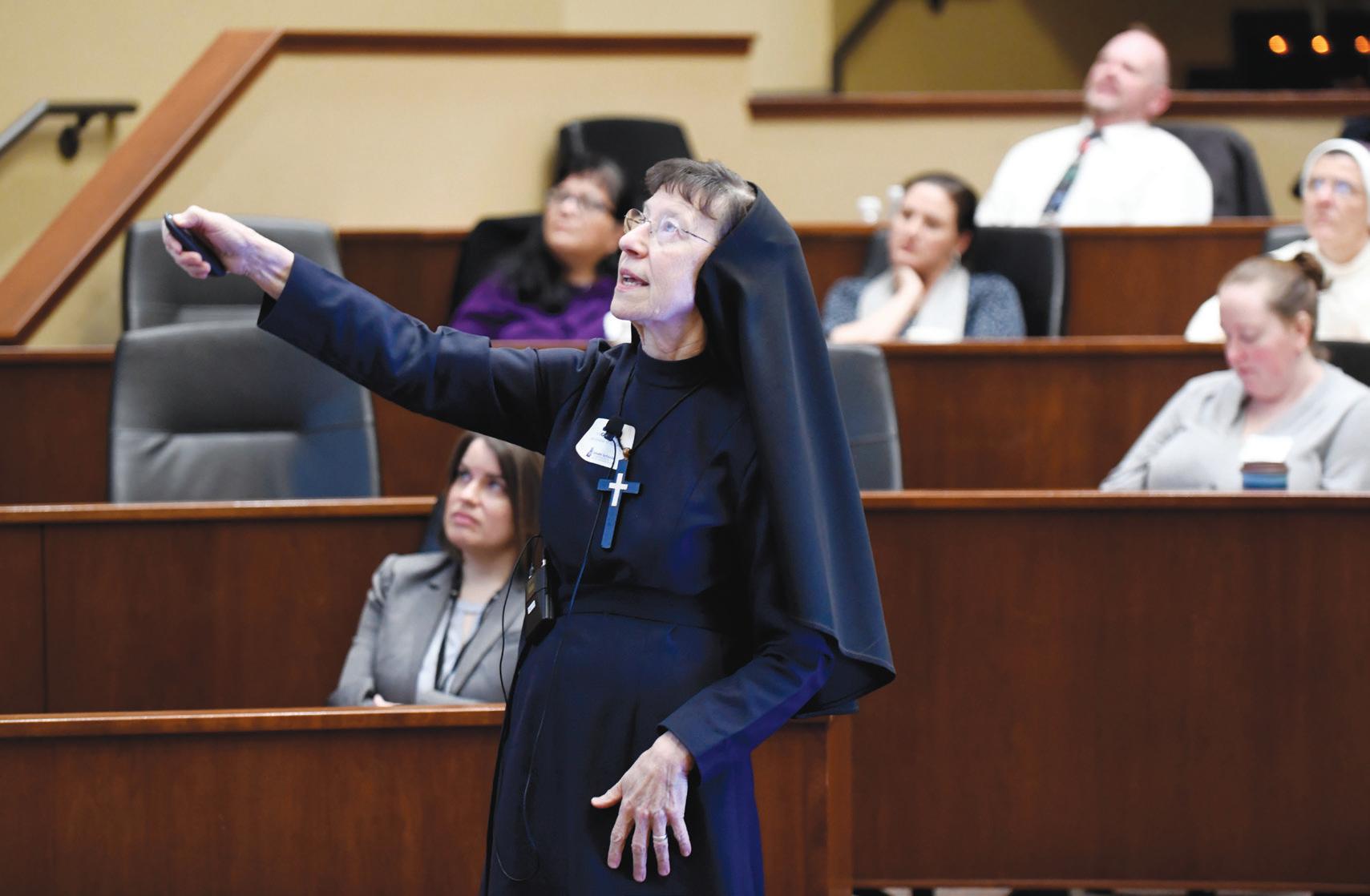
Materials credited to CNS copyrighted by Catholic News Service. Materials credited to OSV News copyrighted by OSV News. All other materials copyrighted by The Catholic Spirit Newspaper. Subscriptions: $29.95 per year; Senior 1-year: $24.95. To subscribe: (651) 291-4444; To advertise: Display Advertising: (651) 291-4444; Classified Advertising: (651) 290-1631. Published semi-monthly by the Office of Communications, Archdiocese of St. Paul and Minneapolis, 777 Forest St., St. Paul, MN 55106-3857 • (651) 291-4444, FAX (651) 291-4460. Per odicals postage paid at St. Paul, MN, and additional post offices. Postmaster: Send address changes to The Catholic Spirit, 777 Forest St., St.Paul, MN 55106-3857. TheCatholicSpirit.com • email: tcssubscriptions@archspm.org • USPS #093-580 United in Faith, Hope and Love The Catholic Spirit is published semi-monthly for The Archdiocese of Saint Paul and Minneapolis Vol. 28 — No. 5 MOST REVEREND BERNARD A. HEBDA, Publisher TOM HALDEN, Associate Publisher JOE RUFF, Editor-in-Chief REBECCA OMASTIAK, News Editor 2 • THE CATHOLIC SPIRIT MARCH 9, 2023
PAGETWO
So many luminous faces, smiles, wrinkles, so many tears and scars speak to the love around us. Let us learn to recognize them and fill our hearts with them.
COURTESY FATHER JOHN PAUL ERICKSON
JIM BOVIN | COURTESY OMCE
Drexel Mission Schools’ leaders honor feast of patroness on pilgrimage
It’s not easy for a Pittsburgher to say anything positive about Philadelphia.
I nonetheless have to admit that I recently had a very powerful experience of God’s grace in the City of Brotherly Love. It occurred during a once-in-alifetime spiritual pilgrimage of a group of principals and pastors from our archdiocese who traveled to Philadelphia for the feast of St. Katharine Drexel, the courageous and forward-thinking foundress of the Sisters of the Blessed Sacrament.
In an audience with Pope Leo XIII, Kate Drexel, a devout young laywoman from Philadelphia with a heart for the poor, had asked the Holy Father to send missionaries to the United States to work with our Native American communities. The pope responded: “Why, my child, don’t you undertake that missionary work?” She eventually came to see that as her vocation and founded a religious community to serve our nation’s Native American and African American populations. As one of the primary beneficiaries of the Drexel family fortune, St. Katharine would go on to spend more than $20 million of her personal resources, then a considerable fortune, to fund schools and educational programs serving underserved and economically challenged communities.
As reflected in the name of the community she founded, she drew her considerable strength from the Eucharist. When she died in 1955, many regarded her as a saint. In fact, she was beatified in 1988 and canonized in 2000. I was privileged to be at her canonization. In 2018, her tomb was moved from the motherhouse of her religious community to the very chapel that her family had donated inside the Cathedral of Sts. Peter and Paul
Los directores y pastores de las Escuelas Misioneras de Drexel celebran la fiesta de la patrona en peregrinación
No es fácil para un habitante de Pittsburgh decir algo positivo sobre Filadelfia. Sin embargo, debo admitir que recientemente tuve una experiencia muy poderosa de la gracia de Dios en la Ciudad del Amor Fraternal. Ocurrió en el curso de una peregrinación espiritual una vez en la vida de un grupo de directores y pastores de nuestra arquidiócesis que viajaron a Filadelfia para la fiesta de St. Katharine Drexel, la valiente y progresista fundadora de las Hermanas de el Santísimo Sacramento.
En una audiencia con el Papa León XIII, Kate Drexel, una joven laica devota de Filadelfia con un corazón para los pobres, había pedido al Santo Padre que enviara misioneros a los Estados Unidos para trabajar con nuestras comunidades nativas americanas. El Papa respondió: “¿Por qué, hija mía, no emprendes esa obra misionera?”. Eventualmente llegó a ver eso como su vocación y fundó una comunidad religiosa para servir a las poblaciones de nativos americanos y afroamericanos de nuestra nación. Como uno de los principales beneficiarios de la fortuna de la familia Drexel, St. Katharine gastaría más de $20 millones de sus recursos personales, entonces una fortuna considerable, para financiar escuelas y programas educativos que atienden a comunidades desatendidas y con problemas económicos. Como se refleja en el nombre de la comunidad que ella fundó, sacó su fuerza considerable de la Eucaristía. Cuando murió en 1955, muchos la consideraron una santa. De hecho, fue beatificada en 1988 y canonizada en 2000. Tuve el privilegio de
in Philadelphia.
One of the fruits of the 2019 Archdiocesan Roadmap for Excellence in Catholic Education was the creation of our Drexel Mission Schools initiative. The experts we had gathered to help us articulate a plan for strengthening our Catholic schools recognized the distinct needs of Catholic elementary schools that served a high percentage of the type of students that would have been particularly near and dear to the heart of St. Katharine Drexel. We identified a need and desire to provide special programming and services for excellent schools that served a majority of children who were students of color and a majority qualifying for free or reduced-price lunch. Seeking a heavenly patron for that important work, we turned to St. Katharine Drexel and named the initiative for her. There are presently 10 elementary schools in our archdiocese that meet those criteria and have opted into the Drexel program.
Through the incredible generosity of local philanthropists and a partnership with Boston College, these schools have been able to facilitate wraparound social services for their students and their families, assisting them at times not only with educational support but also with access to food, housing and mental health services. It strikes me that they are striving to do precisely the work that St. Katharine Drexel and her Blessed Sacrament sisters would have embraced.
Ever since the Drexel Mission Schools initiative began, we had been looking for an opportunity to make a pilgrimage to the shrine of St. Katharine Drexel so we could ground our work in her extraordinary vision. To be there in Philadelphia on her feast, March 3, was a great grace. I felt particularly blessed to have had the
estar en su canonización de ella. En 2018, su tumba fue trasladada de la casa madre de su comunidad religiosa a la misma capilla que su familia había donado dentro de la Catedral de los Santos Pedro y Pablo en Filadelfia.
Uno de los frutos de la Hoja de ruta arquidiocesana para la excelencia en la educación católica de 2109 fue la creación de nuestra iniciativa Drexel Mission Schools. Los expertos que habíamos reunido para ayudarnos a articular un plan para fortalecer nuestras escuelas católicas reconocieron las distintas necesidades de las escuelas primarias católicas que atendían a un alto porcentaje del tipo de estudiantes que habrían sido particularmente cercanos y queridos en el corazón de St. Katharine Drexel. Identificamos la necesidad y el deseo de brindar programas y servicios especiales para escuelas excelentes que atendieran tanto a una mayoría de niños que eran estudiantes de color como a una mayoría que calificaba para recibir almuerzos gratis oa precio reducido. Buscando un patrón celestial para ese importante trabajo, recurrimos a St. Katharine Drexel y nombramos la iniciativa para ella. Actualmente hay 10 escuelas primarias en nuestra arquidiócesis que cumplen con esos criterios y que han optado por el programa Drexel.
A través de la increíble generosidad de filántropos locales y una asociación con Boston College, esas escuelas han podido facilitar servicios sociales integrales para sus estudiantes y sus familias, ayudándolos en ocasiones no solo con apoyo educativo sino también con acceso a alimentos, vivienda y servicios de salud mental. Me sorprende que se esfuercen por hacer precisamente el trabajo que St. Katharine Drexel y sus hermanas del Santísimo Sacramento habrían abrazado.
Desde que comenzó la iniciativa de las
opportunity to not only join our Drexel principals and pastors in learning more about her and praying at her tomb, but also to be the celebrant for the cathedral Mass in her honor. I will always be very grateful to Archbishop Nelson Perez for ceding that privilege to me this year. I will never forget being able to celebrate holy Mass using the chalice that St. Katharine and her siblings had donated to the cathedral! Given that the chalice had been donated before our patroness entered religious life, it simply bore the inscription “Kate” — what a wonderful reminder of the ordinariness and approachability of the saints.
As if that weren’t enough, some members of our group were blessed to meet Bob Gutherman. The healing of his ear through the intercession of St. Katharine Drexel was the miracle that qualified her for beatification. Not surprisingly, my prayer for our pilgrims became “St. Katharine, help us, and the teachers, staff and volunteers who serve in our Drexel Mission Schools, to hear our brothers and sisters in need.”
My fifth grade teacher, Sister Agnita, used to remind us that “God is never outdone in generosity.” I know that the principals and pastors who traveled to Philadelphia had to make the sacrifice of being away from their students and families for the duration of the pilgrimage. As I listened to them sharing on our final morning together the graces they had received, it was clear to me our gracious God had been true to Sister Agnita’s promise: What we received was far in excess of any sacrifices that we had made. I pray that through the intercession of their heavenly patroness, our Drexel Mission Schools might continue to be a blessing for the students and families they serve. Please join me in that prayer.
Escuelas Misioneras de Drexel, habíamos estado buscando la oportunidad de hacer una peregrinación al santuario de St. Katharine Drexel para poder fundamentar nuestro trabajo en su extraordinaria visión. Estar allí en Filadelfia en su fiesta, el 3 de marzo, fue una gran gracia. Me sentí particularmente bendecido de haber tenido la oportunidad no solo de unirme a nuestros directores y pastores de Drexel para aprender más sobre ella y orar en su tumba, sino también de ser el celebrante de la Misa en la catedral en su honor. Siempre estaré muy agradecido al Arzobispo Nelson Pérez por cederme ese privilegio este año. ¡Nunca olvidaré poder celebrar la Santa Misa usando el cáliz que St. Katharine y sus hermanos habían donado a la catedral!
Dado que el cáliz había sido donado antes de que nuestra patrona ingresara a la vida religiosa, simplemente tenía la inscripción “Kate”, qué maravilloso recordatorio de la ordinariez y accesibilidad de los santos.
Como si eso no fuera suficiente, algunos miembros de nuestro grupo tuvieron la suerte de conocer a Bob Gutherman. La curación de su oreja por intercesión de St. Katharine Drexel fue el milagro que la calificó para la beatificación. No es una sopresea que mi oración por nuestros peregrinos se convirtió en “St. Katharine, ayúdanos a nosotros y a los maestros, el personal y los voluntarios que sirven en nuestras Escuelas de la Misión de Drexel, a escuchar a nuestros hermanos y hermanas necesitados”.
Mi maestra de quinto grado, la hermana Agnita, solía recordarnos que “Dios nunca se deja vencer en generosidad”. Sé que los directores y pastores que viajaron a Filadelfia tuvieron que hacer el sacrificio de estar lejos de sus estudiantes y familias durante la peregrinación. Mientras los escuchaba compartir en nuestra última mañana juntos las gracias que habían
recibido, me quedó claro que nuestro Dios misericordioso había sido fiel a la promesa de la hermana Agnita: lo que recibimos superó con creces cualquier sacrificio que hubiéramos hecho. Ruego que a través de la intercesión de su patrona celestial, nuestras Escuelas Misioneras de Drexel puedan continuar siendo una bendición para los estudiantes y las familias a las que sirven. Por favor, únase a mí en esa oración.
OFFICIALS
Archbishop Bernard Hebda has announced the following appointments in the Archdiocese of Saint Paul and Minneapolis:
Effective January 29, 2023
Reverend Mark Underdahl, granted disability retirement status. Father Underdahl has served the Archdiocese as a priest since his ordination in 1996.
Effective January 30, 2023
Reverend Robert Fitzpatrick, assigned as parochial administrator of the Church of Saint Francis of Assisi in Lake Saint Croix Beach.
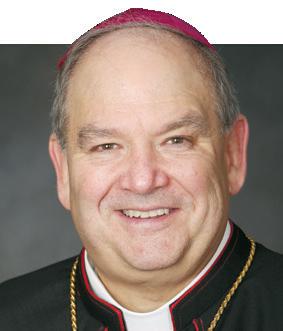
Father Fitzpatrick is a retired priest of the Archdiocese.
Effective March 1, 2023
Reverend Gregory Abbott, assigned Parochial Vicar of the Church of Saint Peter in Forest Lake. This is a transfer from his previous assignment as pastor of the Church of Saint Dominic in Northfield and the Church of the Annunciation in Hazelwood.
Effective July 1, 2023
Reverend Stephen Ulrick, granted the status of retired priest. Father Ulrick has served this Archdiocese since his ordination in 1982, most recently at the Church of the Holy Name of Jesus in Medina.
MARCH 9, 2023 THE CATHOLIC SPIRIT • 3
FROMTHEARCHBISHOP
ONLY JESUS | ARCHBISHOP BERNARD HEBDA
SLICEof LIFE
As you plan your charitable giving for this year, consider putting away the checkbook. Your best gift option might be in your IRA.
If you’re age 70 ½ or older, you can make a qualified charitable distribution (QCD) from your traditional IRA — and see new tax benefits.
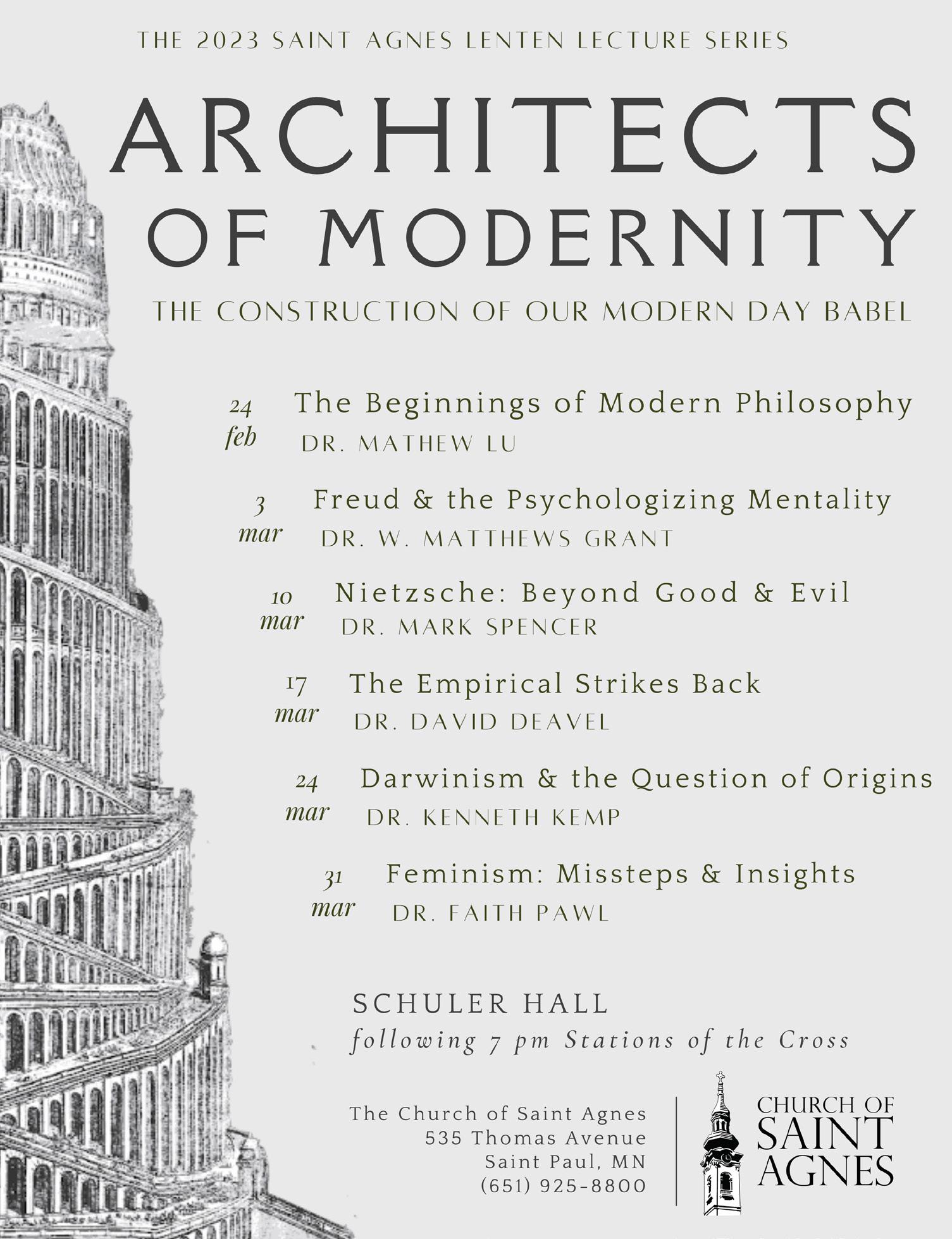
Show Choir Spectacular
Senior Joseph Thomas, center, of the Company of Singers at Totino-Grace High School in Fridley sings and dances during a special performance at the school March 3 for middle school students from six Catholic schools in the Archdiocese of St. Paul and Minneapolis. It was a tune-up for the 27th annual Show Choir Spectacular March 4, with 19 show choirs from Minnesota and five other states competing at Totino-Grace. “It’s an amazing event,” said Philip Brown, director of choirs at Totino-Grace, who is in his second year. The school has more than 60 students in its Company of Singers, which is the top group at the school. Totino-Grace also has an all-boys and an all-girls show choir for younger students, which also performed in the Show Choir Spectacular. Show choir, which combines singing and dancing, was started at Totino-Grace more than 30 years ago.

4 • THE CATHOLIC SPIRIT MARCH 9, 2023 LOCAL
DAVE HRBACEK | THE CATHOLIC SPIRIT
Call us to learn more about QCDs and charitable planning. 651.389.0300 ccf-mn.org Think outside the (gift) box.
Pro-life rally at Capitol draws hundreds; many visit lawmakers
By Joe Ruff The Catholic Spirit
Chants of “united” followed by “for life” echoed in the State Capitol Feb. 28 in St. Paul as nearly 700 pro-life advocates gathered in the rotunda and many fanned out to visit with lawmakers considering pro-abortion measures such as allowing infants to die after attempted abortions.
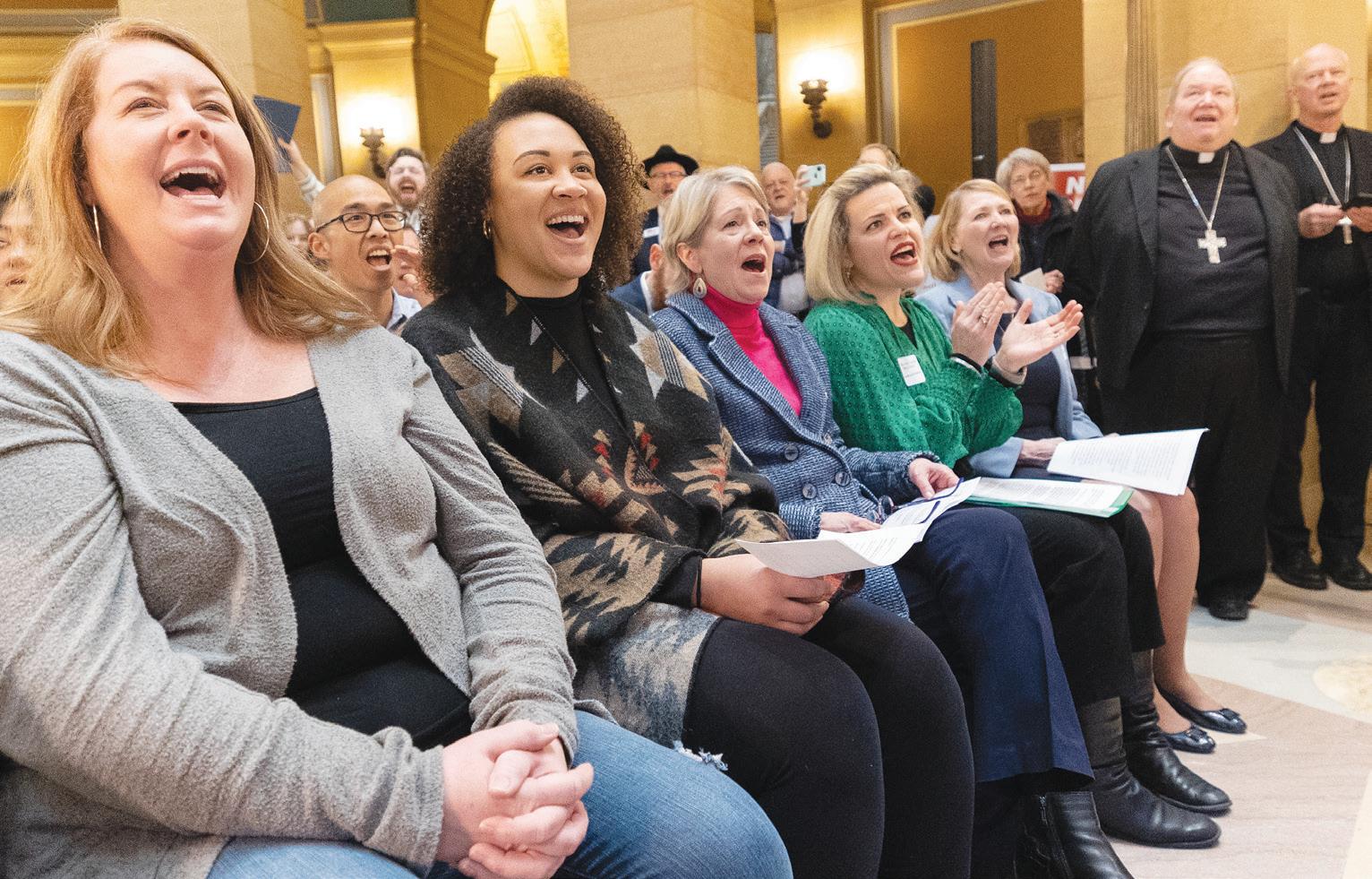
“My first words to you this morning are, ‘Peace be with you,’” said Archbishop Bernard Hebda of the Archdiocese of St. Paul and Minneapolis, joined by three other Catholic bishops in the state, as he addressed those gathered and asked them to remind legislators to welcome life and protect it in law.
“It is impossible to live in a peaceful society without peace in the womb,” the archbishop said. “We want peace with justice. We are here advocating for prenatal justice.”
Bishops Daniel Felton of Duluth, Chad Zielinski of New Ulm and Bishop Emeritus John LeVoir, also of New Ulm, joined the archbishop. Religious sisters and brothers, lay women and men in the Catholic Church, and people from other denominations and all walks of life filled both floors of the rotunda for United for Life.
People held signs including, “I am human,” “Let her live” and “Pregnancy centers support women and their families.” Many held State Capitol maps and lobbying materials as they prepared to meet with lawmakers in their offices.
Renee Carlson, general counsel of public-interest law firm True North Legal and Minnesota Family Council, emceed the rally and led the United for Life cheer. “Good morning, pro-life Minnesota,” Carlson greeted the crowd. “Welcome to the first ever United for Life
day at the State Capitol.”
“We’re here to stand for life,” said Franciscan Brother of Peace Conrad Richardson, dressed in black robes and cincture and holding a sign backing pregnancy resource centers. “Each life is worth inestimable value at any stage.”
Only a month earlier, Jan. 27, pro-life and pro-abortion advocates gathered in great number in front of the Senate chambers as that body prepared to debate the Pro Act, which passed the House Jan. 19 and the Senate Jan. 28, and Gov. Tim Walz signed into law Jan. 31. The act places into state law a right to abortion in Minnesota for any reason and without limit on viability.
Archbishop Hebda warned in his “Only Jesus” column in the Feb. 9 edition of The Catholic Spirit that the Pro Act marked “just the tip of the legislative
iceberg this term.” He urged people to come to the Feb. 28 rally as members of the House and Senate debate HF91 and SF70, companion bills that among other things would remove protections for babies born alive after an attempted abortion.
The bills also would eliminate parental notification as women, including minors, seek an abortion, and remove the Woman’s Right to Know pre-abortion informed consent law. The proposals would eliminate state abortion data collection, the 24-hour waiting period before an abortion and expand taxpayer funding for abortion. Still another bill, HF289, would require pregnancy resource centers receiving funds under a state Positive Alternative Grant program to refer for abortions, undermining their mission of offering alternatives to
Walz signs ‘Driver’s Licenses for All’ bill into state law
By Rebecca Omastiak
The Catholic Spirit
Gov. Tim Walz signed into law March 7 legislation to allow undocumented people in Minnesota to apply for state driver’s licenses.
The legislation — known as “Driver’s Licenses for All” — would allow an individual to obtain a Minnesota driver’s license or state identification card without the need to show proof of citizenship or lawful presence in the United States. Proof of lawful presence in the U.S. became a requirement to obtain a Minnesota license or identification card following a rule change implemented in 2003.
“Ensuring drivers in Minnesota are licensed and carry insurance makes the roads safer for everyone,” the governor said in a post to social media. “As a longtime supporter of Driver’s Licenses for All, I’m proud to sign it into law as we move toward making Minnesota a safe state for all.”
HF4 passed the House 69-60 on Jan. 30. The Senate passed the bill Feb. 22 with a 34-31 Democrat party-line vote. Senate amendments were returned to the House, and an amended version was passed March 2 on a 7060 vote before it was presented to Walz.
Archbishop Bernard Hebda and members of the Minnesota Catholic Conference were among those backing the legislation. Archbishop Hebda urged legislators to act on the proposal “long overdue in its passage” when he spoke at a Jan. 3 news conference as the Minnesota Legislature began its 2023 session.
“Every Minnesota resident, especially those who have proven themselves as hardworking contributors to our communities, deserves to live with dignity, not
in fear of being separated from their families every time they drive to meet basic needs,” Archbishop Hebda said. “As a Church, we work in the public arena to keep families together and help them flourish; creating driver’s licenses for all is part of our families first policy agenda.”
Archbishop Hebda said the proposal would end “the fear families face that a traffic violation might end in an undocumented person’s potential deportation, separating them from their loved ones.”
The archbishop and others have argued because the federal immigration system is broken, it’s important to help meet the needs of undocumented people already in Minnesota.
Senate bill sponsor Sen. Zaynab Mohamed (DFLMinneapolis) said during the Senate floor session Feb. 22 that the legislation “is a bipartisan issue.” However, Sen. Jeff Howe (R-Rockville) argued: “I really wanted to vote for this bill, but I’m not going to be able to have that opportunity because we didn’t make this a bipartisan bill.”
Sen. Eric Pratt (R-Prior Lake) also argued that “despite the authors’ insistence that this is about keeping our roads safe … that’s not the only objective.” However, Sen. Bobby Joe Champion (DFL-Minneapolis), bill co-sponsor, said that is the objective. “This is a driver’s license, not a voting card, not a benefits card, but a well-earned driver’s license.”
“The families who need these driver’s licenses are like any of our families,” Champion said. “They get up and go to work, they have kids … involved in a number of school activities,” which requires “driving back and forth.” He said legislators’ votes to pass the legislation indicate to “all of our fellow Minnesotans ‘move
abortion.
The Minnesota Catholic Conference, the public policy voice of the state’s Catholic bishops, helped organize United for Life. The conference urged “no” votes but also wanted lawmakers to consider legislation that would help mothers choose life for their children, such as expanding the state sales tax exemption for certain baby products. MCC officials also are asking for increased funding for pregnancy resource centers under the current law, even as some argue to cut that funding. The conference is encouraging a permanent child tax credit and housing support to promote family economic stability.
Helping MCC organize the rally were Minnesota Family Council, Minnesota Citizens Concerned for Life, Pro-Life Action Ministries, and the University of St. Thomas Prolife Center.
“This is an unprecedented effort — Minnesota’s largest pro-life advocacy organizations and hundreds of Minnesotans are coming together to show that, despite the current legislative climate, our voice will not be silenced,” said Maggee Hangge, public policy associate at MCC.
Days before the rally, MCC and other organizers helped people schedule meetings with lawmakers. After the rally, many pro-life advocates paid their visits. Barbara Herzog, 59, of St. Peter in Forest Lake, and a friend, LeLe Jurek, 70, of St. Patrick in Oak Grove, met with Republican Sen. Michael Kreun of Blaine. Pleasantries were exchanged and they argued against HF91 and SF70, the women said.
“When we rally together, it shows we have a presence,” Herzog said of the meeting and the rally. “We need to be active now,” Jurek added.
forward and come out of the shadows because you matter.’ They matter and what we do in this chamber matters when it comes to improving our lives.”
Mohamed said she chose to sponsor the legislation because “this affects my life every day. I have family and friends who have been affected by this issue for decades … I talked to people in my district, I talked to people across the state.” Passing the legislation, to Mohamed, is “about the thousands of people, that their lives will be transformed because of this bill.”
House bill sponsor Rep. Aisha Gomez (DFLMinneapolis) said in a statement, “Allowing all Minnesotans to earn a driver’s license is the right thing to do. For public safety, for our shared prosperity, and to honor the inherent humanity and dignity of all community members. It should have been done years ago but it’s always the right time to do the right thing.” Rep. María Isa Pérez-Vega (DFL-St. Paul), co-sponsor of the bill, said “the ability to obtain a driver’s license should be viewed as a human right and a necessity for all of our communities to be safe commuting and traveling on our roads.”
After the Senate passed the bill Feb. 22, Jason Adkins, executive director and general counsel for the Minnesota Catholic Conference, said, “We are grateful the Legislature passed the immigrant driver’s license bill, for which we have worked over a decade. The legislation helps keep immigrant families together; frees them from some anxiety as they go to work, church or school; and supports the common good by making sure all drivers are licensed, trained and insured.”
Now signed into state law, the bill takes effect Oct. 1 for applications.
MARCH 9, 2023 LOCAL THE CATHOLIC SPIRIT • 5
DAVE HRBACEK | THE CATHOLIC SPIRIT
Women and men chant “united” and “for life,” including Archbishop Bernard Hebda of St. Paul and Minneapolis and Bishop Chad Zielinski of New Ulm, at the United for Life rally at the State Capitol.
Day center open 36 straight hours amid snowstorm
By Rebecca Omastiak The Catholic Spirit
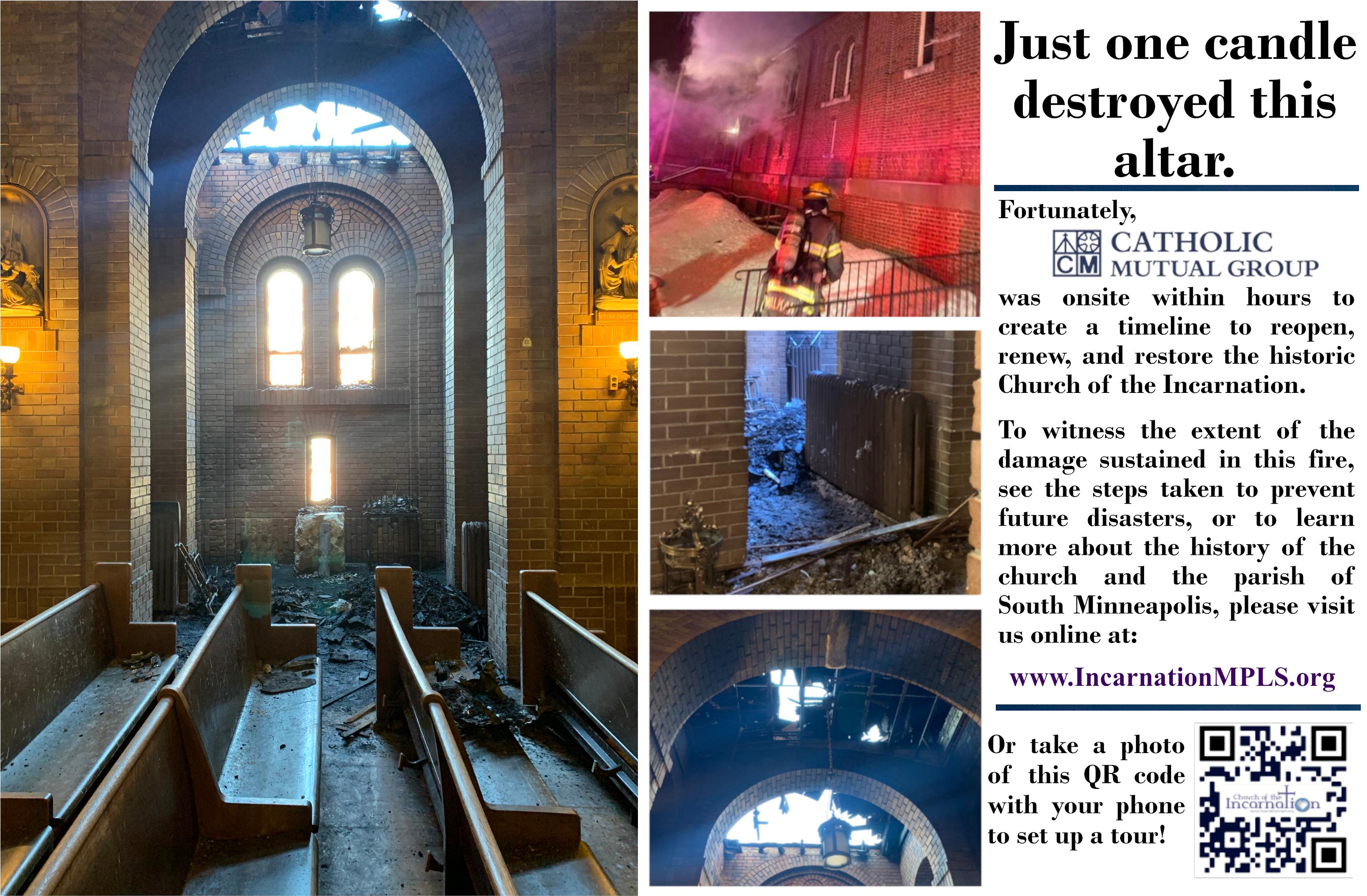
Snow fell and the doors stayed open — daytime services at Catholic Charities Twin Cities’ St. Paul Opportunity Center in St. Paul continued overnight to provide those experiencing homelessness respite from a February snowstorm.
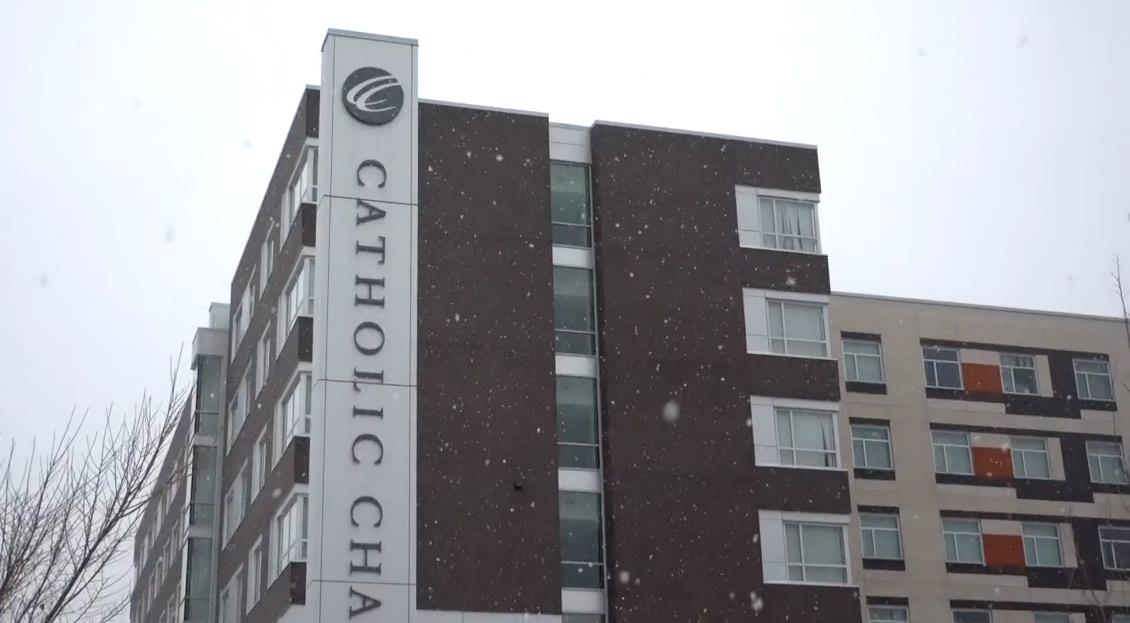
The doors of the St. Paul Opportunity Center opened at 9 a.m. Feb. 23. The center remained open for 36 straight hours, ultimately closing at 9 p.m. Feb. 24. Staff at the center provided hot meals, showers and shelter from the storm.
According to Michael Goar, president and CEO of Catholic Charities Twin Cities, the nonprofit organization is the only provider in the Twin Cities of both overnight and daytime services, which include those mentioned above as well as laundry services and storage lockers.
In a statement provided to The Catholic Spirit on Feb. 23, Goar expressed his gratitude to “the dedicated Catholic Charities team,” staff who “came together to keep our St. Paul Opportunity Center open overnight — going on 36 hours straight — to support our unsheltered community during the worst of it. I am so proud of this skilled team, many of whom worked around the clock, to support our most vulnerable neighbors.”
The Twin Cities felt the effects of the snowstorm. The National Weather Service’s Twin Cities office reported 13.4 inches of snow fell at the Minneapolis-St. Paul International Airport Feb. 21-23, pushing the 2022-2023 winter season to the 17th-snowiest on record. A blizzard warning was in effect for several counties in western and central Minnesota. Gov. Tim Walz declared a peacetime emergency and authorized the Minnesota National Guard to provide emergency relief services, to assist other state agencies.
The Minnesota Department of Transportation sent plows out to handle snow-covered roads. Road closures
took place in southwest parts of the state and several highways in south-central Minnesota were under a “no travel advisory.” Meanwhile, the Minnesota State Patrol reported that from 7:30 a.m. Feb. 22 through 7:30 a.m. Feb. 24, there were 322 crashes, 334 spinouts, and six jackknifed semis statewide. Of the crashes, 35 caused injuries. None of the crashes were fatal, the state patrol reported. Metro Transit canceled trips and bus delays were reported.
As the shoveling out took place, Goar asked Twin Cities community members to consider how storms affect those experiencing homelessness or those without access to hot meals, showers and shelter. “We ask our community to please support this life-saving work” through donations, advocacy or volunteering.
Minneapolis-based Catholic Charities Twin Cities programs assist more than 20,000 people per year, including 10,000 who seek support at the nonprofit’s four emergency shelters and two day centers. The St. Paul Opportunity Center offers meals, shelter, employment and housing resources, and medical care, among other services. Learn more about the nonprofit organization at cctwincities.org.
Bill to assist those experiencing homelessness passes Minnesota House
By Rebecca Omastiak
The Catholic Spirit
A bill that would secure funding for a variety of services for people experiencing homelessness passed the Minnesota House the evening of March 2. HF444 — known as the “Pathway Home Act” — passed, with amendments, on a 73-57 vote.
Rep. Heather Keeler (DFL-Moorhead), bill sponsor, said, “Ending homeless(ness) will not happen overnight; we need to work collectively with our neighbors, relatives, and community leaders to ensure people can receive services and housing needs in their communities, rather than enabling displacement outcomes.”
The bill’s current iteration would allocate just over $227 million for 2024-2025 and $112 million in base appropriations for 2026-2027, with funds going toward emergency shelter facilities, grants and transitional housing programs, among other designations.
“We’re asking the state to step up so that we can continue to show up for our neighbors in need,” Catholic Charities Twin Cities stated on its action page, which can be found online at: tinyurl. com/54925fr8.
In a statement provided to The Catholic Spirit on March 6, Catholic Charities Twin Cities’ President and CEO Michael Goar said, “Ongoing public investments such as these are needed now to help stabilize our state’s emergency shelter system and our workforce, who work tirelessly to help our most vulnerable neighbors. As we now look to the Senate for action, I urge senators to vote yes on this bill without delay.”
The bill is under review in the state Senate.
6 • THE CATHOLIC SPIRIT LOCAL MARCH 9, 2023
COURTESY CATHOLIC CHARITIES TWIN CITIES
Snow falls in this Feb. 23 photo of the Richard M. Schulze Family Foundation St. Paul Opportunity Center in St. Paul.
Ashes to new life
Incarnation parish restores its fire-damaged church in Minneapolis
By Barb Umberger The Catholic Spirit
A candle left burning in a side altar at Incarnation in south Minneapolis caused a fire early the morning of March 9, 2022. Firefighters quickly extinguished the flames, but smoke permeated much of the church, requiring intensive cleaning and other repairs.
Had the firefighters arrived 10 minutes later, damage would have been much worse, said Chris Pangle, development assistant at the parish. “If the fire had spread into the upper roofs, it would have been completely lost,” he said.
That side altar area of the church sustained the worst damage — it was the only part of the church where the fire burned through the rafters to the outside. Reconstruction in that area was completed by the end of June, followed by roofing work and a new ceiling.
Bricks in the side altar were “incinerated,” Pangle said. “When you touched them, they just flaked off to dust because the fire was that hot,” he said.
The most heavily damaged materials needed to be replaced and “they don’t make these same bricks anymore,” Pangle said. So, workers found bricks of the same size and bleached and stained them to match the originals.
Today, all repairs are complete except the church organ in the choir loft, which is at least 70 years old. “It’s high enough that all the smoke just flooded to it,” Pangle said. Staff members hope it will be operating by Easter.
Matt Rieger, 67, who attended the former Incarnation grade school, and his wife, Dorie, 66, said before a recent Mass that they were married at Incarnation nearly 42 years ago and raised five children. Matt has been going to the church since he was born.
“I think it’s the most beautiful church in Minneapolis,” he said. For the parish’s 75th anniversary, he wrote its history and how it was called “the cathedral of the cornfields” because it was surrounded by farm fields growing the crop. The church was completed in 1918 and is listed on the National Register of Historic Places. That status required the parish to run any changes to the building’s exterior, including the stained glass, by a committee to make sure they were consistent with the church’s original design, Pangle said.
“We’ve all commented on how beautiful the restoration is because, even as a kid, with all the lit candles and incense, the colors had started to blur a little bit, and when they got finished with everything, it’s just so stunning — the color of the brick, the ceiling, the marble,” Matt said.
Many parishioners have deep roots in the parish, Dorie said, and others have family members who did. Even if they don’t belong to the parish today, many have come back to see the church because it was a part of their lives, she said.
In the end, the fire brought the parish together, Matt said. “People were energized about helping.” About reopening, “it’s really been a wonderful celebration,” he said. “Almost a reincarnation of this church.”
Insurance covered what was damaged by the fire and needed to be brought up to code, Pangle said. Significant costs were still accrued in the restoration process, he said. For example, with tall scaffolding in place to make fire-related repairs, cracks above each major stained-glass window were identified and those repairs were made out of pocket, he said.
Repair costs will be paid with generous contributions from parishioners “and anyone else who would love to help us keep Incarnation a thriving part of south Minneapolis,” Pangle said.
The first Mass after the fire was held at the former Incarnation School five days after the blaze, March 14. During that Mass, Father Kevin McDonough, the pastor, told those assembled to expect a lot of inconvenience, but also many blessings, “so hang in there.”
No one was hurt, he said, “nothing that we had already repaired is damaged. The church needed a lot of cleaning,” something that would have been addressed in an upcoming capital campaign, Father McDonough said. Now, “it’s going to be done much sooner.”
HONORING POLICE, FIREFIGHTERS
The fire at Incarnation started in, and most badly damaged, a side altar in a chapel called Santo Niño (Holy Child). Two stained-glass windows were destroyed that dated to the church’s construction in 1918 and bore images of Sts. Patrick and Paul.
“We had no pictures of the stained-glass windows that were in that particular altar space,” said Deacon Carl Valdez, who serves at the parish. In creating replacements, the parish asked an artist to match the style of the other stained-glass windows in the church, he said.
The parish had another request: Use the windows to honor the police officers and firefighters who responded to the fire. The windows feature images of St. Michael, the patron saint of police officers, and St. Florian, patron saint of firefighters.
The windows allow the parish to “turn it into an altar for safety in Minneapolis,” Deacon Valdez said, and “a tangible way to say thank you to police and (firefighters).” The new windows are also “a perfect match” for the style of the other windows in the church, he said.
— Barb Umberger
FOOD CENTER DIDN’T MISS A BEAT
BARB UMBERGER | THE CATHOLIC SPIRIT
The interior of Incarnation church in south Minneapolis, completed in 1918, has been restored to its original beauty following a fire March 9, 2022.
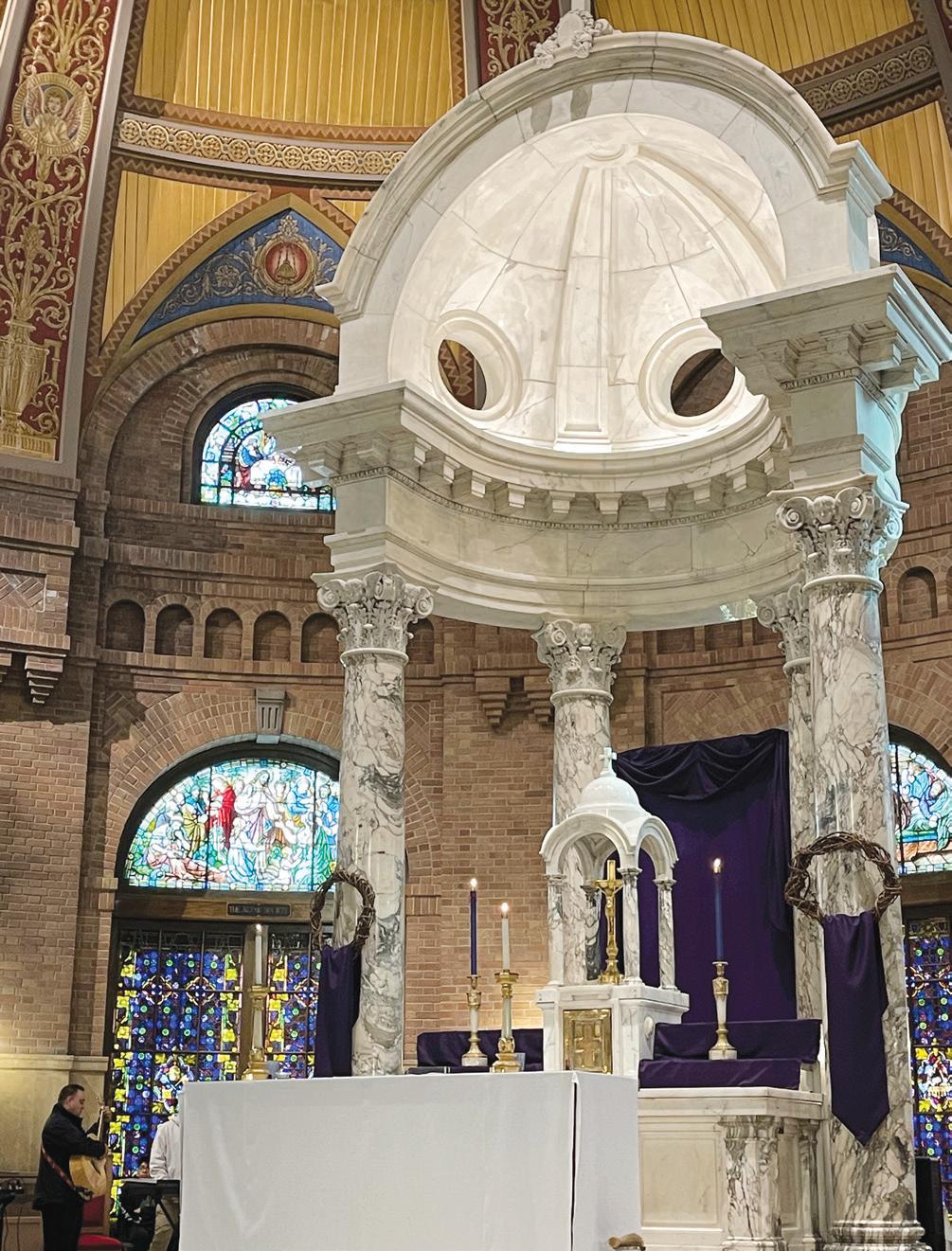
The parish was in the middle of a large capital campaign to repair the roof at the time of the fire. The main section of the roof was finished but winter arrived before the lower pitches over the side altars could be completed, Pangle said. “So, when the fire burned through the roof, many parishioners were afraid that all the work that had been completed was for naught,” he said. But “miraculously,” the fire did not touch any recently completed repairs, he said.
Masses moved to the church basement April 3 after water damage was repaired. The first Mass back inside the church — with a relatively small number of pews — was held the weekend of Oct. 1 and 2. By the second week of October, Masses were held with enough seating for all, which then made it feel whole again, Pangle said.
A nine-minute video, including the song “We Shall Overcome” was posted on the parish website, highlighting key steps in cleaning, repairing and restoring the damaged church.
An overcoat was applied to protect the wood for another century or more, Father McDonough said in the video. A protective layer over the stained glass was removed, the windows were cleaned and new protective covering was installed. The floors were redone, the ceiling was repainted, stained and sealed and the pews were repaired, some fire-damaged, some not.
Charlie Epple, 87, said he was married at Incarnation and has been a parishioner for more than 60 years. “It’s great” how the workers “cleaned and fixed everything” and that the parish had a “nice plan B” for holding Masses during the renovations, he said. “People are coming back,” Epple said. “They’re excited to see, curious to see how it was going to turn out. But they did a wonderful job. The spirit is still here.”
Isabel Hidalgo, 48, her husband, Reynaldo, 47, and their children, are very involved in the parish, including two sons in the choir, said Gretchen Valdez, parish volunteer and wife of Deacon Carl Valdez, who serves the parish. With Deacon Valdez translating, Isabel said she was “really sad” when the church was damaged. Incarnation has been her parish for a long time, and she feels close to many people, including the deacon and his wife, she said.
Now, Isabel said, she is glad, because “thanks to many generous people, the church is ready.”
To hear about and see the work inside the church that took place after the fire, view the video at incarnationmpls org; select “Restoration.”
The church fire at Incarnation didn’t affect the parish food center, except for discarding some food in a back room damaged by smoke and ashes, said Chris Pangle, development assistant at the Minneapolis parish.
Pangle also co-manages the food center, Harvest from the Heart (Cosecha del Corazón). “We were open the next day,” he said. Previously housed in the rectory basement, it is now in a converted four-car garage behind the rectory. Glass-fronted refrigerators and freezers line two walls. One row of racking holds fresh produce, and another along the back wall contains bread, sweets and shelf-stable items. Down the middle are pallets of bulk food. Available food varies daily, as it is supplied from donors. Families can use one of six shopping carts while choosing food items. There is no cost to shoppers.
The parish has run a food shelf since 1984, when it served about 120 families a month. Today it serves about double that in one day, Pangle said.
Three staff members and “a litany of volunteers” are involved with its operation, he said, and demand continues to grow. It is open five days a week.
In 2022, about 6,000 “unique families” visited Incarnation’s food shelf, with a total of 24,083 visits by families. The food shelf distributed 889,984 pounds of food last year. By December 2022, numbers reached 3,150 visits by families per month. At that pace, the food center would serve families during 37,800 visits over 12 months.
In January 2023, 73% of families were Spanish speaking, a little higher than the parish’s percentage of Spanish speakers, Pangle said. The food shelf draws from a larger base than parish families, he said. Parish affiliation is not asked of food shelf visitors, but zip code and income level are.
Behind the scenes, volunteers in “food rescue” are out every day picking up food at locations including Costco, Cub, Jerry’s, Target and Trader Joe’s. Pickups at Kowalski’s happen three times a week. Once a week, a volunteer drives to Prescott, Wisconsin, to United Natural Foods. The list expands in spring and summer, when local growers donate surplus food.
Pangle used to work in “food rescue,” so he didn’t see families’ reactions to receiving the free food. It was harder to feel like he was making a difference, he said. But at the food center, Pangle said, he sees “many happy, emotional responses” when visitors “can choose whatever food they want and go home with it. It’s not uncommon that people cry and tell you how much it changes everything,” he said.
For information on the food center (in English and Spanish), visit harvestfromtheheart org
— Barb Umberger
MARCH 9, 2023 LOCAL THE CATHOLIC SPIRIT • 7
Father Martin: ‘Scripture scholar,’ talented organist, composer
By Barb Umberger The Catholic Spirit
Father William “Bill” Martin hired Denny Farrell in 2007 as parish administrator at Guardian Angels in Oakdale — nine years after the priest joined the parish. A strong friendship formed and, even after Father Martin was reassigned and later retired, Farrell kept in close touch.
In fact, Farrell was at his friend’s bedside when Father Martin, 74, died Feb. 24 at the assisted living Little Sisters of the Poor’s Holy Family Residence in St. Paul, which Farrell described as “a beautiful place for him to be.”

“We’re very blessed he was able to be there for almost five years,” Farrell said.
Following his ordination June 3, 1978, Father Martin served as pastor of St. Margaret in Minneapolis from 1978 to 1980, assistant priest at Christ the King in Minneapolis from 1980 to 1986, pastor of St. Mary in Waverly from 1986 to 1998, pastor of Guardian Angels from 1998 to 2011, and pastor of St. Richard in Richfield from 2011 until his retirement Nov. 28, 2013.
Farrell, 78, described Father Martin as an accomplished organist. “He had a beautiful voice where he would literally sing the whole Mass at times,” he said.
Father Martin composed organ music, sacred organ music, “and he played like you never heard anybody else (do),” Farrell said. Organ music was part of who Father Martin was, he said. He recalled the electronic organ that mimicked a pipe organ Father Martin purchased while at Guardian Angels. “Boy, he could make that thing talk,” Farrell said. Father Martin often played it on Friday afternoons and Saturday mornings, filling the church with organ music. Farrell said that was a spiritual time for the priest.
Father Martin will be remembered for his love of music and his love for dogs, Farrell said, including a St. Bernard named Kris Kringle he had while at Guardian Angels. When he left St. Richard in 2013, parishioners gave Father Martin a rescue dog he named Richie.
Before Father Martin left Guardian Angels for his next assignment, parishioners donated money to send
him and his mother on a two-week trip to the Holy Land, a long-time dream for Father Martin. “He was such a Scripture scholar,” Farrell said, “and you would have thought we had given him $10 million.”
Father Martin was legally blind “for probably 30 years,” said Farrell, which meant later in his life, he could no longer say Mass. Farrell said he believes
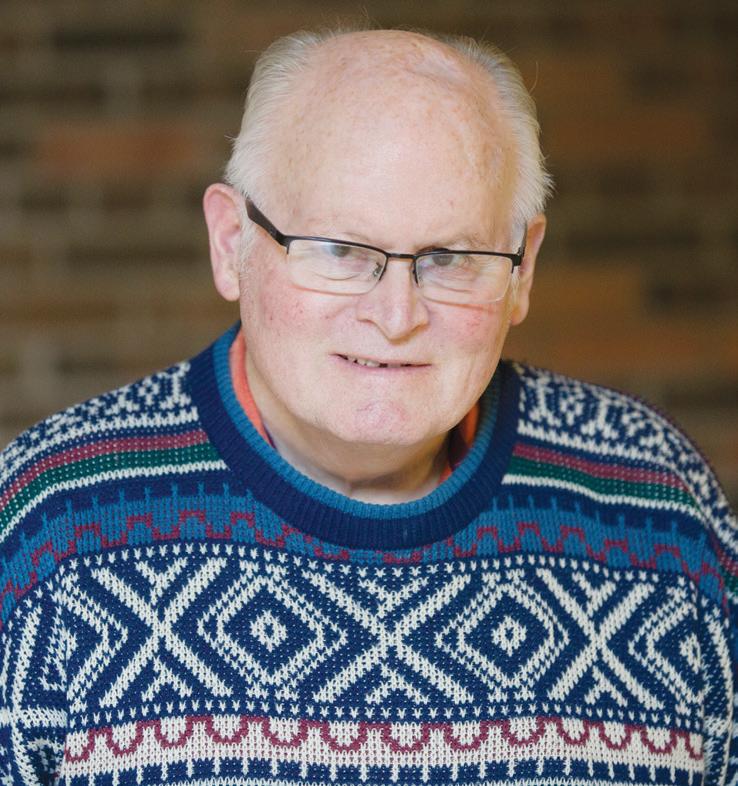
Father Martin “kind of died of a broken heart, too” because he could no longer “do all of his priestly duties.” “He told me, ‘This is why I’m on this earth and I can’t say Mass,’ which was extremely frustrating for him.”
So, Farrell talked with the sisters about having Father Martin provide reconciliation or anointing of the sick or be there when a resident wanted to talk with a priest.

Father Roger Baumann, now retired, succeeded Father Martin at Guardian Angels. He observed and heard from parish staff members that Father Martin was “a very collaborative kind of pastor.” “I think he respected the gifts and the talents that … staff members brought to their ministries,” Father Baumann said.
Father Baumann also was struck by Father Martin’s intellect, “his great love for the liturgy and a great knowledge for the liturgical life of the Church.”
Father Baumann served as homilist at the funeral Mass celebrated by Archbishop Bernard Hebda March 7 at Guardian Angels. Farrell delivered the eulogy.
Two St. Thomas Academy graduates allege misconduct
By Rebecca Omastiak The Catholic Spirit
Two recent graduates of St. Thomas Academy in Mendota Heights — and members of their families — have filed civil lawsuits against the school, alleging they were harmed by the school’s culture and student misconduct.
The academy was founded by Archbishop John Ireland and is the
only all-male Catholic school within the Archdiocese of St. Paul and Minneapolis. The graduates involved in the lawsuits were students at the school from 2018 to 2022, according to two separate lawsuits.
In a letter sent to the St. Thomas Academy community, Headmaster Kelby Woodard wrote that those who filed the two lawsuits “assert that our culture encourages poor student behavior” but “we strongly disagree with this assertion and will vigorously defend our character development program.”
The lawsuits both pointed to experiences that the former students allegedly had during interviews to determine the Cadet of the Quarter award, one in November 2020 and the other in January 2021. One of the lawsuits alleges that the student involved had voiced his discomfort with the interview process but did not feel he could report it beyond speaking up. The other student separately said
that he feared he would not advance if he reported the alleged misconduct. Both said there was no adult supervision during these interviews.
In the letter to the STA community, Woodard states that the families of the plaintiffs “did not notify the Academy of the alleged incidents until November of 2021, following an unrelated disciplinary action involving their sons.” Upon learning of the alleged misconduct, the school’s board of trustees hired outside counsel and organized an internal team “to conduct a thorough investigation into the allegations and a review of our character development program.” Through that process, Woodard wrote, both families were provided with “a confidential means to report critical details of the alleged incident, including the identity of the students who initiated the alleged misconduct.” Woodard wrote, “the families chose not to provide those details, stating only that these students had already
graduated.” The investigation continued for five months, Woodard wrote, and included student, parent, faculty and staff interviews.
“Ultimately, the investigation found insufficient evidence to validate the claims against the Academy. Further, the review did not find substantive or systemic deficiencies in our character development program. As with any investigation, thoughtful recommendations for improvement emerged, which have been implemented,” Woodard wrote.
The families of the two alumni are seeking damages of at least $50,000 and are requesting the judge overseeing the case order the school to implement additional training, coaching and reporting structures.
During a separate Jan. 17 interview with The Catholic Spirit, Woodard said he is pursuing a new role and that this school year will be his final year as headmaster of St. Thomas Academy.
Look for The Catholic Spirit advertising insert from CROSS CATHOLIC OUTREACH in all copies of this issue. N O T I C E 4 Monday Nights March 6 March 20 ** April 3 April 17 ** Mass at 6pm for St Joseph Feast instead of Holy Hour ** Fight the Good Fight MEN’S MONDAYS @ Blsd Solanus Friary 1101 Desoto Saint Paul, MN 6:00-8:00 PM • Holy Hour with Vespers** • Talk/Refreshments • Night Prayer Free to come and go as needed. Ages 18-40 discerning Brotherhood /Priesthood. www.BrothersOfPeace.org
8 • THE CATHOLIC SPIRIT LOCAL MARCH 9, 2023
FATHER WILLIAM MARTIN
Experts: Ukraine’s healing needs justice, repentance and decades of effort
By Gina Christian OSV News


Healing the wounds of Russia’s full-scale invasion of Ukraine requires decades of effort and a willingness to face human suffering at a staggering scale, said experts at a Feb. 23 panel discussion hosted by the Lumen Christi Institute at the University of Chicago.
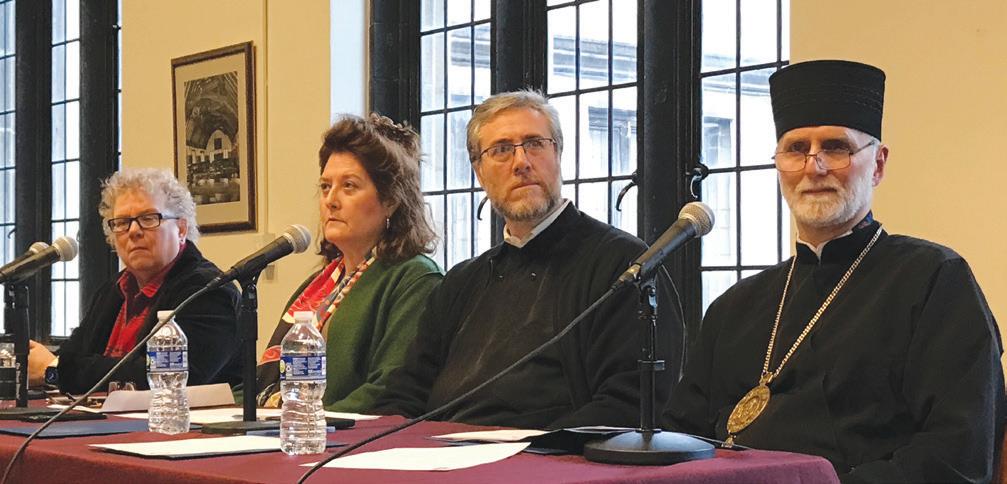
Any theology of healing for Ukraine must first begin not with a point but a “person of departure,” explained Metropolitan Archbishop Borys Gudziak of the Ukrainian Archeparchy of Philadelphia, head of Ukrainian Catholics in the U.S.
“The question for Jesus was seeing the concrete reality. Pope Francis has been summoning Catholics for the last 10 years to not be abstract, but to see the suffering of the poor and the marginalized,” said the archbishop. Citing the parable of the Good Samaritan (Lk 10:29-37), Archbishop Gudziak likened Ukraine — whose people have endured “one genocidal wave after another” throughout the centuries — to “the wounded victim over whom we stand today.”
Repeated repressions, mass starvations and executions, particularly during the 20th century under both Soviet and Nazi regimes, killed millions of Ukrainians, explained the archbishop.
After declaring independence from the former Soviet Union in 1991, Ukraine, which at the time possessed the world’s third-largest nuclear arsenal, “not only wanted peace, (but) made itself completely vulnerable for peace,” Archbishop Gudziak said.
Ukraine then signed the 1994 Budapest Memorandum, according to which the U.S., the United Kingdom and the Russian Federation promised Ukraine security assurances in return for relinquishing its
HEADLINES
u�Bishop, cardinal spar in the media over the Eucharist, ‘radical inclusion’ and ‘heresy.’
Two U.S. prelates have recently traded what one called some “strong words” in the Catholic press, debating the reception of holy Communion, sexual sin, pastoral outreach to marginalized Catholics, and heresy among Church leadership. At issue is the tension between offering pastoral welcome and inclusion without compromising Church doctrine, especially regarding the Eucharist. In two essays published by America Magazine, San Diego Cardinal Robert McElroy has called for “radical inclusion” of divorced and remarried and LGBTQ Catholics in the Eucharist. “(T)he Eucharist is given to us as a profound grace in our conversion to
nuclear weapons. Two decades later, Russia violated the agreement by invading Ukraine’s Crimea region while backing separatist factions in the Donetsk and Luhansk provinces. From 2014 to 2021, some 14,400 Ukrainians were killed and 39,000 injured in Russian attacks, according to the United Nations Office of the High Commissioner for Human Rights.

Since the February 2022 invasion, more than 8,000 Ukrainian civilians have been killed and more than 13,200 injured. Officially 13,000 Ukrainian soldiers have been killed, according to Ukraine’s government, although the actual number is likely much higher. More than 8 million refugees have been recorded across Europe, with 4.85 million registered for some form of temporary protection, according to the U.N. High Commissioner for Refugees.
More than 16,200 Ukrainian children have been abducted by Russia, according to Ukraine’s government.
discipleship,” the cardinal said, adding “to bar disciples from that grace blocks one of the principal pathways Christ has given to them to reform their lives and accept the Gospel ever more fully.” Springfield Bishop Thomas Paprocki, writing in First Things, said “contemporary ecclesiastical politeness” has compromised an awareness of the dangers of heresy, while shortchanging the true message of Christ. While merciful with human frailty, Christ “makes very clear what it means to be his disciple,” the bishop told OSV News. “Our Lord says, ‘Come and follow me,’ but that invitation is not on our terms but his. He loves us as we are, but he calls us to conversion, repentance and something greater.”
With some 66,000 war crimes reported — including rape, torture and summary executions — Ukraine has filed charges of genocide by Russia with the International Court of Justice.
Deacon Perry Hamalis, a Greek Orthodox deacon and professor of religion at North Central College, noted that Russia, unlike Germany, has never fully reckoned with the atrocities of its totalitarian past, let alone its present. In December 2021, Russia’s Supreme Court ordered the closure of Memorial International, which had spent three decades documenting Soviet crimes.
An admission of responsibility must include “not simply the need for war crimes trials, which are absolutely necessary in the post-bellum context,” Deacon Hamalis said. There must also be “authentic repentance” that recognizes the imperialist concept of “Russkiy mir” (“Russian world”) — invoked by Russian President Vladimir Putin to justify aggression against Ukraine — is “an ideology, not a theology” that has “deeply destroyed” the ecclesiology of the Russian Orthodox Church, said Deacon Hamalis.
The damage within the Orthodox Church has extended well beyond Russia’s borders, said Gayle Woloschak, president of the Orthodox Christian Association of Medicine, Psychology and Religion, who said the conflict “has split the Orthodox Church in the U.S. very strongly and has been very hurtful.”
Elizabeth Prodromou, visiting scholar in the International Studies Program at Boston College and nonresident senior fellow at the Atlantic Council’s Eurasia Center, suggested that churches must “look to the Gospels … to the language, resources and teachings of the church to find different kinds of terms” — such as “love, peace, justice, judgment, mercy, forgiveness and repentance” — to advance the healing process.
u�U.S. Supreme Court to consider whether employers can make Christians work Sunday.



The U.S. Supreme Court is scheduled to consider a case April 18 that could have broad implications for employees seeking religious accommodations from their employers. The high court is scheduled to hear oral arguments in Groff v. DeJoy, a case concerning Gerald Groff, an evangelical Christian and former U.S. Postal Service worker, who was denied an accommodation to observe his Sunday Sabbath by not taking Sunday shifts. Federal law prohibits employers from firing workers who request religious accommodations unless the worker’s religious practice cannot be “reasonably” accommodated without “undue hardship.”
uIn Canada, opposition mounts to Medical Assistance in Dying expansion. Legislation to delay by a year broadening Medical Assistance in Dying eligibility to individuals solely afflicted with a mental illness is forging ahead. Bill C-39 passed the House of Commons Feb. 15, and one day later it was read in the Senate chambers. But polling data released jointly by the Angus Reid Institute and the nonpartisan think tank Cardus two days before the vote shows Canadians have trepidations. Among the 1,816 Canadians surveyed, only 31% support medical assistance in dying for those with a mental illness, 51% of participants opposed the notion and 18% responded “not sure/can’t say.”
— OSV News

MARCH 9, 2023 THE CATHOLIC SPIRIT • 9 NATION+WORLD Our website lists our WEEKEND PREACHED RETREATS and 5DAY & 8DAY DIRECTED RETREATS 24/7 Online Registration 2023 Retreats Available 4800 Fahrnwald Road, Oshkosh, WI 54902 | 920-231-9060 office@jesuitretreathouse.org | jesuitretreathouse.org Ad Majorem Dei Gloriam “For e Greater Glory of God” “Come away by yourselves to a quiet place and rest a while.” - Mk 6:31
LAURA LERACI | OSV NEWS
Gayle E. Woloschak, left, Elizabeth Prodromou, Deacon Perry Hamalis and Metropolitan Archbishop Borys Gudziak of the Ukrainian Catholic Archeparchy of Philadelphia discuss Ukraine in a panel discussion at the University of Chicago Feb. 23.
Cross Catholic Outreach’s Installation of Safe Water Wells Transforms Lives
Serving the poor in developing countries is often a challenge because locations are remote, access to electricity is unreliable, and modern systems are usually too complicated to provide practical solutions for the problems families are facing. Because of this, the missionary priests and religious sisters serving in these difficult conditions often turn ‘to old-fashioned methods’ in achieving their goals.
“Sometimes, relying on old ways
of doing things is best,” admitted Jim Cavnar, CEO of Cross Catholic Outreach, a respected and successful Catholic ministry founded to serve the poor around the world. Very often, Cavnar’s team works with Catholic ministries located so far from modern conveniences that age-old solutions must be used to overcome the challenges faced by struggling families and the ministries that serve them.
For example, Cavnar’s preferred solution for supplying safe water in a remote African village is to install a traditional deep water well with a simple, manual hand pump.
This idea of tapping an underground source to supply families with clean water is nothing new. Jesus Christ’s encounter with the woman at the well is a case in point, and productive wells are
mentioned in the Old Testament too. Much has changed since biblical times. Yet, in the world’s developing countries, accessing safe water has remained an ongoing struggle, and installing simple wells continues to be an excellent way to achieve successful results.
“Our ministry was founded to support Church-based efforts to benefit the poor, and we are often asked to
Cross Catholic Outreach’s U.S. benefactors have made a huge difference in the lives of poor Haitian families by installing simple wells with sturdy, reliable hand pumps. It’s an old-fashioned but cost-effective solution that produces incredible results.
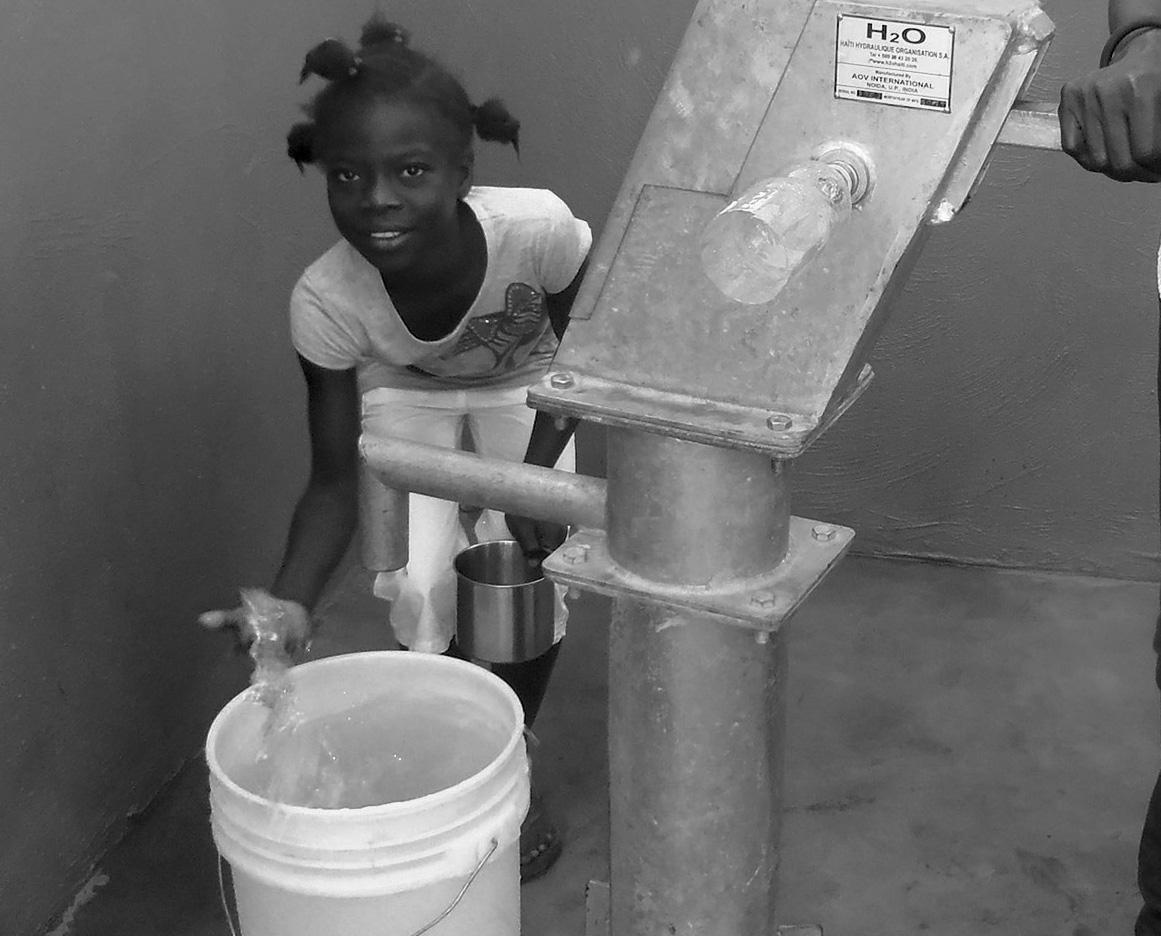
said. “Fortunately, our in-country partner there — the Kobonal Haiti Mission — is perfectly positioned to lead the water projects we have planned for that area.” (See the related story on the opposite page.)
serve a community for decades and bless generations to come.
help provide clean water sources,” Cavnar said. “It’s a godsend to families that have had to travel long distances to find water — especially since many of the streams and ponds they draw their water from are also used by animals and are often filled with bacteria and parasites.”
Cavnar is familiar with the value of quality wells because his ministry has funded the construction of many water systems around the world.
“One of the big projects we have going on now is focused on the Central Plateau of Haiti, an area where water scarcity and contamination have become serious problems,” Cavnar
Once a specific community has been identified and its needs assessed, the mission brings in heavy machinery to drill the well. Since some areas of the world suffer from regular droughts that can lower the water table, determining whether to drill based on the depth of the well becomes a critical decision too.

“In some cases, we’ve had to drill down 200 meters or more to ensure we reach a plentiful source of water,” Cavnar explained.
After the well shaft is encased in a special tubing to preserve its strength and purity, pump tests are run to ensure that there is enough water for the community, and water quality is checked to make sure the water is safe for people and animals.
With proper maintenance, simple wells and hand pumps like these can
“There’s a lot of excitement on the day a new well is blessed and dedicated to God,” Cavnar said. “It is a deeply moving experience, and we often share those stories with our U.S. donors who helped fund the work. In fact, Catholics here in the United States play a critical role in this effort. If it weren’t for them, we would never be able to provide this safe water to families in need.”
Readers interested in supporting Cross Catholic Outreach’s water projects and other ministries to the poor can contribute to the ministry by using the brochure inserted in this issue or by sending a tax-deductible gift to Cross Catholic Outreach, Dept. AC02407, PO Box 97168, Washington, DC 20090-7168. The ministry has a special need for partners willing to make gifts on a monthly basis. Use the inserted brochure to become a Mission Partner, or write “Monthly Mission Partner” on mailed checks to be contacted about setting up those arrangements.
Cross Catholic Outreach Endorsed by More Than 115 Bishops, Archbishops
Cross Catholic Outreach’s range of relief work to help the poor overseas continues to be recognized by a growing number of Catholic leaders in the U.S. and abroad.
“We’ve received more than 115 endorsements from bishops and archbishops,” explained Jim Cavnar, CEO of Cross Catholic Outreach. “They’re moved by the fact that we’ve launched outreaches in almost 40 countries and have undertaken a variety of projects — everything from feeding the hungry and housing the homeless to supplying safe water and
supporting educational opportunities for the poorest of the poor. The bishops have also been impressed by Cross Catholic Outreach’s direct and meaningful response to emergency situations, most recently by providing food, medicines and other resources to partners in Haiti, El Salvador and areas of Belize impacted by natural disasters.”
Archbishop Thomas Rodi of Mobile, Alabama, supports this mission, writing, “It is a privilege for me to support Cross Catholic Outreach. This organization funds ministries to our
neighbors in need in Africa, Asia, Central and South America, and the Pacific. Through the generosity of so many, the love of God is made visible to many who are coping with the most difficult of daily living conditions.”
In addition, many of the bishops and archbishops are encouraged that Pontifical canonical status was conferred on Cross Catholic Outreach in September 2015, granting it approval as an official Catholic organization. This allows the ministry to participate in the mission of the Church and to give concrete witness to
Gospel charity.
“Your work with the Dicastery for Promoting Integral Human Development is a strong endorsement of your partnership with the work of the Universal Church,” Archbishop Salvatore Cordileone of San Francisco said. “By providing hope to the faithful overseas by feeding the hungry, clothing the naked, delivering medical relief to the sick and shelter to the homeless, and through self-help projects, you are embodying the Papal Encyclical Deus Caritas Est .”
10 • THE CATHOLIC SPIRIT MARCH 9, 2023 LEFT PAGE PAID ADVERTISEMENT
“There’s a lot of excitement on the day a new well is blessed and dedicated to God.”
Jim Cavnar, CEO of Cross Catholic Outreach
Priest Renews His Commitment to Supply Safe Water to Haiti’s Poor — and Turns to U.S. Catholics for Support
Believing God has called him to be a source of love and hope to the poorest families in Haiti, Father Glenn Meaux is turning to U.S. Catholics for help in accomplishing his latest mission of mercy — an ambitious plan to provide safe water to those in greatest need.
To understand the passion and commitment of this dedicated missionary priest, it is essential to travel back to 1989, the year he arrived in Haiti’s Central Plateau and discovered the hardships families faced in the destitute village of Kobonal.

“There was no agriculture, there was no irrigation system, there was literally no hope at the time,” Fr. Meaux recalled.
To say he and his missionary team were deeply disturbed by the magnitude of the poverty in Kobonal would be an understatement. Hardly anyone in the village owned the land their fragile huts occupied. No one grew gardens or raised animals, and very few employment opportunities existed for the uneducated population, so very few families were able to earn enough money to buy food on a regular basis.
While all of these challenges were heartbreaking, Fr. Meaux immediately recognized that there was an even greater risk to local families — a lack of safe drinking water.
He noticed that women and children were gathering water from streams and rivers and that the water they collected was obviously tainted. During the dry season, the situation became even worse. People resorted to digging holes
Unsafe water is a leading cause of death among Haiti’s rural poor, and Fr. Meaux believes God is calling on his mission — and Catholics in the U.S. — to bring relief to the many families who drink from these contaminated sources.

in dry riverbeds, and what seeped up was murky and unsanitary.
While Fr. Meaux has found ways to improve the situation over the years, his heart still breaks every time he discovers a mother or child living in a dilapidated shack and gathering water from a contaminated stream. When that happens, he turns to Cross Catholic Outreach and compassionate Catholics in the U.S. for help in solving the area’s water challenges.
“Fr. Meaux has already given years of his life to serving the people of Haiti, but he always has his eyes forward, looking for the next thing he can do to help relieve the people’s suffering and increase their opportunities in the world,” explained Jim Cavnar, CEO of Cross Catholic Outreach, a leading Catholic relief and development ministry supporting Catholic missions in Haiti and around the globe. “We have partnered with Fr. Meaux for more than a decade and a half because we believe in his visionary goals for Haiti. He wants to address the people’s most urgent needs, but his ultimate goal is to break the cycle of poverty in this part of Haiti forever.
”Fr. Meaux describes this vision and his objectives in an even more direct way.“As Catholics, we must extend our hands to help our brothers and sisters in need,” he said.
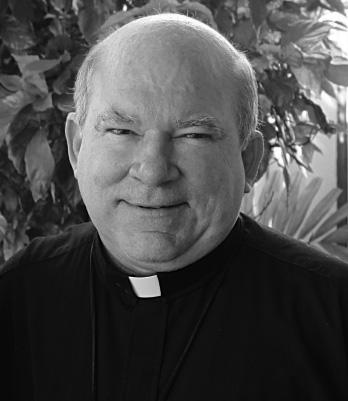
This year, Fr. Meaux aims to bring safe, abundant water to even more
families living in and around Kobonal. The success of this project will end the collection of unsafe water from remote sources, benefiting both the health and well-being of local families.
“At Cross Catholic Outreach, we work on many projects like this, obtaining donations from U.S. Catholics to pay for the equipment and organize the construction efforts involved,” Cavnar explained. “Our current goal is to help Fr. Meaux install six new community water systems and repair five existing wells, so more than 2,000 children and adults in the Kobonal area will have access to an abundant supply of clean water.”
According to Cavnar, the new wells will have hand pumps and a cement wall for security and will open during set hours of the day. These measures will ensure that the well stations are safe
How to Help
and easy to use for all. Next, community members will receive training in proper sanitation and hygiene practices and will learn how to maintain the wells, ensuring well stations are operational for generations to come.
Families will be able to use the water for drinking and cooking and also to sustain the important gardens they rely on for food and income.
“Anticipation is mounting for this project, and volunteers have already stepped forward to offer their help with the construction of the wells. Now, all that’s needed are the funds for drilling, purchasing pumps, constructing a pump house to store supplies, and training community members to handle maintenance of the new facilities,” Cavnar said. “Our goal now is to make American Catholics aware of the project and gain their support.”
To fund Cross Catholic Outreach’s effort to help the poor worldwide, use the postage-paid brochure inserted in this newspaper or mail your gift to Cross Catholic Outreach, Dept. AC02407, PO Box 97168, Washington, DC 20090-7168. The brochure also includes instructions on becoming a Mission Partner and making a
donation to this cause.
MARCH 9, 2023 THE CATHOLIC SPIRIT • 11 PAID ADVERTISEMENT
monthly
If you identify a specific aid project with your gift, 100% of the proceeds will be restricted to be used for that specific project. However, if more is raised for the project than needed, funds will be redirected to other urgent needs in the ministry. RIGHT PAGE
regular
“As Catholics, we must extend our hands to help our brothers and sisters in need.”
Fr. Glenn Meaux Kobonal Haiti Mission
10 years as pope: Pushing the Church to bring the Gospel
By Cindy Wooden Catholic News Service
For a decade, even when discussing the internal workings of the Vatican, Pope Francis has insisted the Church is not the Church of Christ if it does not reach out, share the “joy of the Gospel” and place the poor at the center of its attention.
Signals that his papacy would be different started the moment he stepped out on the balcony of St. Peter’s Basilica the evening of March 13, 2013: He was not wearing a red, ermine-trimmed cape, and he bowed as he asked the crowd to pray that God would bless him.
His decision not to live in the Apostolic Palace, his invitations to Vatican trash collectors and gardeners and other employees to join him for his daily morning Mass, his insistence on going to the Italian island of Lampedusa to celebrate Mass and pray for migrants who had drowned in the Mediterranean captivated the attention of the media.
But not everyone was pleased with the seeming ease with which he set aside pomp and protocol. And tensions within the Catholic community grew as he expressed openness to LGBTQ Catholics, to those living in what the Church considers irregular marriage situations and when he said in an interview in 2013 that the Church cannot talk only about abortion, gay marriage and contraception.
One kind of summary of his first 10 years as pope can be found in numbers: He has made 40 trips abroad, visiting 60 countries; in eight consistories, he created 95 cardinals under the age of 80 and eligible to vote in a conclave for the next pope. He has presided over the canonizations of 911 new saints, including a group of more than 800 martyrs, but also Sts. John Paul II, John XXIII and Paul VI.
In his first major document, the apostolic exhortation “The Joy of the Gospel,” he laid out a program for his papacy, looking inside the Church and outside at the world to see what needed to be done to “encourage and guide the whole Church in a new phase of evangelization, one marked by enthusiasm and vitality.”
The document included a discussion of the need to reform Church institutions to highlight their missionary role; to encourage pastoral workers to listen to, and stand with, the people they were ministering to — his famous line about having “the smell of the sheep”; to deepen an understanding of the Church as “the entire people of God” and not as an institution or, worse, a club of the elect; to integrate the poor into the Church and society, rather than simply see them as objects of assistance; and to promote peace and dialogue.
For Canadian Cardinal Michael Czerny, prefect of the Dicastery for Promoting Integral Human Development, the agenda of Pope
Francis is the original agenda of the Second Vatican Council.
Unlike St. John Paul II and the late Pope Benedict XVI, Pope Francis did not attend any of the council sessions. And, in fact, because he was ordained to the priesthood Dec. 13, 1969, he is the first pope to be ordained a priest after Vatican II.
“After Scripture and tradition, the council is the significant foundation, and I would say, characteristic orientation of this papacy,” the cardinal told Catholic News Service. “He has taken the council not from a collection of decrees, but from the lived experience of the council as implemented, as lived, as tested, as
developed, you might say, in the Church St. John XXIII launched the council it means to be the Church in the modern said. The papacies of St. John Paul “reverted to a more doctrinal understanding “some very good results and with business.”
While the work of Pope Francis’ said, “I don’t think it picked up the which was implementing a new understanding
Latin American Church leaders reflect on Pope Francis’ teachings
By Lucien Chauvin OSV News
Pope Francis’ teachings are generating a new buzz in Latin America as the region gears up to celebrate the 10th anniversary of the election of one of its own as bishop of Rome and leader of the world’s more than 1.3 billion Catholics.
While the pope has changed the global Church, the impact is palpable in Latin America, where Catholics throughout the region will commemorate his election March 13, 2013, by shining a light on his teachings, from his focus on the Amazon to the sweeping synodal process.
“We are celebrating 10 years of a decision that has changed the Church and given the world an Argentine who is pope of all people,” Father Máximo Jurcinovic, spokesman for the Argentine Conference of Bishops, told OSV News.
“The teachings of Francis are transforming the spirit of the Church in our region. The greatest gift is reading his teaching,” he said.
Pope Francis was born Jorge Mario Bergoglio in Buenos Aires, Argentina, in 1936 and was archbishop of the capital for 15 years before being elected pope. While not the first non-European pope (there have been popes from Bethlehem, Syria and modern-day Libya before), he is the first from Latin America — home to an estimated 40% of the world’s Catholics — and the first Jesuit.
In his native Argentina, the weeklong celebration of the 10th anniversary of his election will center on numerous aspects of the pope’s first 10 years, but the central day will include an interreligious celebration with the leaders of different religions in the country.
“Ecumenism was a key element of Francis’ tenure as archbishop and has continued into this papacy,” Father Jurcinovic said. He added that this was clearly seen when the pope traveled to South Sudan in early February with leaders of the Church of England and the Church of Scotland.
“The closeness and communion with sister churches is one of the things that has distinguished his papacy. This was expressed in ‘Fratelli Tutti’ and was in plain sight during his recent visit to Africa. It is dialogue in the service of peace,” Father Jurcinovic told OSV News.
For Peruvian Cardinal Pedro Barreto Jimeno of Huancayo, a Jesuit like Francis, the pope’s focus on the earth, especially the Amazon, and Indigenous peoples are two defining characteristics of his first decade leading the Church.
“I think the backbone of his papacy is with the poorest and those on the periphery. These first 10 years of Francis can be summarized in the four dreams about the Amazon in his post synod commentary,” Cardinal Barreto told OSV News.
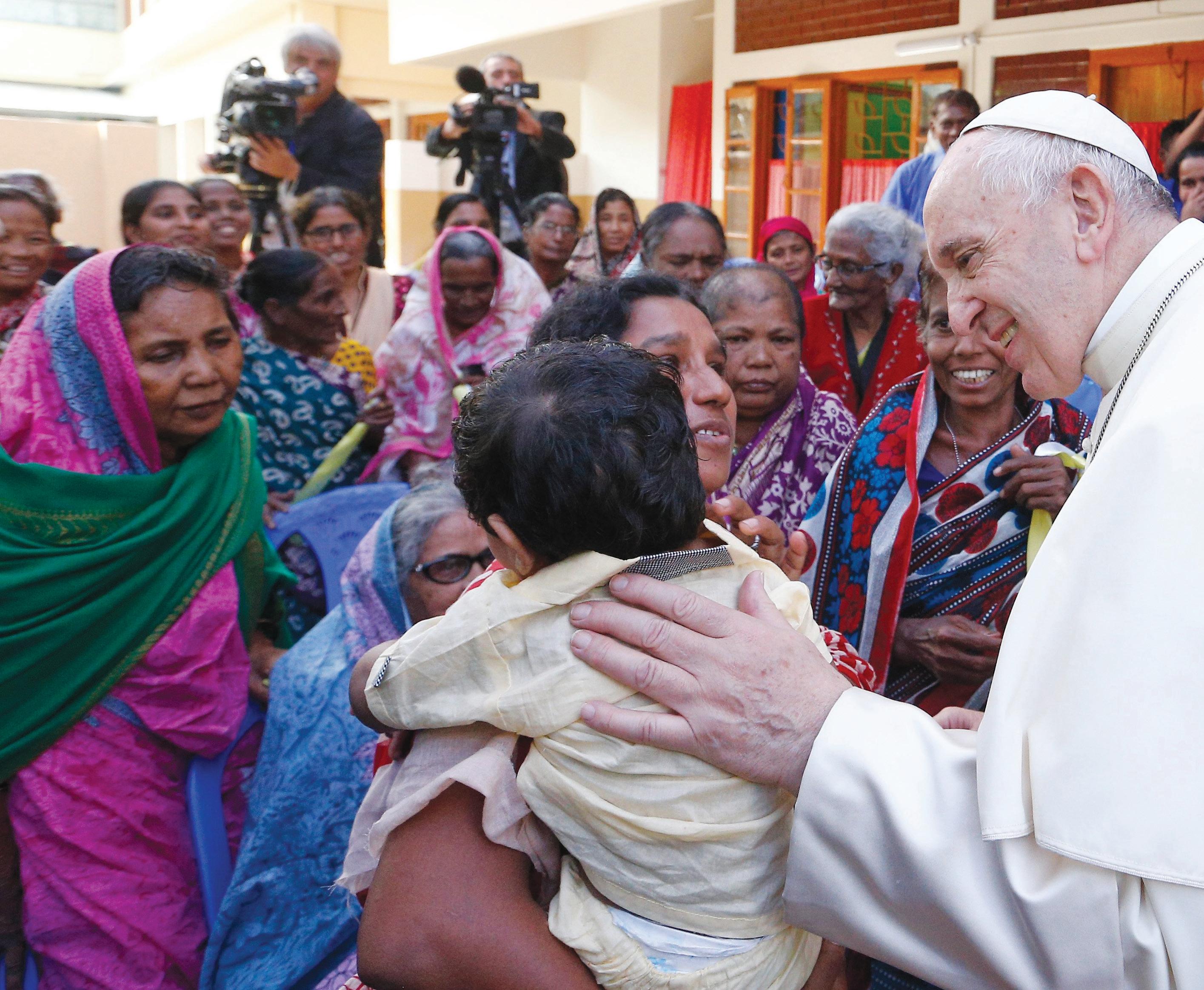
The four dreams are listed in “Querida Amazonia,” an apostolic exhortation released by the pope following the October 2019 Synod of Bishops of the Amazon Region.
Cardinal Barreto said that while the pope refers to the Amazon, the dreams about the rights of the poor, preservation of cultural riches and nature, as well as Christian communities capable of
commitment, are universal and guiding the world.
He said that the pope’s journey is the calls of the Brazilian bishops during council (CELAM) Brazil, in 2007, continued 2015 “Laudato visit to the Amazon Synod creation of Amazon Region “The Ecclesial practice what over the decades. an ecclesial and recognized cardinal said.
Bishop Miguel vicar of Iquitos News that synodality “Synodality
and I think it is right on the mark. listen to each other and discern what something necessary for the Church Cadenas said.
Bishop Cadenas, an Augustinian, process that began in 2021 and will should lead to a Church with a renewed
12 • MARCH 9, 2023 POPEFRANCIS
Pope Francis greets people as he visits the Mother Teresa House in the Tejgaon neighborhood in Dhaka, Bangladesh, Dec. 2, 2017.
We are celebrating 10 years of a decision that has changed the Church and given the world an Argentine who is pope of all people.
Father Máximo Jurcinovic
Gospel to the world
say or an important value they hold dear that is being overlooked.
Cardinal Joseph Tobin of Newark, New Jersey, told CNS he believes the first 10 years of Pope Francis’ pontificate have been preparation for “what’s happening right now, and that’s the synodal conversation.”
The Second Vatican Council called Catholics to read the “signs of the times” and respond. And, the cardinal said, “this notion that we don’t have automatically prepared prescriptions for every challenge that faces us leads us to a fundamental tenet of our belief,” which is belief “in the Holy Spirit, the lord and giver of life.”
The synod process, which began with listening to people around the globe and will move toward two assemblies mainly of bishops, is about listening to the Holy Spirit.
While the synod involves meetings, Cardinal Tobin said, “synodality is a way of being Church. It’s an ancient way of being Church that is being recovered and lived in the circumstances in which we face ourselves today. And so, to my mind, that’s sort of the capstone of what Pope Francis has been working for over the last decade.”
“I’ve called synodality his long game,” the cardinal said. “He’s convinced that the changed circumstances of our world and our world going forward demand a new appreciation for the role of the Holy Spirit and a way to access that gift that is given to all of us by virtue of our baptism.”
Church of Latin America.” council with a pastoral focus on what modern world, Cardinal Czerny and Pope Benedict, he said, understanding of the council” with some massive, unfinished predecessors was important, he the primary agenda (of the council), understanding of Church in the
modern world, a new way of evangelizing because the world is so different from how it was, let’s say, at the end of World War II.”
Emilce Cuda, an Argentine theologian and secretary of the Pontifical Commission for Latin America, agreed that key to understanding Pope Francis’ pontificate is knowing how Vatican II was lived in Latin America with respect for popular piety and culture, and trust in the “sensus fidei,” the notion that the baptized together have a “sense of faith” and an ability “to understand what God says to us, to his people, in every moment.”
“There in the popular culture, in the peripheries, and in all the people of God, we can hear what God wants from us, or what God tells us to do in response to social problems and in the Church in each moment,” she said. “We are in history and history is a movement, and the situation is not the same (as) in the 20th century or in the 21st century.”
As for disagreements with, or even controversies about, the papacy of Pope Francis, Cardinal Czerny warned against confusing “loud with representative or loud with majority. Loud doesn’t mean any of those things; it means loud.”
But, he said, “the patience of Pope Francis” leads him and encourages others to recognize that the pope’s critics “are not 100% off beam,” or off track; there usually is a grain of truth in what they
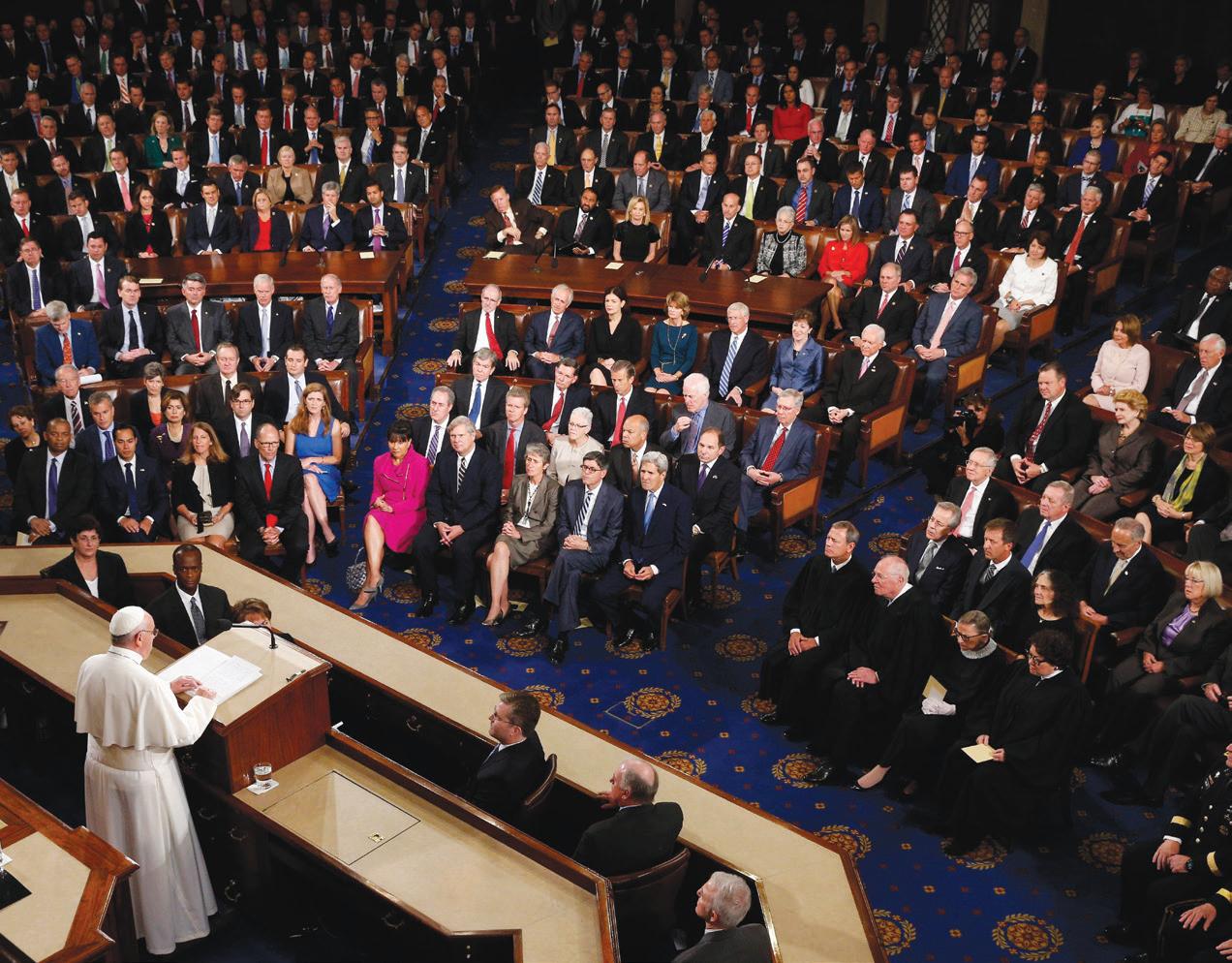
years into his papacy
guiding principles for the Church in is not new. It started with heeding during the Latin American bishops’ (CELAM) meeting in Aparecida, 2007, before his papacy began. It through the publication of his “Laudato Si’” encyclical, the pontiff’s Peruvian Amazon in 2018, the Synod in 2019 and, finally, the the Ecclesial Conference of the Region in June 2020.
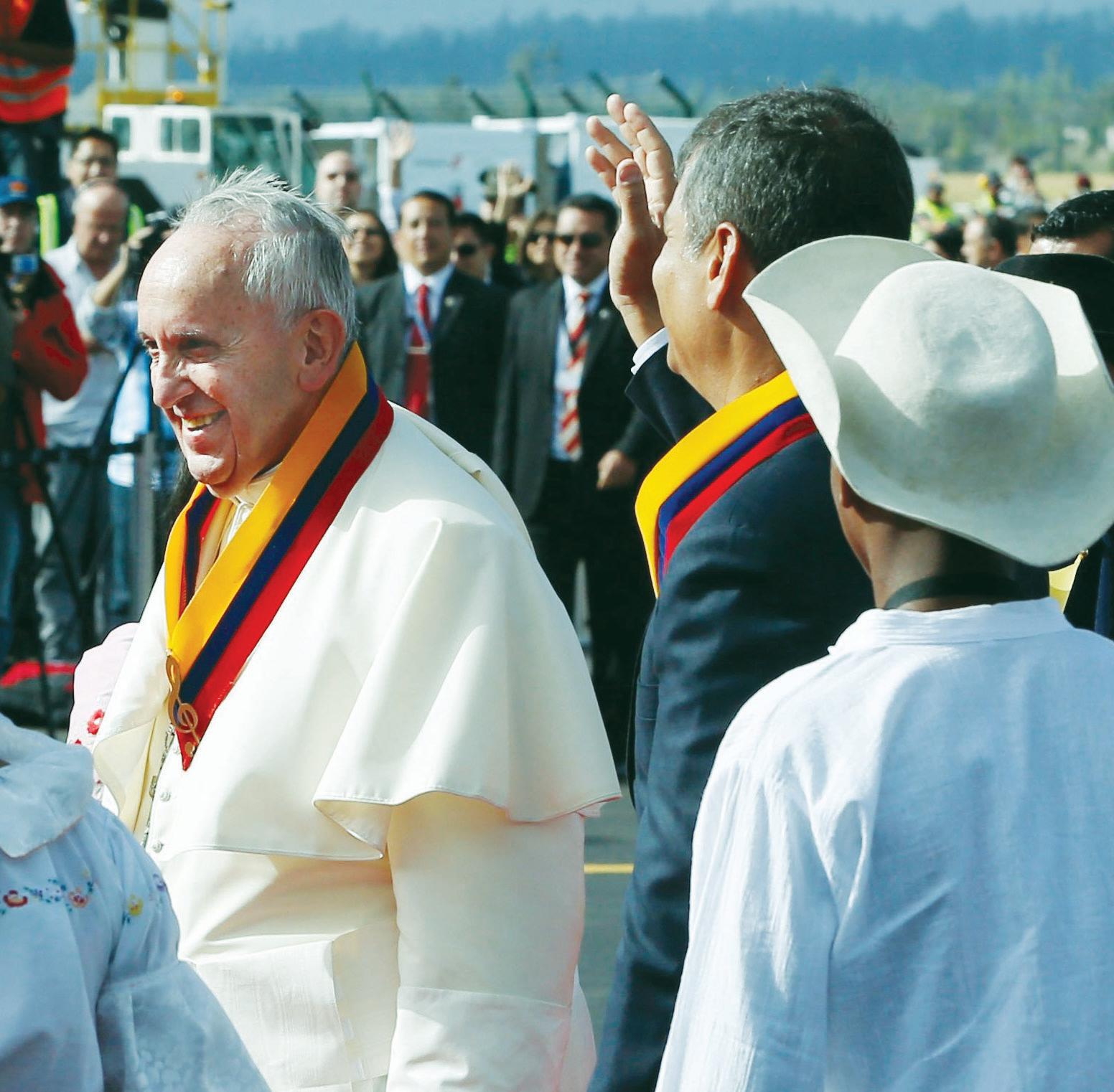
Ecclesial Conference puts into what Francis has been preaching decades. It is significant because as ecclesial body, it is all the people of God recognized by the Holy See,” the said.
Miguel Ángel Cadenas, apostolic Iquitos in northern Peru, told OSV the pope’s emphasis on is critical for the Church.
“Synodality is a central idea for Francis, It is a process so that we can what is going on around us. It is Church and the world,” Bishop
Augustinian, said the current synodal will culminate in October 2024 renewed vision that better
understands the periphery.
He said that Pope Francis has focused on the peripheries through his travels, through his selection of new cardinals, and through the beatification and canonization of new saints.
“Many new cardinals are from the peripheries, small churches that have been given importance. The same thing is true with saints. It is a new way of seeing the Church,” Cadenas said.
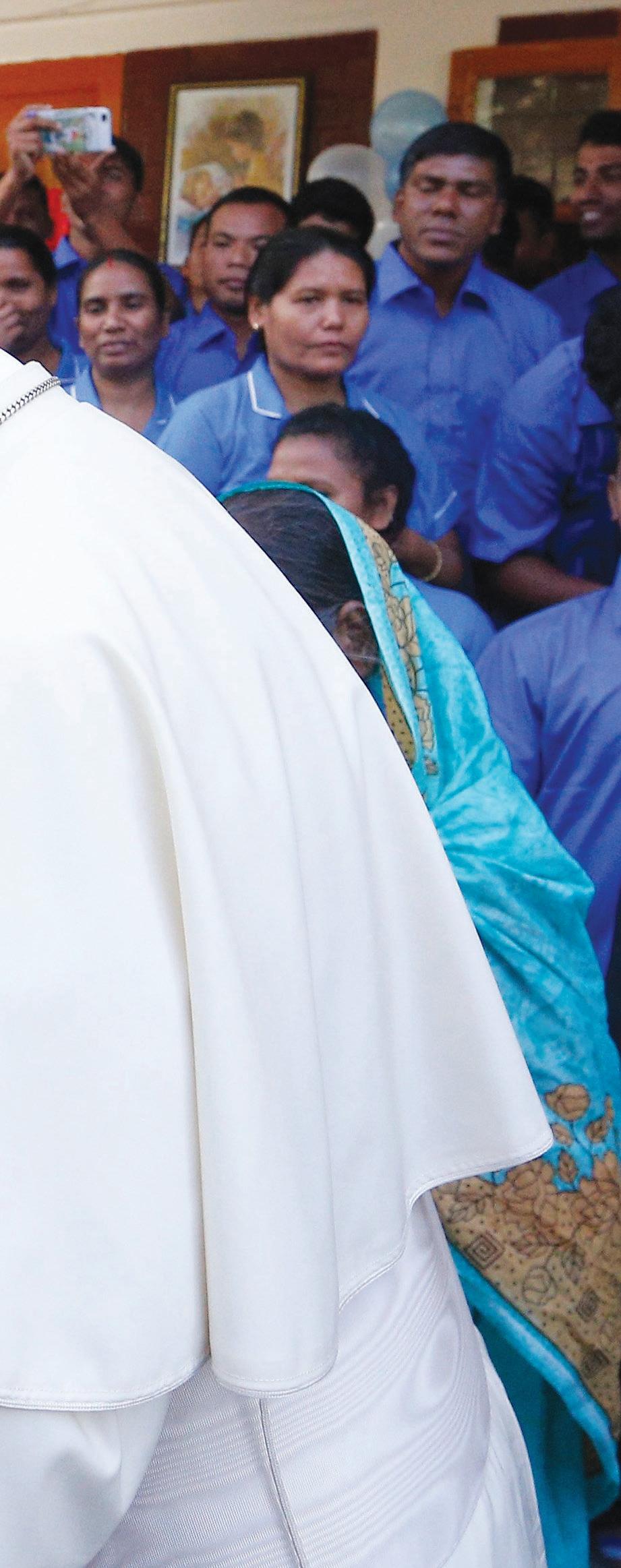
In Latin America, Pope Francis has created the first cardinals in El Salvador, Haiti and Paraguay, and only the second cardinal in Uruguay’s history. He has also created the first cardinal in Manaus, in the Brazilian Amazon.
Pope Francis is also responsible for canonizing the first two saints in Uruguay. The first, Anna María Rubatto, was an Italian nun. She lived only a short time in Uruguay but died in the country. She was canonized in 2022. The second, Jacinto Vera, will be canonized this May. He was the first archbishop of Montevideo, the capital of the country, and he will be the first saint born in the country.
Bishop Emeritus Alberto Sanguinetti Montero of Canelones, who was the local postulator for Archbishop Vera, said Pope Francis was creating new role models for the Catholic faithful.
“The image of a saint is a strong symbol that people identify with as an intermediary with God. Saints are seen as bridges who intercede on our behalf. Jacinto Vera is someone who people relate to, because they can see themselves in him,” the bishop emeritus, who headed the Canelones diocese until 2021, told OSV News.
Cardinal Barreto added that the pope knows that there is opposition within and outside the Church to changes, including his preference for the peripheries and focus on synodality.
“He is very aware that as he walks, he has to listen to God, the cries of the poor and the clamor of the earth,” the cardinal stressed.
Pope Francis has been laying the foundation for the new synod process since the beginning of his pontificate, said Cardinal Blase Cupich of Chicago.
“I just wonder if, from the very beginning, he had in his mind that this would be the trajectory of his pontificate, and the synod on synodality I think is, in some way, the opportunity for him to pull everything together,” he said. “There are people who want him to go faster, but he wants things to be held together and the Church to be held together.”
Asked what he thought was the most significant aspect of Pope Francis’ pontificate, the cardinal cited his predecessor, the late Cardinal Francis George, who participated in the 2013 conclave, and said the best description of Pope Francis was “He’s free.”
“He’s free in the sense of wanting to listen to different voices in the life of the Church,” Cardinal Cupich said. “He’s free in being imaginative, but also he has the kind of freedom that really allows him to be joyful in this ministry.”
“John Paul II told us what we should do. Benedict told us why we should do it. And Francis is saying, ‘Do it,’” the cardinal said. Pope Francis is leading by example in how he cares for the poor, sees God at work in people’s real lives and reaches out to people often overlooked by the Church.
“I think history will look back on this pontificate as historic, as pivotal in the life of the Church,” Cardinal Cupich said.
THE CATHOLIC SPIRIT • 13 FRANCIS10YEARS
CNS | PAUL HARING 2017.
CNS
| PAUL HARING
teachings 10
Pope Francis walks with Rafael Correa, then-president of Ecuador, during an arrival ceremony at Mariscal Sucre International Airport in Quito, Ecuador, July 5, 2015.
CNS | PAUL HARING
Pope Francis addresses a joint meeting of Congress at the U.S. Capitol in Washington in this Sept. 24, 2015, file photo.
Around the world in 10 years: Pope’s 40 trips reflect his priorities
By Justin McLellan OSV News
Many of the 40 international trips Pope Francis has made over the past 10 years have been to countries where Christians are a minority or where he can draw close to people on the fringes of the world’s attention.
The pope always “chooses the peripheries,” said Andrea Tornielli, editorial director of the Vatican Dicastery for Communication, who has accompanied Pope Francis on nearly all his international trips.
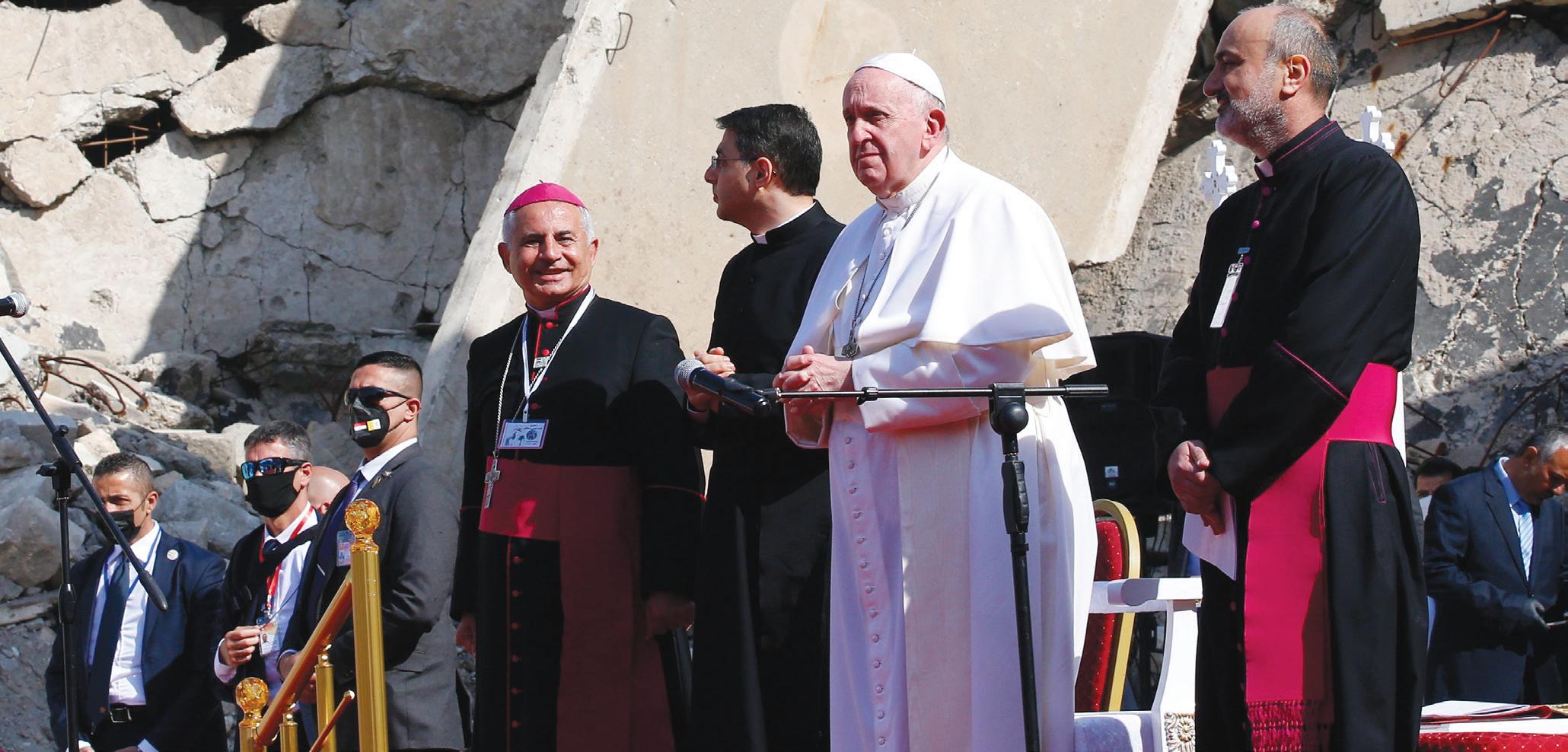
Pope Francis goes “to the most problematic places where he thinks his presence can give way to positive developments, or where he can ‘turn on a light’ so that the world can see the reality of these places,” Tornielli told Catholic News Service.
Pope Francis has visited some of the poorest countries in the world, such as Mozambique and Madagascar in 2019 and Congo and South Sudan early this year.
In countries experiencing war, he has pleaded for peace as he did during a visit to the Central African Republic in 2015. In nations recovering from conflict, he has promoted reconciliation as he did in Iraq in 2021.
He has returned to his native Latin America six times — but has never gone back to his native Argentina — and has traveled to every continent except for Oceania, which he was scheduled to visit in September 2020 prior to the COVID-19 pandemic.
Pope Francis has averaged four international trips each year of his 10-year pontificate, even though he was unable to travel in 2020 due to the pandemic. He has visited 60 countries.
Yet just as notable as the countries Pope Francis has visited are those he has not: Spain, Germany and England, all visited by Popes St. John Paul II and Benedict XVI. Even Pope Francis’ brief visits to France and Switzerland lasted mere hours so that he could address assemblies of the European Union and the World Council of Churches, respectively.
In December 2022, he told the Spanish newspaper ABC that he had not organized an extended visit to any large European nation because he preferred visiting “smaller countries.”
Several of Pope Francis’ trips have reflected his commitment to interreligious dialogue. He became the first pope to visit several Muslim-majority countries: the United Arab Emirates, Iraq and Bahrain, to advance dialogue with Muslim communities and condemn all forms of religious extremism with Muslim leaders.
In Abu Dhabi in 2019 he signed the Document on
u�Experts say Pope Francis brought new life to Muslim-Catholic, Jewish-Catholic relations. Over his decade-long papacy, Pope Francis has reinvigorated Catholic-Muslim and Catholic-Jewish relations through authentic friendships and a focus on shared concerns such as basic human rights, immigration and environmental care, two interfaith experts told OSV News. Mehnaz M. Afridi, professor of religious studies and director of the Holocaust, Genocide and Interfaith Center at Manhattan College in New York, told OSV News the pope has shown “a certain humility, grace and acceptance” in approaching the Muslim community, while inspiring Christians to live out their faith. “When Pope Francis reflects on any Jewish matter, along with his knowledge, undoubtedly the affections forged with his Jewish friends appear in his mind and heart,” Rabbi Abraham Skorka told OSV News. Scholars such as Adam Gregerman, co-director of the Institute for JewishCatholic Relations at St. Joseph’s University in Philadelphia, said the pope’s apostolic exhortation “Evangelii Gaudium” (“The Joy of the Gospel”), which affirmed God’s ongoing relationship with the Jewish people, has
Human Fraternity for World Peace and Living Together with Sheikh Ahmad el-Tayeb, grand imam of Egypt’s Al-Azhar mosque and university, and widely considered to be the leading figure in Sunni Islam thought. In 2022, the pope and the sheikh participated in the 7th Congress of Leaders of World and Traditional Religions in Kazakhstan alongside 80 other religious leaders and hundreds of delegates.
The pope has also used travel to extend a hand to other Christian communities.
His trip in 2014 to Jordan, Israel and Palestine ended with a meeting with Orthodox Ecumenical Patriarch Bartholomew of Constantinople, spiritual leader of Orthodox Christians.
In 2016, Pope Francis signed a joint declaration with Russian Orthodox Patriarch Kirill of Moscow in Havana, Cuba, marking the first meeting between heads of the Catholic Church and the Moscow Patriarchate. Later that year, he went to Sweden to participate in a ceremony commemorating the 500th anniversary of the Protestant Reformation with other Christian leaders.
The pope even described his most recent trip to South Sudan Feb. 3-5 as an “ecumenical pilgrimage,” which he made alongside the leaders of the worldwide Anglican Communion and the moderator of the
marked “a genuine advance theologically,” and “a change from the beginning of the 20th century when popes saw Jews as having no ongoing religious validity.”
u�Praise, protest for Pope Francis’ outreach to LGBTQ persons. Pope Francis has evoked praise and protest for his outreach to LGBTQ persons during his decade-long papacy, as he has offered warmth and welcome while upholding the Catholic Church’s teaching on human sexuality. The pope seeks “to receive the person and accompany them mercifully, and having heard and received their story, to orient them in the teaching of the Church,” said Father Philip Bochanski, executive director of the Courage International apostolate, which supports same-sex attracted men and women in living according to Catholic teaching. The pope sees not ideologies but “individual people, and he wants to make some kind of path for them to come closer to God,” Eve Tushnet, author of “Gay and Catholic: Accepting My Sexuality, Finding Community, Living My Faith,” told OSV News. In so doing, she added, Pope Francis provides a “desperately needed vision for some kind of good future” for LGBTQ persons in the Church.
Presbyterian Church of Scotland.
Even in countries where it is typical for popes to visit, Pope Francis’ choice of activities can be surprising and shows his desire to stay close to marginalized people. During his apostolic visit to the United States in 2015, the pope met with President Barack Obama at the White House and became the first pope to address a joint meeting of the U.S. Congress. Immediately following the historic moment, he ate lunch with homeless people at a local parish. In Philadelphia, he visited a maximum-security prison before celebrating Mass on the Benjamin Franklin Parkway. Other trips have seen the pope visit refugee camps, homes for the elderly and hospitals.
“He always tries to visit places where people are suffering,” Tornielli told CNS. “Places where he can feel people’s lived experience.”
As for where he will travel next, Pope Francis has indicated a possible trip to Mongolia is on the horizon. Tornielli noted that a papal trip to India, which was previously in the works, could be revived.
He added that it is Pope Francis’ dream to travel to one place where his predecessor, St. John Paul II, had also wanted to go but never managed: China.
uPastoral and practical: Francis seeks healing, hard line against abuse. Pope Francis has held up two recurring images the past decade: the good shepherd who looks for the lost sheep, and who lays down his life to defend and save them; and the good Samaritan, who did not ignore, pity or judge the wounded traveler, but helped him without asking for anything in return. “God thinks like the Samaritan” and “God thinks like the shepherd,” the pope said in his first general audience talk March 27, 2013, calling on everyone to enter “more deeply into the logic of God” in their daily lives. It is this same “logic” of God’s love and protection that Pope Francis has used to address the abuse crisis in the Catholic Church. In his homily at Mass celebrated in his residence with a group of clergy sex abuse victims in 2014, the pope said that the Lord tells Peter, “’Go back and feed my sheep’ — and I would add — ‘let no wolf enter the sheepfold.’”
The pope also asked for “the grace to weep, the grace for the Church to weep and make reparation for her sons and daughters who betrayed their mission, who abused innocent persons.” In 2019, Pope Francis promulgated “Vos Estis Lux Mundi” (“You Are the Light of the World”), which revised and clarified
norms and procedures for holding bishops and religious superiors accountable.
u�Pope’s anniversary sees Curia reform complete, financial reform ongoing.
Beginning his pontificate, Pope Francis set out to reform the structure and attitudes of the Roman Curia and knew he also had to reform the Vatican’s financial system and stewardship of resources. One month after his election, he announced he was forming an international Council of Cardinals to advise him on governance and, in September 2013, the council began studying ways to reorganize the Curia. Nine years passed before Pope Francis promulgated “Praedicate Evangelium” (“Preach the Gospel”), his apostolic constitution finalizing the Curia reorganization and highlighting its role as a body existing to help the pope and local bishops share the Gospel and care for the poor. In addition, Pope Francis has expanded the efforts begun by Pope Benedict XVI to monitor transactions, standardize budgeting procedures and ensure the Vatican bank and other financial offices are not being used for illegal activity.
14 • THE CATHOLIC SPIRIT POPEFRANCIS10YEARS MARCH 9, 2023
CNS | PAUL HARING
Pope Francis participates in a memorial prayer for the victims of the war at Hosh al-Bieaa (church square) in Mosul, Iraq, March 7, 2021. Pope Francis was the first pope to visit the Middle Eastern country, where he called for interfaith unity and reconciliation after Christians were the target of violence committed by the Islamic State for nearly two decades.
— OSV News
PAPAL IMPACT
Listening as a launch point
Two retreat leaders focus on physical, spiritual health
By Rebecca Omastiak The Catholic Spirit
Two women leading separate retreats this year at Christ the King Retreat Center in Buffalo will be encouraging participants to listen — to God, to others and to themselves — as a launch point to aid in their physical and spiritual health.
Ruth Hoenick and Susan Stabile found common ground hosting retreats at the center. Their paths also have crossed at the Jesuit Retreat House in Oshkosh, Wisconsin, where they both serve on the board of directors.
Hoenick — who is leading a men’s and women’s Serenity (12-step) Retreat Sept. 29 to Oct. 1 at Christ the King Retreat Center — said healing and health come about “with the Holy Spirit and the help of one another,” as well as three essential retreat elements.
“My thought is that a retreat has three components: It has the physical rest, the emotional healing, and then spiritual growth,” Hoenick said. “When we take the time to be still and to listen, stay in the moment, then we can accomplish all three of those things within that retreat’s period of time.”
Hoenick — who said she doesn’t belong to a specific parish but takes part in Mass at the retreat house in Oshkosh — has been a “spiritual companion” for about six years, after a 30-year career as an educator. She travels throughout the U.S. facilitating retreats, including 12-step retreats. The 12-step method of recovery, which originated with Alcoholics Anonymous, provides a person experiencing an addiction a series of actions to take to respond to the physical, mental and emotional effects of the addiction.
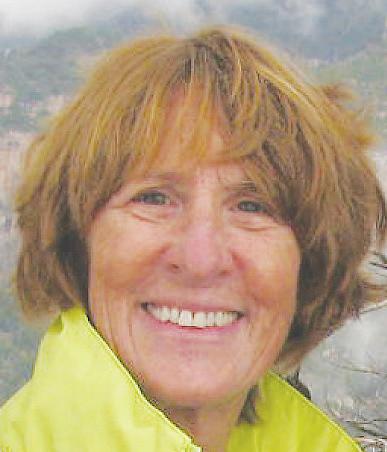
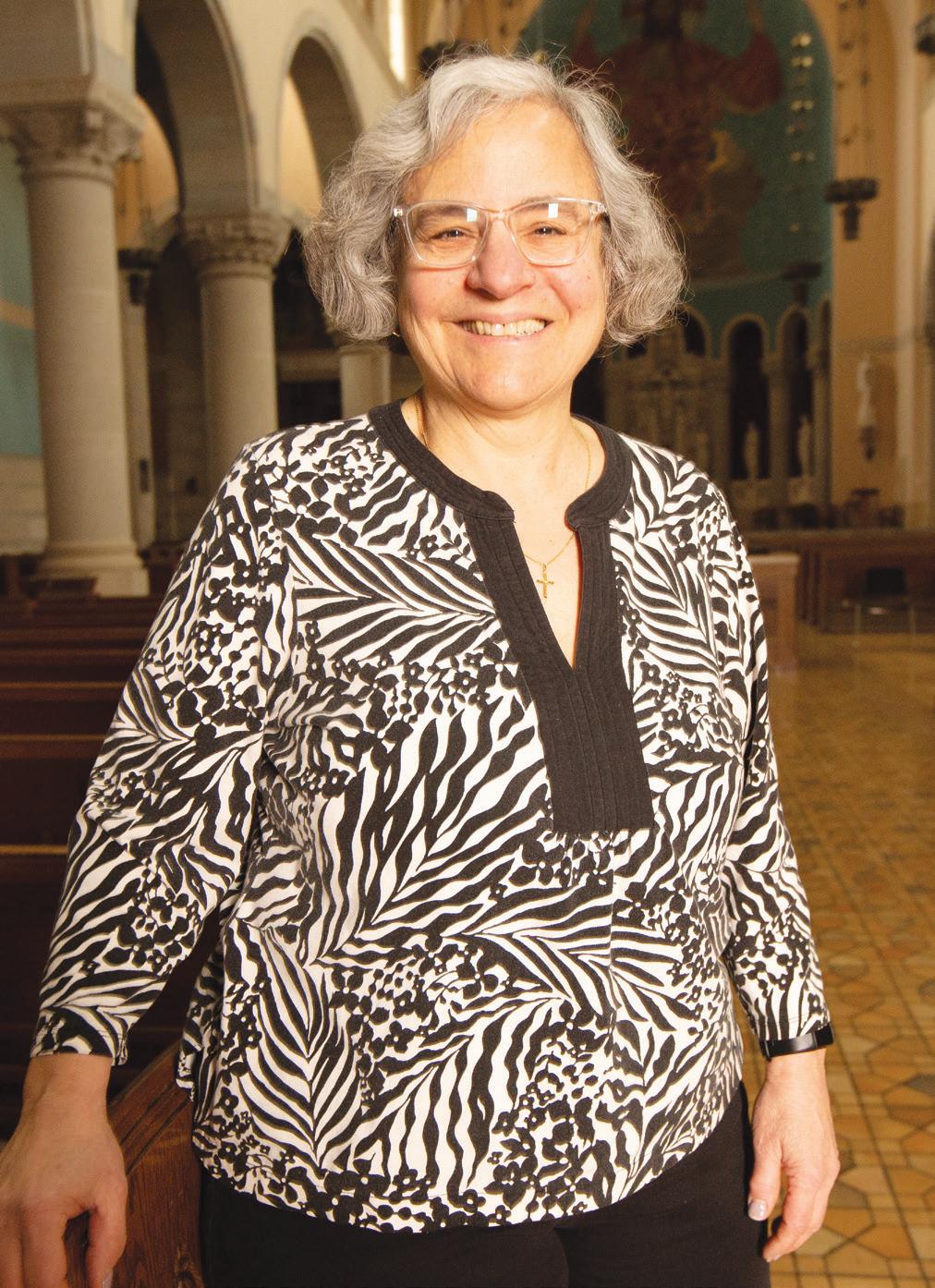
Hoenick takes an interfaith approach as a retreat
leader and leads by example. “I mostly speak from my heart and talk about the emotions within situations that I’ve had in my life, both pre- and post-entering recovery.” Hoenick said she believes “it’s in listening to those stories that we each find our own way.”
PLEASE TURN TO RETREAT LEADERS ON PAGE 17
COVID-19 FLUCTUATIONS
Sitting on 5 acres and overlooking Buffalo Lake in Buffalo, Christ the King Retreat Center is a destination for prayer and reflection.
“People relish the chance to come here, it’s beautiful right on Lake Buffalo,” said Father Richard Sudlik, the center’s director. “Often, we are told how refreshing it is for people to get away from it all for a few days. It is the gift they can give themselves.”
Father Sudlik has been the center’s director since May 2020, having previously served as director and superior of the Oblate Mission Center in New Orleans.
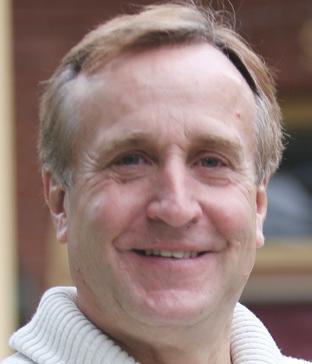
His arrival coincided with the onset of the COVID-19 pandemic. Father Sudlik said with the pandemic, he has seen fluctuations in retreat attendance that are slowly stabilizing. “The year before COVID, we had 6,000 people staying at the center.” That number dropped to 2,000 in 2020, particularly as the center was forced to close in March and reopened in June. Anita Goth, retreat coordinator at the retreat center, said “it’s just been a year, well, a couple of years of just making it work.”
This year, Father Sudlik said, “we’re back over 4,000 now.” That includes regular retreatants, some of whom Goth said “have been coming for 70 years.” There are new faces as well, which Father Sudlik said is “wonderful for us,” including 20 new registrants for a recent women’s retreat.
Father Sudlik suggested that women and men equally can benefit from the various types of retreats at his center. “Some of the examples we use might change but the message is very similar,” he said, about women-only and men-only retreats. “We try to have a place for everybody,” Goth said.
— Rebecca Omastiak
St. Isidore Farm: Retreat center for men in addiction recovery
 By Dave Hrbacek
By Dave Hrbacek
The Catholic Spirit
Tim Murray attends at least one retreat a year. For the last 14 years, he has gone to Demontreville Jesuit Retreat House in Lake Elmo. During his first retreat there in 2009, he was inspired to begin his recovery from alcoholism and open a residence for men 40 and older in recovery called Trinity Sober Homes, which now consists of three houses in St. Paul.
Throughout Trinity’s first 10 years, 71% of residents remained sober for at least one year, but Murray was concerned about the 29% of men who relapsed. So, he went on retreat in 2020 to spend time praying about what more he could do.
“I have utilized retreats to further understand God’s will for my life,” said Murray, 64, who had a conversion in 2009 back to the Catholic faith of his upbringing.
“Every time I go on a retreat, I will carry with me a particular question or a particular idea and basically have that as my focal point.”
Through research, he learned that weekends can often be a time of struggle and relapse for men trying to stay sober. He asked God to show him how to provide support for the men on the weekends.
“Basically, the answer was right in front of me; I just didn’t see it,” Murray recalled. “Here I am, on a
retreat trying to figure out what I should do to assist men in better developing their own spiritual experience ... when I’m actually at something that’s doing that for me.”
The light bulb went on. Murray needed to create a fourth residence for men, this one a retreat center. After looking for property at an affordable price, he found 5 acres about 75 miles south of the Twin Cities near New Richland. It had an old farmhouse that he could remodel and repurpose as a retreat center. He bought the land in January 2021 for $90,000 and went to work creating a facility he eventually named St. Isidore Farm. Some of the residents of Trinity Sober Homes came down on weekends to help with the project, and the first retreat was held in April 2022. The most recent retreat happened the weekend of March 3-5, with six men from the three houses — St. Michael, St. Raphael and St. Gabriel — attending.
“This weekend was my first (retreat) experience” at St. Isidore Farm, said Troy Gates, 45, who has been living at St. Raphael House for two years and reached two years of sobriety March 7. “I didn’t know what to expect going in. I think that I liked the intimate setting. We only had six of us ... It was a very powerful experience. It’s left me a lot to think about.”
This retreat was designed to integrate the 12
Steps of Alcoholics Anonymous with the spiritual life. It was a natural approach, given the Catholic nature of Trinity Sober Homes. The retreat leader, Kathleen McCauley, wanted to help the men understand that God (referred to in AA as “higher power”) desires to come alongside them in their journey of sobriety.
“I wanted to unpackage the (12) steps and show the thread of spirituality through the steps,” said McCauley, who has led retreats for people in recovery for the last 25 years and has a fondness for Franciscan spirituality. “What I try to do is invite people to see that thread. … What I always say is be open to whatever’s supposed to happen spiritually.”
Rick Clugston, also a resident of St. Raphael House, was at the retreat with Gates. It was his second retreat at St. Isidore. His journey of sobriety has involved “way over a thousand (AA) meetings” and going through treatment five times. He wasn’t expecting to hear anything new, but rather something that would give him further encouragement for continuing the journey.
“Her (McCauley’s) approach was really quite powerful in the sense of getting me to re-engage in
MARCH 9, 2023 THE CATHOLIC SPIRIT • 15 FAITH+CULTURE
DAVE HRBACEK | THE CATHOLIC SPIRIT Susan Stabile will facilitate a Women’s Day of Reflection March 18 at Christ the King Retreat Center in Buffalo.
RUTH HOENICK
PLEASE TURN TO ST. ISIDORE FARM ON PAGE 17
TIM MURRAY
will make up my own songs’: Clarist sister remains young at heart
By Christina Capecchi For The Catholic Spirit
Sister Pranitha Parambil, 55, grew up in India and entered the Franciscan Clarist Congregation at age 18. She now directs pastoral care at Mary, Mother of the Church in Burnsville, a role that comes naturally to the service-oriented woman. “I’m available any time,” she said. “I tell them: ‘I’m here for you. Any time. You know my number.’”
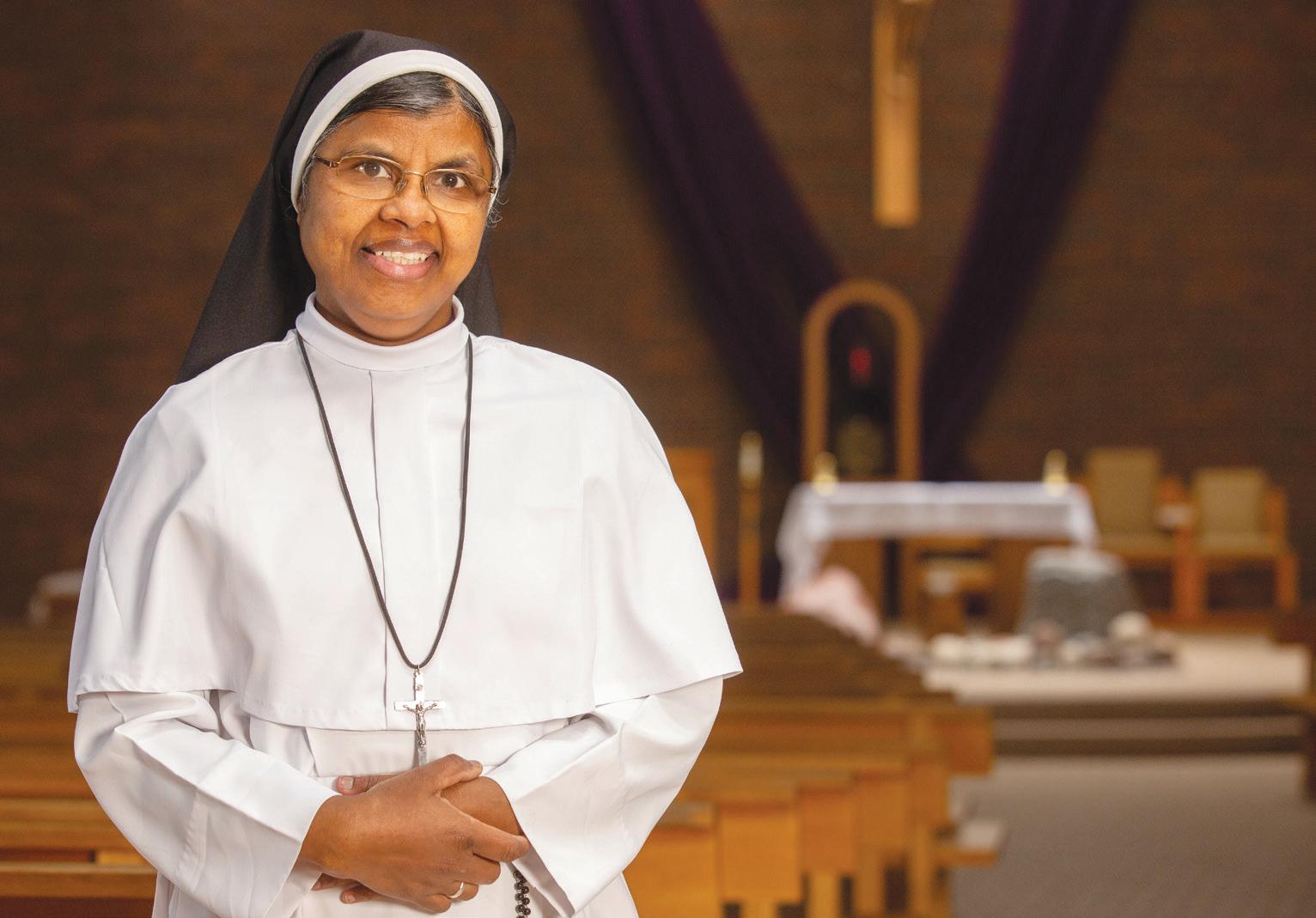
Q What drew you to religious life?
A I grew up in a strong Catholic family. Every night we said all our prayers together, especially the rosary, and we read the Bible. When I was in middle school, my favorite teacher was a nun, and she recognized a vocation in me. I felt God tell me: “I choose you. You didn’t choose me,” John 15:16. That statement was powerful. During 12th grade, my best friend told me she was going to visit a convent. It was a Thursday. That night, my heart was racing. I couldn’t eat. I couldn’t study. Jesus called me. He told me, “You are mine.” I felt it in my body. The next day I went to church to speak to a sister.
Q That summer, you began the novitiate process. Did anything hold you back?
A No. I didn’t have any boyfriends. I didn’t think about it. I didn’t have any doubts. I was at peace.
Q You chose a new name when you became a professed sister.
A My baptismal name was Chrysanthemum, the flower. I chose Pranitha. Later I learned it means “special chosen,” just like the Bible verse that had struck me.
Q What do you love most about religious life?
A Of course, my prayer time. I’m closer to Jesus.
Q Why did you immigrate to the U.S.?
A Always God will talk to us through our superiors. They wouldn’t send us to the wrong place. They found in me the small seed of a missionary. The smallest seed. I thought of St. Mark’s Gospel, when Jesus says, “Go out to the world, proclaim the Gospel!” I said, “OK.”
Q You were 38. Were you scared?
A No. Always, Jesus was with me. I trusted that. I came to the small town of Cologne, Minnesota. I had to start over, like a child. Culture, weather, food, language. Everything was different. The people were very kind. Everybody helped me grow up. If somebody talked, then I would listen carefully. Gradually, gradually I got it.
Q How did you adapt to the cold weather?
A When I came here, I had never seen snow before. I was waiting, waiting for snow. Finally, it came one day — something flying in the air, like cotton. I asked somebody, “Is this snow?” I really enjoyed it. I still do. I don’t just look through the window. I like to go out in the snow. I like to play. I like to make snowmen.
Q Was it hard to be so far from your family? Even now, all your siblings are in India.
A When I entered the convent, I gave up everything. I could feel God’s blessing in each moment.
Q You’ve served the archdiocese at a Catholic school, nursing home and now at a parish.
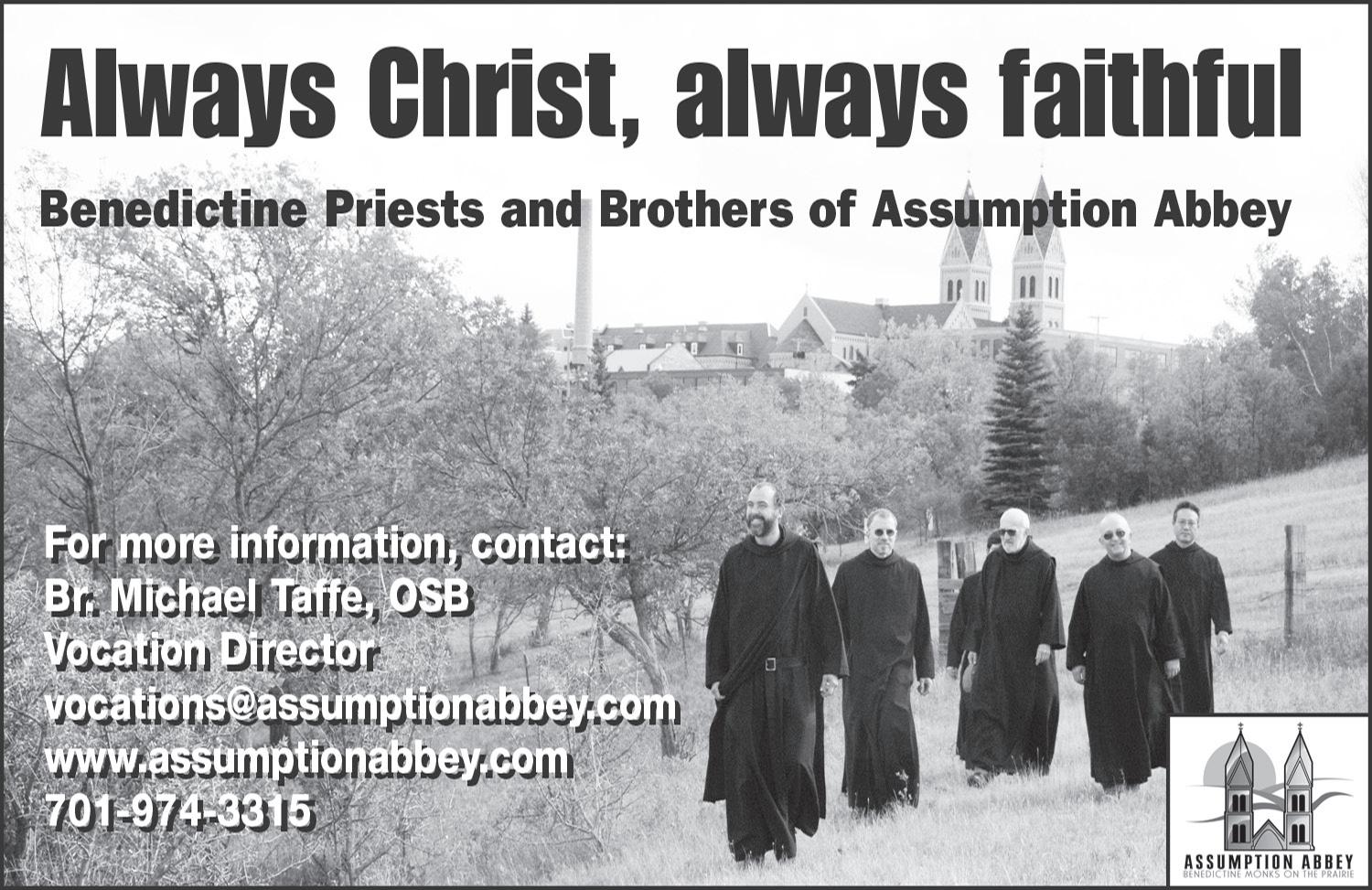
A Helping others makes me feel close to God. When I was working in a senior living home, a resident hadn’t seen me for a week. She was crying when she saw me: “Sister, where were you?”
Q How often do you go on retreat?
A We have 12 Franciscan Clarists here — all of us are from the same area of India. Once a month we all gather for a retreat. We are close friends. We pray and we also play games. There’s so much laughing! We’re always waiting for the next month to gather. Then every year we go on a retreat for a whole week.
Q Do you look forward to it?
A Oh yes! That quiet time with Jesus, no distractions — we don’t need anybody or anything. We are filled with grace. Afterwards, I feel lightweight.
Q You’ve done pastoral care for Mary, Mother of the Church for almost two years. You support parishioners and visit five nursing homes and the hospital in the area, coordinating monthly Mass and confessions. What’s the key to being a good listener during times of grief or hardship?
A First, I will make them comfortable. Then, they will start to cry, and I will encourage them to open their heart, to feel safe. I will not judge. “Don’t worry,” I tell them. “That’s why I’m here. I will listen.” After they share, there is a big sigh. I can see the change in their faces.
Q What’s your favorite way to spend free time?
A Reading is my hobby. I have a sewing machine. I sew a bit.
Q Tell me about the Clarist habit.
A We have white and grey. We can wear either. On celebration days, we use white. Most of the winter, we use grey. It doesn’t show stains. I like to wear a habit. When we wear the habit, we are separate from other people. When we go in a store, sometimes people come to us and say: “Thank you for wearing habits.”
Q Do they ask for prayer?
A Oh, yes, yes, yes. “Sister, can I talk to you?” They say, “Sister, you are closer to Jesus. Pray for me.”
Q That’s a big responsibility.
A Oh, yes.
Q People see your joyful countenance.
A I am a happy person. I always have a smile and laugh. One parishioner, toward the end of her life, told me, “Sister, when I see your happy face, then my pain is gone! I feel better.”
Q How did it feel to hear that?
A I said, “Thank you, Lord.”
Q What keeps you young at heart?
A Being with God! It keeps me happy and young. I go to chapel early every morning for eucharistic adoration. In front of him, I am a child. I’m not a good singer, but if I am alone in the chapel, I will make up my own songs. I close my hands, then I will come out and spread my hands.
Q You’re receiving his grace so you can then go out and help others.
A Exactly.
Q That sustains you.
A I love my faith. I got it when I was young, in my mom’s lap. She taught me about Jesus. I have the privilege of receiving Jesus in the Eucharist every single day.
Q What do you know for sure?
A I know God loves me. I love God. And I love my fellow man. I’m sure of that.
Name
Address City State Zip

16 • THE CATHOLIC SPIRIT FAITH+CULTURE MARCH 9, 2023
‘I
CHAPELS, INC.
• Plymouth • St. Louis Park
cut out form below and mail to: 3888 West Broadway • Robbinsdale, MN 55422
DAVE HRBACEK | THE CATHOLIC SPIRIT
FUNERAL
Robbinsdale
Please
o Please mail information regarding pre-need funeral arrangements. o Please have a funeral director call me with information regarding prearrangements. My phone number is
RETREAT LEADERS
CONTINUED FROM PAGE 15
The “Brilliant Light in Recovery” Serenity Retreat she will lead in September is her first at Christ the King Retreat Center. Hoenick said it focuses on “coming out of that darkness” and moving into a brighter life by embracing the journey, “living in the faith-filled walk into mystery. I think that’s where healing can occur.”
To anyone seeking immediate answers at her retreat, Hoenick said, “I will encourage them, ‘Maybe if you listen, a different question will arise,’ and to look at what God’s desire is for them during this retreat, rather than what their desire is.”
Having the space to listen helps deepen the encounter with God, said Stabile — a spiritual director and retreat leader who is facilitating a Women’s Day of Reflection March 18 at the center in Buffalo.
Stabile selected her retreat’s “Celebrating Female Mystics” theme because “some of the greatest mystics of the Catholic Church have been women” and “it’s important to spend time reflecting on them because I really do believe it’s not outrageous to suggest we’re all called to be mystics.” That might sound mysterious and daunting, Stabile said, but she wants people to understand that what distinguishes mystics is not that God spoke to them and not others, but that God speaks to everyone, and people often given the label “mystics” do a better job listening.
Stabile is a member of St. Thomas More in St. Paul, where she offers spiritual direction. She is a distinguished senior fellow at the University of St. Thomas’ School of Law in Minneapolis and an adjunct professor of theology at St. Catherine University in St. Paul. She travels throughout the U.S. leading retreats. She also facilitates virtual retreats, including a current Lenten retreat via Zoom for an Anglican congregation in Australia. Stabile began leading retreats at Christ the King in 2016; she now offers Women’s Day of Reflection and Advent retreats.
The hope for the Women’s Day of Reflection is “that something they (retreatants) learn about these women, whether it’s an aspect of their life, an aspect of their spirituality, an image that was central to them, will help people deepen their own personal encounter with Christ,” Stabile said.
Take, for example, St. Hildegard of Bingen, a
IN-PERSON VS. VIRTUAL
Happy to see an increasing number of in-person retreats since the height of the COVID-19 pandemic, Father Richard Sudlik, director of Christ the King Retreat Center in Buffalo, said while his center hosted virtual options, it was “kind of awkward.” Retreatants could hear the talks but missed out on the center’s hospitality and the refreshing nature of time away from daily routines, he said.
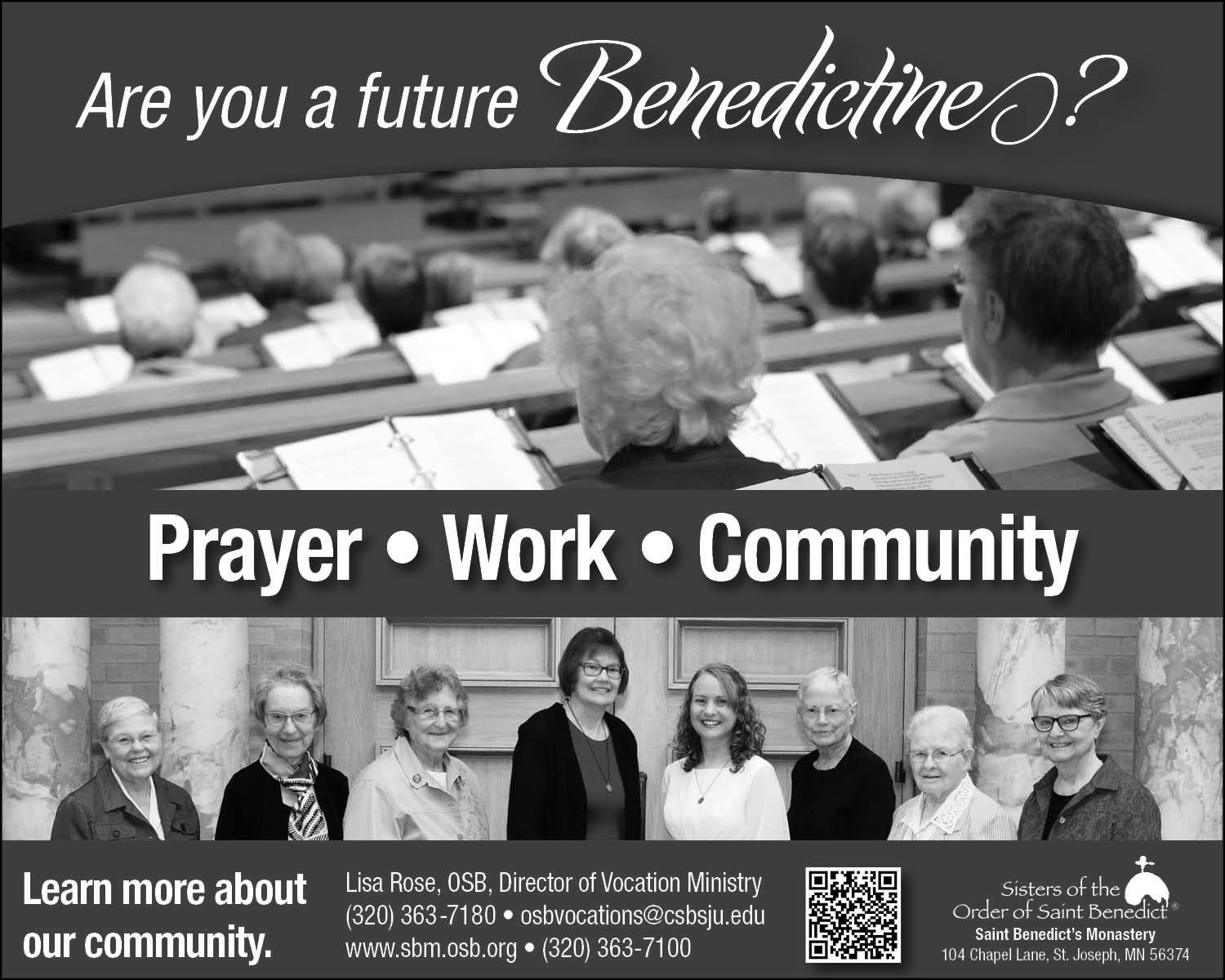
Meanwhile, Susan Stabile — a spiritual director and retreat leader — suggested that virtual retreat options were an unexpected positive development during the pandemic. “It’s interesting that we’ve been able to use the technology to expand the reach of what we can do,” she said. A virtual retreat can be “very helpful for older people who don’t want to drive, but also for young couples, couples with young children … these are people who can’t come out for an evening program, but they can sit with their baby in front of a computer.” She went on to say, “We’re making opportunities available to people who could not otherwise do it.”
Ruth Hoenick — spiritual companion and retreat leader — emphasized that what matters is the approach a retreatant takes. “If one can come at a retreat as something that they are giving time to, rather than taking time for, I think that in itself opens up one’s heart and allows healing; physical, emotional and spiritual … to be able to just walk with God wherever you are, to take that silence, because it’s in the silence that we’re able to listen.”
— Rebecca Omastiak
doctor of the Church whose work on spiritual and physical health Stabile plans to talk about during the March retreat. “In more recent years, she’s embraced by everybody,” Stabile said. “By women; by natural health aficionados, because of her work on medicinal plants and healing techniques; by environmentalists, because of her conviction that the earth is sacred; by musical people, because she composed some incredibly beautiful pieces.”
Stabile hopes retreatants ask themselves, “‘How do these women help me deepen my own encounter with God?’”
For information on upcoming retreats, visit Christ the King Retreat Center’s website: kingshouse com

ST. ISIDORE FARM
CONTINUED FROM PAGE 15
a way that I haven’t for a while,” said Clugston, 73, who has lived at Trinity homes on and off since 2016. “That was really neat … I’m a very spiritual person, and so it was an opportunity to dig into it — the deeper spirituality of the 12 steps of AA.”
The retreat center is nestled in an agricultural area, with farms surrounding it on all sides. It takes about an hour and a half to get there from St. Paul, a drive that the men said helps dissolve their cares and concerns. The natural setting creates a sense of peace and serenity, which is why Murray now spends most of his time there and belongs to All Saints in New Richland. He highly encourages the men to come down for retreats, which now are quarterly with the goal of eventually happening monthly. They can go on other weekends, too, he said.
“This is your farm,” Murray tells the 41 residents of Trinity Sober Homes, “that you can come down to anytime from Friday noon to Sunday afternoon — any weekend, for any reason.”
Murray said 32 residents have gone down to St. Isidore Farm — to go on retreat, to help with remodeling or just to spend some quiet time away. People like St. Gabriel resident Adam Kitchell, who went down to help with remodeling and was on the first retreat in 2022, find it a valuable part of recovery.
“I think a retreat helps because sometimes we’re standing too close to the forest to see the trees,” said Kitchell, 50, whose sobriety and St. Gabriel move-in dates are one and the same, Oct. 9, 2020. Going on retreat at St. Isidore is a way “to get out and be with some new people and talk about something that you’ve talked about a million times, but maybe just in a little bit of a deeper, more confidential, trustworthy, safe environment, with like-minded individuals. It makes a difference.”
The retreat he attended has “taken away a lot of the shame that I was carrying with me,” he said. “I think the retreat helps people — helped me, at least, take ownership of my story, as opposed to being victim to it.”
MARCH 9, 2023 FAITH+CULTURE THE CATHOLIC SPIRIT • 17 Look for The Catholic Spirit advertising insert from AMERICA NEEDS FATIMA in all copies of this issue. N O T I C E TheCatholicSpirit.com
God thirsts that we may thirst for him
Have you ever found yourself dissatisfied while dining at a restaurant? Maybe a special entrée just didn’t live up to your curiosity, excitement and expectations. That bowl of Bolognese left you wanting something a little more. I believe our reaction to scenarios like this can mirror the way we communicate our desires to God. When faced with unfulfilled desires at a restaurant, some customers comfortably communicate their experience with the waitstaff and seek a peaceful resolution. Others take a more aggressive approach by demanding some culinary or monetary retribution. Still others grumble to themselves or a friend but say “just fine” when the manager asks how the first few bites are tasting.
Our physical desires, hungers and thirsts are important for our bodies to survive and thrive, but no less important are the desires of our hearts that long to be satisfied in deep and lasting ways. I long to be known, understood, comforted, accepted and loved. Yet the thirst for soda and the hunger for pizza are easier to acknowledge and define — we recognize these cravings as soon as they arise. How do we discern and communicate the desires of our hearts? Who do we seek to fulfill these longings of the soul? Perhaps we turn to ourselves or to others but are sometimes reticent in turning to God with our deepest desires.
Jesus’ encounter with the Samaritan woman at the well is a model for relational prayer; the story teaches us how to
acknowledge and communicate our desires to the one who longs to receive us. Citing St. Augustine, the Catechism of the Catholic Church describes this relationship of prayer: “The wonder of prayer is revealed beside the well where we come seeking water: there, Christ comes to meet every human being. It is he who first seeks us and asks us for a drink. Jesus thirsts; his asking arises from the depths of God’s desire for us. Whether we realize it or not, prayer is the encounter of God’s thirst with ours. God thirsts that we may thirst for him” (CCC 2560).
At the well, Jesus approaches the woman who is consumed with her own life’s difficulties. She longs to be accepted and fulfilled, but she keeps coming up empty. Jesus takes the first step toward her, vulnerably shares his thirst for her companionship, and invites her to a mutual exchange, a giving of self and reception of the other. This is the same path that we can take in sharing our desires and the intimate longings of our souls with Jesus. He approaches us first, and he is so much more than a waiter who just checks on our satisfaction. He is the one who loves us, longs for us, and thirsts for us. Sometimes we waste time and energy in judging and asking if we’re praying right. The only criteria worthy of measuring prayer are consistency and honesty. Come to the Lord regularly and share desires and longings with him in sincerity and truth. This is the well where Jesus wants to meet us — he thirsts for us to share our thirst with him.
DAILY Scriptures
Sunday, March 12
Third Sunday of Lent
Ex 17:3-7
Rom 5:1-2, 5-8 Jn 4:5-42
Monday, March 13 2 Kgs 5:1-15ab Lk 4:24-30
Tuesday, March 14 Dn 3:25, 34-43 Mt 18:21-35
Wednesday, March 15 Dt 4:1, 5-9 Mt 5:17-19
Thursday, March 16 Jer 7:23-28 Lk 11:14-23
Friday, March 17 Hos 14:2-10 Mk 12:28-34
Saturday, March 18 Hos 6:1-6 Lk 18:9-14
Sunday, March 19 Fourth Sunday of Lent 1 Sm 16:1b, 6-7, 10-13a Eph 5:8-14 Jn 9:1-41
flesh from anywhere in the man’s body, but God chose to take one of the man’s ribs (Gn 2:21b). The choice was deliberate and conveys a message. God could have chosen pieces of bone from the skull or the cranium, the upper part of the body, to indicate that the woman is above or superior to the man. God could have taken pieces of bone from the ankle or the foot, to indicate that the woman is below or inferior to the man. But God chose a rib from the man’s midsection to state that neither woman nor man is above or below, neither superior nor inferior to the other, but rather on the same level and equal.
The Order of Celebrating Matrimony recommends nine different Old Testament readings for the marriage liturgy. Second on the list and one of the most chosen texts by wedding couples is the creation of woman, Genesis 2:18-24. It employs rich, descriptive imagery that illustrates God’s plan for the right relationship between a wife and a husband.
Together, not alone. God said, “It is not good for the man to be alone” (Gn 2:18a). God created a complementary partner, woman, so man and woman could walk the journey of life together as companions in love and mutual support. Flesh, not dust. God is all-powerful and can create anything out of nothing. After the Lord God created the earth, the Lord God formed man out of the dust of the ground (Gn 2:7). Then, out of the ground or the dust, God made every tree (Gn 2:9), all the wild animals and the birds of the air (Gn 2:19). When it came to the creation of woman, if God were to proceed in like manner, God would have created woman out of the dust of the ground. But in a striking departure from prior practice, God created woman from the rib or flesh of the man (Gn 2:21). This makes a profound statement. Woman and man are made of the same substance, and if they are composed of the same substance, of one flesh, they are on par with each other and equal.
Rib, not head or foot. God could have taken the bone and
KNOW the SAINTS
ST.
The heart, not the lungs or the stomach. God could have chosen one of the upper ribs near the lungs, or God could have chosen one of the lower ribs near the stomach. But God chose one of the middle ribs near the heart. The heart represents love, and the message is unmistakable. A wife is to love her husband with all her heart and a husband is to love his wife with all his heart.
Equal partner, not second tier. The Revised New American Bible says that the wife is to be the husband’s “helper suited to him” (Gn 2:18b). Old translations used the word “helpmate” which gave the impression that the woman is somehow subservient to the man, and from her lower place she is supposed to serve and obey him. “Helpmate” is a corruption of the archaic Old English word “helpmeet.” The Anchor Bible says that the original Hebrew is better rendered “alongside him” or “corresponding to him.” The New Revised Standard Version translation is “a helper as his partner” and explains that “helper is not a relationship of subordination but of mutuality and interdependence.” The Catechism of the Catholic Church further explains, she is “his companion, his equal … given to him as a ‘helpmate’; she thus represents God from whom comes our help” (no. 1605). The wife and husband are equal partners who help each other.
Father Van Sloun is the director of clergy personnel for the Archdiocese of St. Paul and Minneapolis. This column is part of a series on the sacrament of marriage.
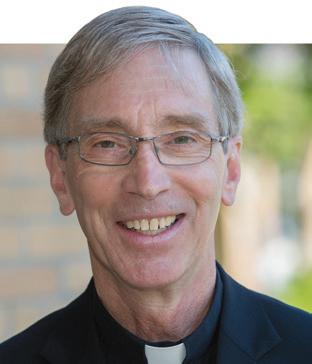
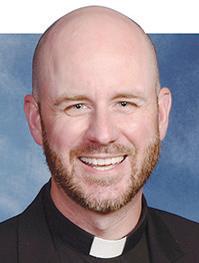
Monday, March 20
Solemnity of St. Joseph, spouse of the Blessed Virgin Mary 2 Sm 7:4-5a, 12-14a, 16 Rom 4:13, 16-18, 22 Mt 1:16, 18-21, 24a
Tuesday, March 21 Ez 47:1-9, 12 Jn 5:1-16
Wednesday, March 22 Is 49:8-15 Jn 5:17-30
Thursday, March 23 Ex 32:7-14 Jn 5:31-47
Friday, March 24 Wis 2:1a, 12-22 Jn 7:1-2, 10, 25-30
Saturday, March 25 Solemnity of the Annunciation of the Lord Is 7:10-14; 8:10 Heb 10:4-10 Lk 1:26-38
Sunday, March 26 Fifth Sunday of Lent Ez 37:12-14 Rom 8:8-11 Jn 11:1-45
supporter of St. Vincent de Paul’s charitable works, and with him, co-founded the Daughters of Charity. She drew up the first draft of their rule. By the time of her death, the order had established 40 houses in France, and Daughters of Charity were looking after the sick and poor in Parisian parishes as well as sheltering hundreds of women. Her feast day is March 15.
— OSV News
 Father VanHoose is pastor of St. Jude of the Lake in Mahtomedi.
Father VanHoose is pastor of St. Jude of the Lake in Mahtomedi.
FOCUSONFAITH
SUNDAY SCRIPTURES | FATHER CHAD VANHOOSE
LOUISE DE MARILLAC (1591-1660) Born in Auvergne, France, Louise married an official of the royal court, Antoine Le Gras. He died in 1625. Despite strained finances and bouts of melancholy after her husband’s death, she was an active
18 • THE CATHOLIC SPIRIT MARCH 9, 2023
Ribs, bones, flesh and mutuality in marriage
FAITH FUNDAMENTALS | FATHER MICHAEL VAN SLOUN
This is the same path that we can take in sharing our desires and the intimate longings of our souls with Jesus.
Eucharistic Revival songwriting competition seeks to inspire Catholic music
By Kate Scanlon OSV News
A songwriting competition aims to inspire new Catholic music as part of the U.S. Catholic bishops’ Eucharistic Revival initiative.
The Eucharistic Revival Musical Competition, sponsored by the U.S. Conference of Catholic Bishops’ Secretariat for Evangelization and Catechesis, seeks entries from Catholic composers, poets and songwriters for Catholic music, with a particular emphasis on texts that focus on the Eucharist or the Church’s unity as the body of Christ, according to an announcement from the USCCB.
Father Tim Tran, who serves as the Archdiocese of St. Paul and Minneapolis’ point person for the revival, said he shared information about the competition several weeks ago to encourage participation in the archdiocese. Father Tran also is parochial vicar of St. Stephen in Anoka.
Submissions are being accepted through April 21, with winners announced June 9. More information, including guidelines and submission instructions, is available at eucharisticcongress org/musicalcompetition
“Music has this really unique ability to really capture the heart of the mystery of the Eucharist,” Marilyn Santos, associate director of the USCCB’s Secretariat of Evangelization and Catechesis, told OSV News.
Through the ages, music has been a
beautiful way of “expressing our faith,” she said.
The people of God have always sung, she said. “If you think back in the Old Testament, David danced and the Israelites sang their praises.”
Launched last year, the National Eucharistic Revival is a three-year campaign by the U.S. bishops to increase the Catholic understanding of and devotion to Jesus’ real presence in the Eucharist. It was prompted by studies showing that only 30-40% of Catholics profess that belief, and that only 15% of Catholics go to Mass every Sunday.
Santos said music can help the faithful carry the mystery of the Eucharist “with us in our hearts and in our heads.”
In announcing the contest Jan. 17, the U.S. bishops said they are seeking submissions for hymns and a theme song. A winning submission in each category is expected to be featured at the 2024 National Eucharistic Congress in Indianapolis, as well as at diocesan Eucharistic Revival events. Winning composers will receive a $2,500 cash prize. A $25 entry fee per submission will offset some logistics-related expenses, such as travel costs for volunteer judges,
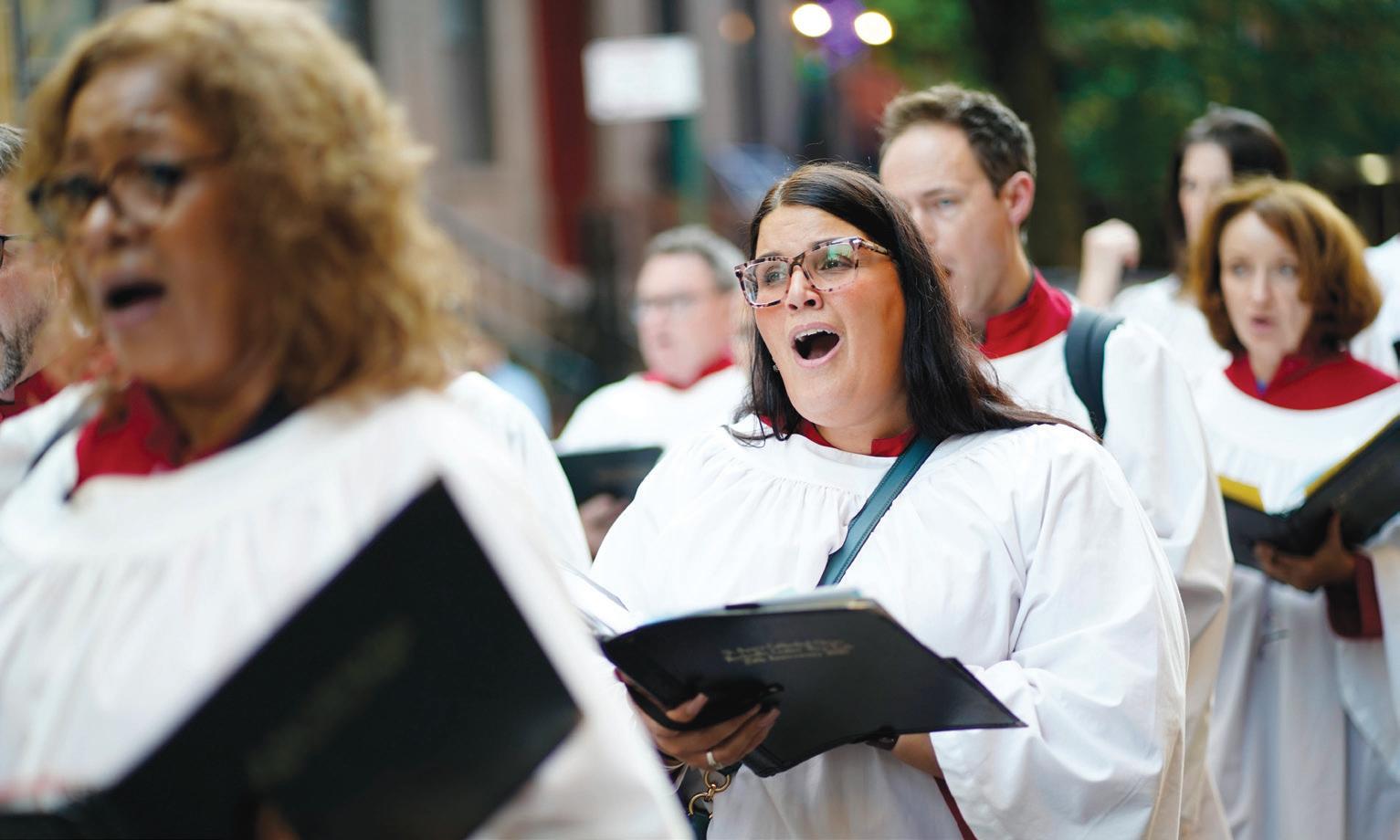
Santos said.
Submissions will be judged on “poetry, musicality, creativity, theological and doctrinal soundness, beauty, appropriateness for liturgical use, and expression of the mission of the Eucharistic Revival (as applicable),” the announcement stated.
They will be considered by a panel of judges, including representatives from Oregon Catholic Press, the Society for Catholic Liturgy, Source and Summit, the Federation of Diocesan Liturgical Commissions, and GIA Publications/ World Library Publications.
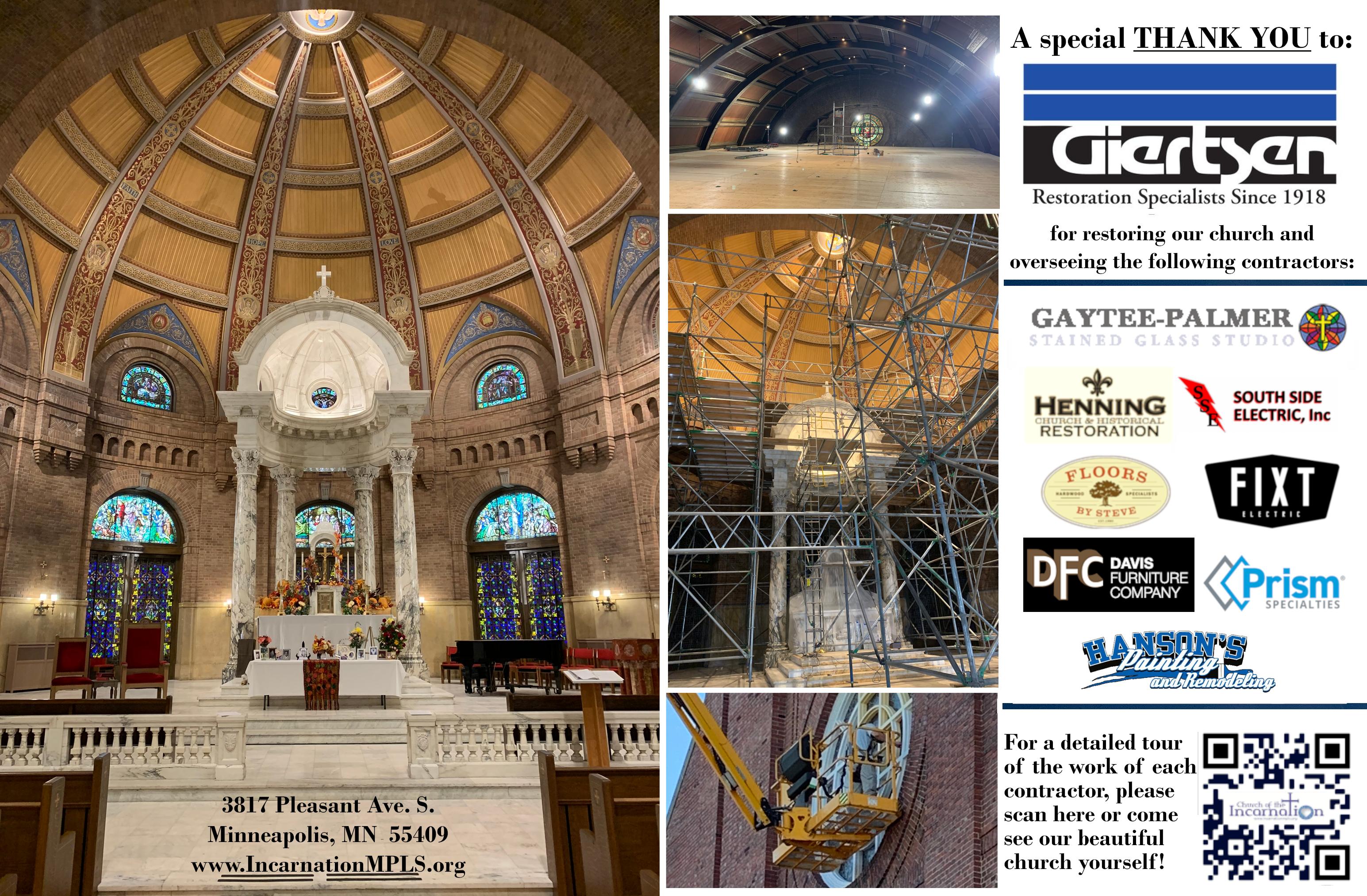
Tim Glemkowski, executive director of the National Eucharistic Congress, said in a statement that the contest “is just the beginning of a number of initiatives on the horizon for the Revival in 2023 that celebrate the beauty and mystery of the Eucharist.”
“Beauty is the mark of a loving God, and we are excited to see creative expressions from talented Catholic artists that embrace the beauty of Christ and give new light, color and voice to the truths of our faith,” he said.
Santos told OSV News she hopes the contest might help open doors to Catholics who want to pursue music as a vocation.
“Wouldn’t it be wonderful,” she said, “to discover these new evangelists who use music as their medium of conveying the message?”
— Barb Umberger of The Catholic Spirit contributed to this report.
MARCH 9, 2023 FOCUSONFAITH THE CATHOLIC SPIRIT • 19
OSV NEWS | GREGORY A. SHEMITZ
Members of the St. Agnes Cathedral Chorale of Rockville Centre, N.Y., sing as they participate in a eucharistic procession in New York City Oct. 11, 2022.
TWENTY SOMETHING | CHRISTINA CAPECCHI
Love the house you’re in
Paige Rien was in hustle mode. Her first book had finally been released, and the Catholic mom of four was determined to market it well.
“Love the House You’re In” was a labor of love, flowing from Rien’s experience as an HGTV on-air designer and bursting with the hard-won, heartfelt wisdom she wished she could personally share with each viewer.
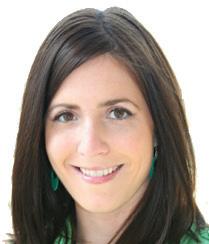
It was time to secure some media coverage. Specifically, Rien had an international newspaper in mind. She couldn’t help but crave the “exterior validation” that would come with a feature in the prestigious paper.
She tried again and again to reach the home editor and finally discovered a connection who personally placed the book on the editor’s desk.
The response came quickly and enthusiastically. “I love the book!”
Soon Rien was inviting the editor to her Kensington, Maryland, home — and doing a million little things
ECHOES OF CATHOLIC MINNESOTA REBA
LUIKEN
Catholic roots of a French chateau
Nestled along the shores of Lake Pepin in the hills of southern Minnesota is a French chateau bordered on three sides by Frontenac State Park. Now a hotel and event venue, Villa Maria’s Catholic history stretches back — it may be the site of a fort where Jesuit missionaries celebrated the first Mass in Minnesota in 1732. While archeology does not provide a clear answer as to when a fort was first built on the hill, history has recorded 1885 as the year that the owner of the adjacent resort town, Old Frontenac, donated many acres of land to the Ursuline order to build a school.
Villa Maria opened a few years later as a boarding school for girls in grades six through 12. It was dedicated by Archbishop John Ireland in 1891 with over 2,000 guests in attendance. The academy was devoted to educating young women with courses in art, music, elocution, German and French. Touted as one of the best schools in the state or even the country,
LETTERS
Divisive ‘Driver’s Licenses for All’
Archbishop Hebda and the Minnesota Catholic Conference supported the “Driver’s License for All” bill, which is awaiting signature by Gov. Tim Walz. (Feb. 9 edition) Shame on them. The bill, which will allow illegal immigrants to apply for a driver’s license, passed the Minnesota Senate on a party line vote.
I am a strong moderate conservative. Why is the Catholic Church taking sides on such a divisive political issue? Why should I donate 2 cents to the Catholic Church? Illegal immigration is illegal. After having so much trouble with child predators among priests and paying dearly for it, why is the Catholic Church hopping on board supporting another illegal
to prepare it. She painted the foyer. She powered through a few other projects. She hired a florist to make arrangements.
When the editor arrived, the two women enjoyed a two-hour visit, sitting in the living room and talking about the book, HGTV and Paige’s house. It was going wonderfully.
Then Rien gave her a tour.
“My goodness, you’re awfully religious,” the editor remarked, scanning icons and crucifixes.
It was obvious that this was not a compliment.
The story never ran.
“It was pretty clear that she really liked the book, but the execution of the book is my home, and we’ve got religious stuff everywhere,” said Rien, who is now 47.
Seven years later, Rien is grateful for the rejection.
“It was the best news ever for her to pass on to me,” she said. “I had a turning point. I decided I was no longer going to even try to obtain the affirmation or applause of the secular world. That’s a message for me: If you make your home authentically for who you are, there are many people who it won’t be for them. What you’ve done for your family should be very specific and reflect your values.”
This philosophy stands in stark contrast to industry trends, Rien realizes. “Everything in design has become completely homogenized,” she said.
Rien thinks of her parents, who glossed over their Greek and Italian heritage in lieu of the style of the day: early 1980s French Country. “Who they really are was stripped so we could have apple stencils,” she said.
“That aesthetic had no connection to our family.”
Rien pours her energy into encouraging women who are pained by the gap between their homes and the immaculate images they see on social media.
“There’s a crisis of confidence in women now,” she said. “Women are acting as if the design police are coming on Tuesday and they will give them a fine if what they have isn’t acceptable.”
She offers them a permission slip.
“You don’t have to wow anyone this holiday season,” Rien wrote in one Instagram post. “Hospitality is sharing what we have, not showing what we have or a shiny version of ourselves or our children.
“As women and hosts, we’re connectors, and we sacrifice this beautiful dimension of the feminine genius when we’re so busy trying to manage ‘the audience experience.’”
Rien’s message is an antidote to the perfectly curated, heavily edited Easter spreads Catholics will see in magazines and on social media.
“If you haven’t redone your house, maybe you’ve been busy,” Rien said. “The real work, your real vocation, is the relationships, the formation of your children and your marriage and yourself.”
Your home should reflect that — not the fickle standards of influencers.
“You are the expert of your life! To have someone come in and design it all misses a huge piece: who you are and your story and how you really live.”
Capecchi is a freelance writer from Inver Grove Heights.
kittenball (invented by a Minneapolis firefighter and a precursor to softball). Advertised under the slogan “adventure in safety,” campers transitioned inside after 8 p.m., sleeping in the dormitories under the supervision of the nuns.
Following World War II, the academy expanded to include elementary grades and grew from 100 to 150 students. With the help of financial support from alumnae and board members, the Ursulines built a new chateau-style building as a dormitory and residence for the students and nuns. It featured parlors with ornate French furniture pieces donated by a former French ambassador and modern amenities like a large gymnasium and new chapel. This is the beautiful building that remains today.
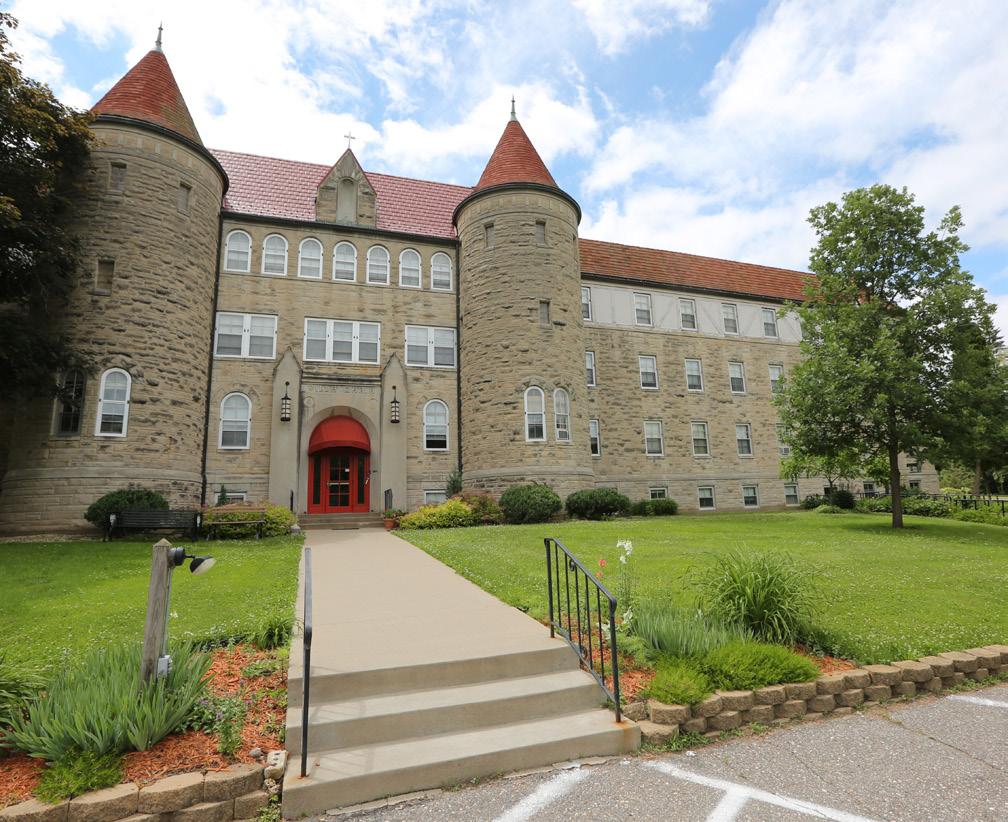
the curriculum also featured sciences from botany to astronomy. Protestant and Catholic families from Minneapolis, Chicago, and even as far as Mexico, sent their daughters to school at the Villa, which was “strictly undenominational” and touted for its healthful fresh air and sunshine.
Outside of class hours, students rambled around the wooded property and enjoyed meals with fruits and vegetables that had been grown on the grounds. This was true both during the academic year and when summer camps were hosted on site. For six glorious weeks in the summer in the 1930s, girls went horseback riding, took swimming lessons and played sports like
activity? The Church leadership should get its act together.
Loras Holmberg
St. Mary of the Lake, Plymouth
Shameful abortion actions
Shame, shame on those Catholics and other Christian voters in the United States and Minnesota State Senate, who in lockstep legislation, gave legal permanence to unrestricted, painful dismemberment to unborn human babies. This barbaric, Satanic procedure will hasten chastisement. Climate change, anyone?
The Villa’s academic building went up in flames in 1969 after being hit by a lightning strike. The school closed at the end of the academic year, with falling enrollment at Catholic schools across the archdiocese likely playing a role in the decision not to rebuild. Over the next decades, the chateau became an ecumenical retreat center under the leadership of the Ursulines who continued to make use of its scenic site. Its location along the Mississippi River also made it an especially popular place for birders to watch seasonal migrations. In 2018, a St. Paul developer purchased the property and initiated its current transformation.
Luiken is a Catholic and a historian with a doctorate from the University of Minnesota. She loves exploring and sharing the hidden histories that touch our lives every day.
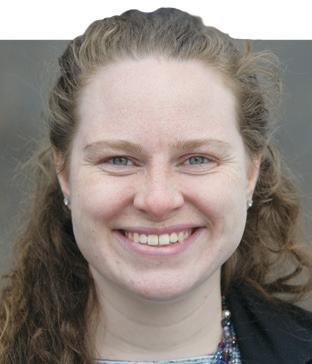
Why take offense at pregnancy centers?
In the mainstream media, I don’t see enough coverage about the vandalism done to many pregnancy centers. These are women and girls who have chosen to give life to their babies. Perhaps they need some help, physically, emotionally and financially. Why do pro-choice people take offense to that? There are many ways to prevent unwanted pregnancies. However, if it does occur, you have options. I understand some businesses are offering to pay expenses for employees and their family members who need to travel to receive an abortion. You may not believe or follow the Ten Commandments; I do. No matter how healthy, wealthy,
Everett
C. Dehmer Cathedral of St. Paul,
St. Paul
COMMENTARY 20 • THE CATHOLIC SPIRIT MARCH 9, 2023
PLEASE TURN TO LETTERS ON PAGE 23
DAVE HRBACEK | THE CATHOLIC SPIRIT
SIMPLE HOLINESS | KATE SOUCHERAY
Checking in on Lent
How is your Lent going? Have you remained committed to your intended fast and your added prayer?
Have you continued giving alms to a group you support, by turning away from a luxury you typically enjoy and offering that money to someone in need? We are now a couple weeks into Lent, and we still have several weeks to go to prepare ourselves for the great Triduum. Let’s take a moment and review what is encouraged of us during Lent so we can get started again with enthusiasm and zeal, which in Greek means “hot enough to boil.”
The Lenten season dates to the second century when early Christians wore ashes on their forehead as a sign of repentance for sins. In the fourth century, following the Council of Nicaea, it was decided that six weeks prior to Easter, all Christians would be required to engage in fasting, additional prayer and almsgiving, beginning with Ash Wednesday. When Christians were administered ashes on their foreheads, this signified that they were earthly beings who sinned and needed repentance and reconciliation. They were professing
Sitting in the confession line
I spend a fair amount of time in the confession line at the Cathedral of St. Paul in St. Paul.
There are two reasons for this. One, I need to go to confession a lot. And two, our archdiocesan seat is one of the best places to do it: It’s centrally located, has confessions available every weekday and Saturday in the late afternoon, and its rector, Father John Ubel, is a great confessor.
But one of my favorite parts about confession at the Cathedral takes place before I even make it inside the confessional. Instead, it happens when I’m sitting in the confession line — and a notorious sinner in statue form stares back at me from the side chapel.
The man depicted doesn’t necessarily look like someone who infamously betrayed the Lord. After all, here he is, prominently displayed in Christ’s church. He’s presented as a stately figure, regally holding his keys to the kingdom, while a depiction of his presence at the Transfiguration and a Latin inscription emphasizing that he’s the rock upon which Christ built his Church adorn the apse. If anything, this notorious traitor looks like someone we should look up to and emulate. It seems like he and Jesus are on good terms.
But that’s the point. St. Peter denied the Lord three times during Christ’s agonizing passion — Christ’s time of greatest need. And yet, Peter has his own dedicated chapel across from the confession line at our archdiocesan cathedral (and, I suppose, has other things going for him, like being the first pope, and enjoying eternal joy with Christ in heaven).
Not because of anything he contrived, or achieved, or earned, but because of Christ’s offer of mercy. All Peter did was receive it.
I think about this a lot during those frequent trips to the Cathedral’s confession line, Peter’s likeness staring down on me. My sins aren’t as dramatic as his were; in fact, they’re often downright petty. But they’re still instances of the same genre: betraying Christ, choosing something else — comfort, selfpreservation, my ego — instead of adhering to him.
But while my tendency in the wake of my sins is to feel shame, and to allow my failure to swallow me up, cutting me off even more from God’s love, Peter’s presence offers another way. Because if a man who betrayed Christ in such a severe and personal way could be opened to and accept God’s mercy, then surely, I can, too.
I like to think that there was some spiritually sensitive interior decorating going on when they originally laid out the Cathedral that led to a statue of such an iconic sinner-turned-saint being intentionally placed right across from the confession line. But, if not, I’m grateful for the coincidence, this coming together of a preeminent witness to God’s mercy with the means that he uses to dole it out to us today. And I’m grateful to be reminded that every visit to the confessional is an opportunity to answer the question Christ posed three times to Peter on the shores of Galilee, “Do you love me?” with a heartfelt “Yes, Lord.”
look upon the dignity of the human person in the light of divinely revealed truth, we cannot help but esteem it far more highly; for men are redeemed by the blood of Jesus Christ, they are by grace the children and friends of God and heirs of eternal glory” (Pacem in Terris, art.
develop a hunger for righteousness, which means “right everyone in our lives. Prayer opens our hearts and souls to the voice of the Holy Spirit. Giving alms brings us into solidarity with those in need and allows us to be
So, I ask again, how is your Lent going? Today is the day to recommit to our Lenten fast, our pledge to daily help restore their human dignity as children and friends of God. St. Matthew the Evangelist explained that we
because of these practices. If we recommit to our Lenten journey, the promise of a beautiful Triduum awaits us. Let us prepare ourselves during this season of Lent for the coming of the Holy Spirit into our hearts and souls. Let’s make a consecrated space for his holy presence.
Soucheray is a licensed marriage and family therapist
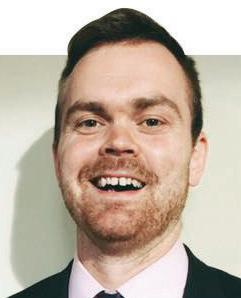
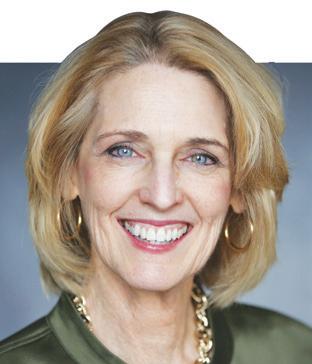
Catholic social teaching encourages us to exercise, in our public policy making and various labors, a preferential option for the poor and vulnerable. One way to think about this principle is to allow the poor and vulnerable to have the first claim on our resources and attention as we consider various policy questions.
Children — especially unborn children — are among the vulnerable populations in our society.
A key Minnesota Catholic Conference legislative priority is ensuring all children are welcomed in life and respected by law. Therefore, we are prioritizing opposition to expanding abortion, as well as efforts by social media companies to manipulate the hearts and minds of children for ideological and financial reasons. Our children deserve not only to live but to flourish.
On Feb. 28, nearly 700 pro-life Minnesotans came to the State Capitol for United for Life, an event that provided pro-life Minnesotans an opportunity to speak with their lawmakers and stand up for life (see page 5).

More than 60 meetings were held with legislators to advocate for three policies that protect life and promote mother and child well-being. Attendees opposed HF91/SF70, which repeals many of the health and safety protections for women considering abortions and expands taxpayer funding of abortion. Attendees also spoke in support of pregnancy resource centers by encouraging an increase in funding for the Positive Alternatives Grant Program, rather than the proposal in HF289/SF336, which would change the program to require grant recipients to refer for abortion upon a client’s request. The third bill for which constituents advocated proposes to remove the state sales tax on necessary baby items such as cribs and strollers.
But United for Life was just a starting point for better engagement in the legislative process. Attendees are encouraged to continue building relationships with their legislators through constructive and respectful conversations about protecting our most vulnerable brothers and sisters.
Later in the week, MCC testified in support of HF1503 to prohibit the use of social media algorithms to target youth with specific platforms and content. Limiting the impact of social media provides a concrete step toward mitigating the evidential mental health harms during teens’ most formative years.
Youth are increasingly spending more time on social media. According to a Pew Research poll, 89% of teens are online “almost constantly,” or at least “multiple times a day.” A 2023 report by the CDC found that “nearly three in five teenage girls felt persistent sadness in 2021. And one in three girls seriously considered attempting suicide, up 60% from a decade ago.” Additionally, youth who spend the most time on social media reportedly have a 13-66% higher depression rate.
It is not a secret that the increased use of social media has contributed to these feelings of sadness, anxiety and depression.
We should not let Big Tech and their accompanying algorithms shepherd the lives of our children. We can limit the control these algorithms have over our teens and free them from the confines of social media giants who do not have their best interests in mind.
MARCH 9, 2023 THE CATHOLIC SPIRIT • 21
ALREADY/NOT YET | JONATHAN LIEDL
Liedl, a Twin Cities resident, is a senior editor of the National Catholic Register and a graduate student in theology at The St. Paul Seminary School of Divinity in St. Paul.
The Catholic Spirit’s former editor-in-chief (Maria Wiering) asked me to write for the “Why I am Catholic” series back in September. Although honored, I really thought there were better candidates than me. When she (Wiering) left to pursue her career elsewhere, I thought maybe I was off the hook. But in taking the request to prayer, I realized this was a wonderful opportunity for me to explore my faith life. Though, I did end up more in the camp of “Why I am STILL Catholic” and found that it is all because of God.
I was raised Catholic and as a child, assumed everyone was Catholic. (Turns out, they are not.) Early on, I was taught that God loved me (thank you, Sister Theresa Marie). That was the foundation I built my faith on because for the rest of my life I would lean into that love.
Statistically, I probably should have fallen into the “lost” category of Catholics. My six siblings left the Church early on and I experienced plenty of logical reasons to become just another “fallen away” Catholic. Disappointed, discouraged and disillusioned, I could have walked away had it not been for the “nagging” belief that no matter what, God loved me. Nagging, because God was relentless in his pursuit of me. To me, the Church taught all the right things, but my experience was that not a lot of people followed those teachings. In fact, quite the opposite. In my world, there was not much in the way of kindness and consideration and truly little in the way of hope. In my head, I separated God from the Church early on and my personal faith life always depended and relied on this “bigger” version of God.
The reason I am Catholic today is simply because of God’s persistence. I believe in his presence in the Eucharist. I still have the God of my childhood who just never let me go. Church is where I am both figuratively and literally fed. God remains my constant source of comfort and care. The Eucharist and my ongoing, lengthy
Why I am Catholic
By Mary Asp
and sincere conversations with God were and are what keep me going to Church. My prayer life is rich, and he answers my prayers — albeit not always how I think they should be answered. I have a healthy respect for his will, even though I sometimes think I know better!
He seems determined to use me — even through the worst times of my life. He helped me sort through and find where he was amid all the chaos. Perhaps, I continued to be Catholic because in my trials and tribulations he showed me both patience and the graces of sacrifice. I learned the ability to function within dysfunction, and to forgive even when there were no apologies. While the earthly Church experiences turmoil and shortcomings, I know that the Church has struggled throughout history. Our current struggles in the Catholic Church are more contemporary, but still do not erase the knowledge of his gift to us all. His promise of everlasting life continues to give me the courage to keep taking leaps of faith. I willingly will defend the Church only because of him. Within every family there is turmoil, heartache and betrayal, even in this family we call Church.
So, my faith is quite simple. God loves me and has promised me eternity. He is the only author of hope I answer to. I cannot earn my way into heaven, but I can try to continue to live with God as my navigator. He has not and will not let me go.
Asp, 67, is the parish business administrator at Our Lady of Lourdes in Minneapolis. She has four adult sons and likes to read, sketch, cook, sing, sew and spend time with friends and family. She spends a lot of time in prayer and reflection and journals daily.
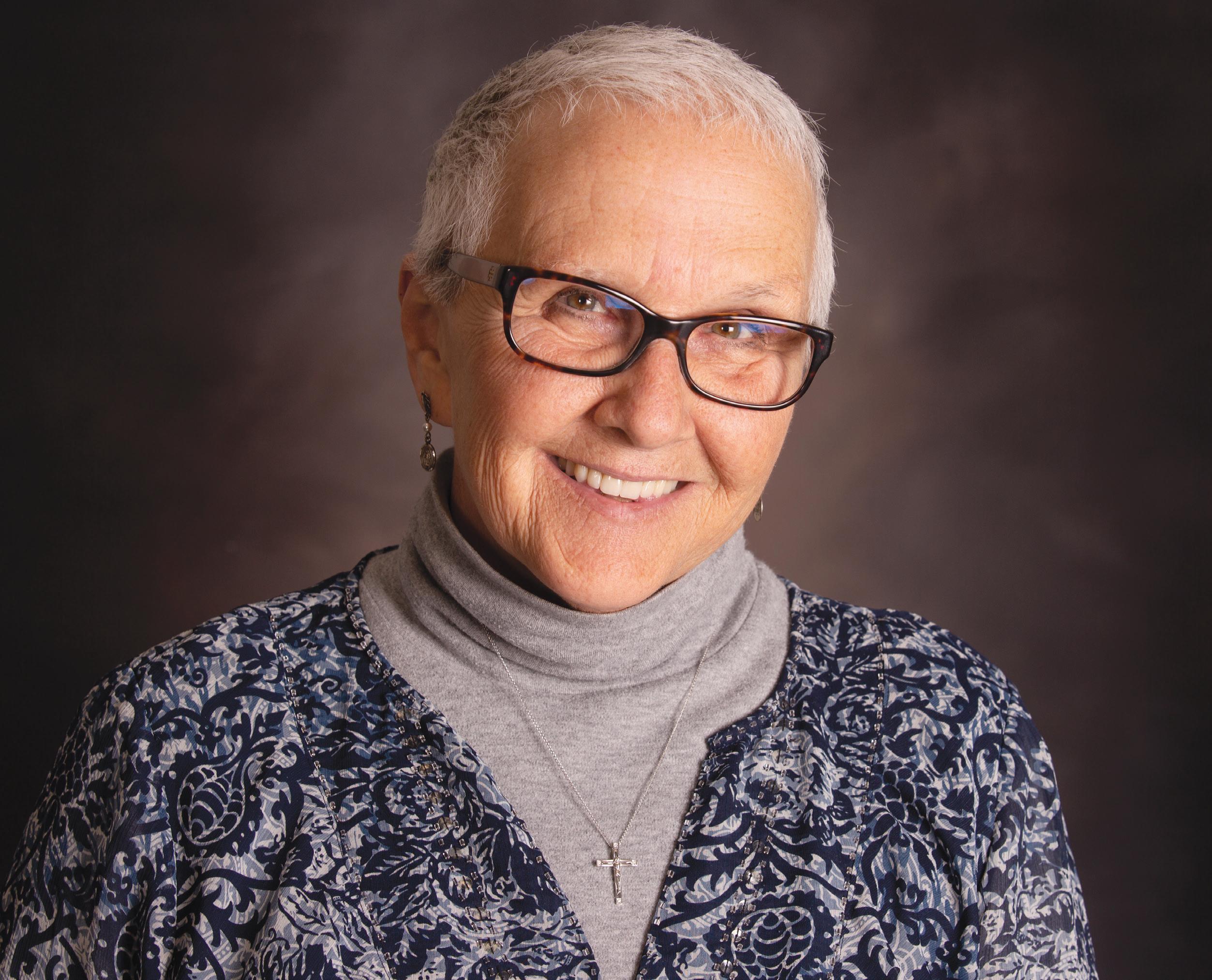
“Why
DAVE HRBACEK | THE CATHOLIC SPIRIT
I am Catholic” is an ongoing series in The Catholic Spirit. Want to share why you are Catholic? Submit your story in 300-500 words to CatholiCSpirit@arChSpm org with subject line “Why I am Catholic.”
22 • THE CATHOLIC SPIRIT MARCH 9, 2023
CALENDAR
See the full Calendar under Local Events at TheCaTholiCSpiriT Com Check out the Fish Fry Guide for updates at TheCaTholiCSpiriT Com/nomeaT
PARISH EVENTS
St. Patrick’s Day Mass — March 17: 9:30 a.m. at the Cathedral of St. Paul, 239 Selby Ave., St. Paul. Celebrant: Archbishop Bernard Hebda. The Ancient Order of Hibernians will be present. CathedralSaintpaul org
Ham Bingo — March 18: 5–9 p.m. at St. Matthew, 510 Hall Ave., St. Paul. (Door #5) Bingo, featuring 12 games for hams and three games for cash. Doors open at 5 p.m., games start at 5:30 p.m. Food, beer, wine and pop available for purchase. Expected completion time is between 8:30–9 p.m. Sponsored by St. Matthew’s Men’s Club. St-mattS org
St. Catherine’s Ham Bingo — March 26: 2 p.m. at St. Patrick of Cedar Lake, 24425 Old Highway 13 Blvd., Jordan. St. Catherine’s first ham bingo, in basement of social hall. Includes $1 per card, $10 a card for 20 games. Light meal.
WORSHIP+RETREATS
Men’s Retreat — March 11: 9 a.m.–5 p.m. at St. Paul, 1740 Bunker Lake Blvd. NE, Ham Lake. Presented by Catholic speaker, musician and faith-filled leader, Pat Millea. Theme is St. Joseph: Model for Manhood. This is not a retreat for perfect men; this is a retreat for men who have a desire for greater joy, peace, passion and fulfillment in their lives.
ChurChofSaintpaul Com/menS-retreat
LETTERS CONTINUED FROM PAGE 20
intelligent or famous you are, your next breath is dependent on God and you will die someday. I believe we will all be accountable to our God who made us. God bless America.
(Versions of this letter also appeared Oct. 13 in the Ladysmith News, Ladysmith, Wisconsin, and Dec. 22 in Shakopee Valley News, Shakopee.)
Bernadette Ohnsorg
Sts. Joachim and Anne, Shakopee
Thank you ... and one more Benedict story
Thank you for the heartwarming stories of Pope Benedict’s influence on our Church (Feb. 9 edition). I would like to share my unique story, because Benedict saved my family. As a lay member of the Regnum Christi spiritual family, with Legionaries of Christ our
Catholic Health Care Workers Lenten Retreat — March 11: 10:30 a.m.–3:15 p.m. at St. Mary, Lowertown, 261 E. 8th St., St. Paul. Theme is “Jesus the Great Physician: Catholic Witness in a Secularized Medical Profession.” Join Father Byron Hagan for an 11 a.m. Mass followed by catered lunch, talks, Stations of the Cross (for health care), adoration and Q and A. CuratioapoStolate Com/eventS-2/upComing-eventS

Lenten Days of Prayer: March 15 and 22:
9:30 a.m.–2:15 p.m. at Franciscan Retreats and Spirituality Center, 16385 St. Francis Lane, Prior Lake. Confessions, spiritual direction, a prayer experience, Stations of the Cross and Mass. Bring a bag lunch. Beverage provided. franCiSCanretreatS net
Women’s Day of Reflection, “Celebrating Female
Mystics” — March 18 at Christ the King Retreat Center, 621 First Ave. S., Buffalo. Presented by Susan Stabile. Lunch included. kingShouSe Com
Silent Midweek Retreat for Men and Women, “Shepherd Me, O God” — March 21-23 at Christ the King Retreat Center, 621 First Ave. S., Buffalo.
kingShouSe Com
CONFERENCES+WORKSHOPS
Sidewalk Counseling Training — March 21:
7–9 p.m. at Holy Family, 5900 W. Lake St., St. Louis Park. No charge. Presented by Pro-Life Action Ministries. Contact thomaS wilkin@plam org or (651) 797-6366. More info at plam org/events or tinyurl Com/uCfjr45h
Converging Roads: Catholic Health Care Ethics
— April 1: 8 a.m.–6:45 p.m. at St. Mary’s University
spiritual fathers, I endured our family crisis and survived, thanks to the wisdom of Benedict. When we learned of the grave misconduct and double life of our founder (removed from ministry), some said our institution should be disbanded. Benedict was convinced that there was a substantial core of validity in our life and played a providential role in Regnum Christi’s survival. He appointed pontifical delegates to accompany us through an arduous renewal process, helping to purify what needed to be purified. He invited us to discover our vocation within the Church in greater depth. This resulted in approval of new constitutions of the Legion of Christ, and statutes of the Regnum Christi Federation (2019). With fellow members in our Twin Cities locality of Regnum Christi, we thank the most important theologian of the 20th century. May we imitate his virtues.
Lois Taylor St. Vincent de Paul, Brooklyn Park
of Minnesota, 2540 Park Ave., Minneapolis. Regional conference series offering continuing education for health care professionals to practice the highest ethical and medical standards. Mass, speakers.
tinyurl Com/46mr33bk
Catholic Scout Leader Summit — April 22: Noon–4:30 p.m. at St. John Neumann, 4030 Pilot Knob Road, Eagan. The Archdiocesan Committee on Catholic Scouting (ACCS) is hosting an afternoon of learning for all Catholic Scout leaders (Cub Scouts, Scouts BSA, Girl Scouts, American Heritage Girls). Free. Begins with lunch, ends with Mass (optional). Child care provided. SCoutingevent Com/250-66928
SPEAKERS+SEMINARS
Unity Catholic High School Breakfast Club — March 14: 7–8 a.m. at Mary, Mother of the Church, 3333 Cliff Road E., Burnsville. Speaker: Paul Hillen, author, executive coach and consultant, on leading with faith in a secular world. Hillen has held leadership positions with Procter & Gamble and Cargill. He serves on The St. Paul Seminary Board of Directors. He is the author of “How Goodness Pays.” unityuCatholiCmn org
Great Desire: Pope Francis’ liturgy document and ongoing liturgical reform — March 30: 6:30–8 p.m. at St. Thomas More, 1079 Summit Ave., St. Paul. Father Anthony Ruff, OSB, will present an examination of Pope Francis’ vision of liturgy in his recent document “Desiderio Desideravi.” Cost: $5 for members, $20 for nonmembers. Sponsored by the Association of Liturgical Ministers. almSpm org/eventS/2023/popefranCiS
Defense of life
I was pleased to read in the Feb. 9 issue of The Catholic Spirit, that the archbishop, several priests and other adults accompanied a number of young women and men to Washington, D.C., for the national March for Life. However, back home here in Minnesota, legislation was passed that sets the state on a path to unlimited abortion. The article mentioned that the Minnesota Catholic bishops had jointly written to all of the elected officials at the State Capitol to reject HF1 without much success. I would have rather seen the bishops speak out to the public with opinion pieces in the papers and other media. Especially social media, considering how personal devices now command the attention of the younger audience. Also, I would like to see the “Respect Life Outreach” ministry broken out of
CALENDAR submissions
DEADLINE: Noon Thursday, 14 days before the anticipated Thursday date of publication. We cannot guarantee a submitted event will appear in the calendar. Priority is given to events occurring before the next issue date.
LISTINGS: Accepted are brief notices of upcoming events hosted by Catholic parishes and organizations. If the Catholic connection is not clear, please emphasize it in your submission. Included in our listings are local events submitted by public sources that could be of interest to the larger Catholic community.

ITEMS MUST INCLUDE:
uTime and date of event
uFull street address of event
uDescription of event
uContact information in case of questions
TheCatholiCSpirit Com/CalendarSubmiSSionS
the “Marriage, Family and Life” office to receive the attention and resources it deserves in today’s world. It is now one of 16 ministries in that area to be covered by a relativity small staff. We need a clear message, less preaching to the choir, based on genuine teaching of the Catholic Church and holy Scripture presented to the general population that will persuade these elected officials to vote for the actual views of Minnesotans.
Rich McCabe St. Michael, Farmington
Share your perspective by emailing TheCaTholiCSpiriT@arChSpm org Please limit your letter to the editor to 150 words and include your parish and phone number. The Commentary pages do not necessarily reflect the opinions of The Catholic Spirit. Read more letters from our readers at TheCaTholiCSpiriT Com
HANDYMAN
WE DO 1,162 THINGS AROUND THE HOME!
Catholic Owned Handyman Business: We will fix/ repair and remodel almost anything around the home. Serving entire Metro. Call today. Mention this ad and receive 10% off labor. ACE Handyman Services 952-946-0088.
HARDWOOD FLOORS
PAINTING
Merriam Park Painting. Professional Int./ Ext. Painting. WP Hanging. Moderate Prices, Free Estimates. Call Ed (651) 224-3660. Michaels Painting. Texture and Repair. MichaelsPaintingllc coM. (763) 757-3187
PRAYERS
Jeff Cavins and more!
$5/month includes shipping. Subscribe online at www.lighthousecatholicmedia.org/cdclub
Please Enter Code: 1195
Sweeney’s Hardwood Floors Winter’s Here! Spruce up your home with new or refurbished hardwood floors. 15% off refinishing. Sweeney (651) 485-8187
PAINTING
For painting & all related services. View our website: PAINTINGBYJERRYWIND.COM or call (651) 699-6140.
NOTICE: Prayers must be submitted in advance. Payment of $8 per line must be received before publication
RELIGIOUS ITEMS FOR SALE
www.Holyart.com
Over 50k Religious Items & Church Goods.
MARCH 9, 2023 THE CATHOLIC SPIRIT • 23 TO ADVERTISE IN THE CLASSIFIEDS classifiedads@archspm.org Email: classifiedads@archspm.org • Phone: 651-251-7714 • Fax: 651-291-4460 Next issue: 3/23/23 • Deadline: 3 p.m. 3/15/2323 • Rates: $8 per line (35-40 characters per line) • Add a photo/logo for $25 Marketplace • Message Center Classified Ads Ask about our 3 special!time ACCESSIBILITY SOLUTIONS STAIR LIFTS – ELEVATORS WHEELCHAIR LIFTS FOR HOMES, CHURCHES & SCHOOLS Arrow Lift (763) 786-2780 ANTIQUES TOP CASH PAID For Older Furniture • Advertising Signs • Beer Items • Old Clothes • Misc. (651) 227-2469 ATTORNEYS Virginia Ryan, Attorney at Law Trusts, Wills, Probate, Real Estate 1959 Sloan Pl. #110; Maplewood, MN 55117 (651) 631-0616 www.virgielaw.com (651) 227-2469 CEILING TEXTURE Michaels Painting Popcorn Removal & Knock Down Texture TextureCeilings.com (763) 757-3187 CEMETERY LOTS FOR SALE Resurrection Cemetery: 2 Non-Monument Plots.
$1,980 each or $3,960 for both.
$2,960 for both. Contact: 612-716-4497
Cemetery: 1 crypt $15,195; Walter Polchowne (336)
CEMETERY LOTS FOR SALE St. Anthony Cemetery: 2 cremation lots. $2000/pr. 651-210-0794 GREAT CATHOLIC SPEAKERS CD of the Month Club Lighthouse Catholic Media, Scott Hahn,
Value:
Sale:
Resurrection
929-6853
TheCatholicSpirit.com
Finale of Shakopee parish’s 40th passion play marks the end of a tradition
By Susan Klemond For The Catholic Spirit
Kristopher Brown recalls that when he was about 7, a tall, long-haired man in the role of Jesus walked by his pew in a Shakopee church during a Lenten passion play.
As the actor portraying the risen Christ reached out to audience members, Brown focused on the red mark on his hand representing the place where a nail passed through Jesus’ hand during the crucifixion. That image has stayed with Brown, now 29, who will play the role of Christ this month in the same play he grew up watching on the St. Mark campus of Sts. Joachim and Anne in Shakopee — “The Passion of Jesus in Music, Word and Light.”
“It’s just a memory that’s stuck with me to this day,” said Brown, who now lives in Dearborn, Michigan. He returned to Shakopee last year and will again this year to play Jesus. Now playing “Jesus, with the injury on my hand walking through the aisle and doing the same for the audience, it’s really cool.”
This year is particularly significant — it marks the 40th and final production of the passion play, sponsored all these years by the Shakopee Knights of Columbus. Four performances remain from March 22-25 with Brown and as many as 100 other cast and crew members.
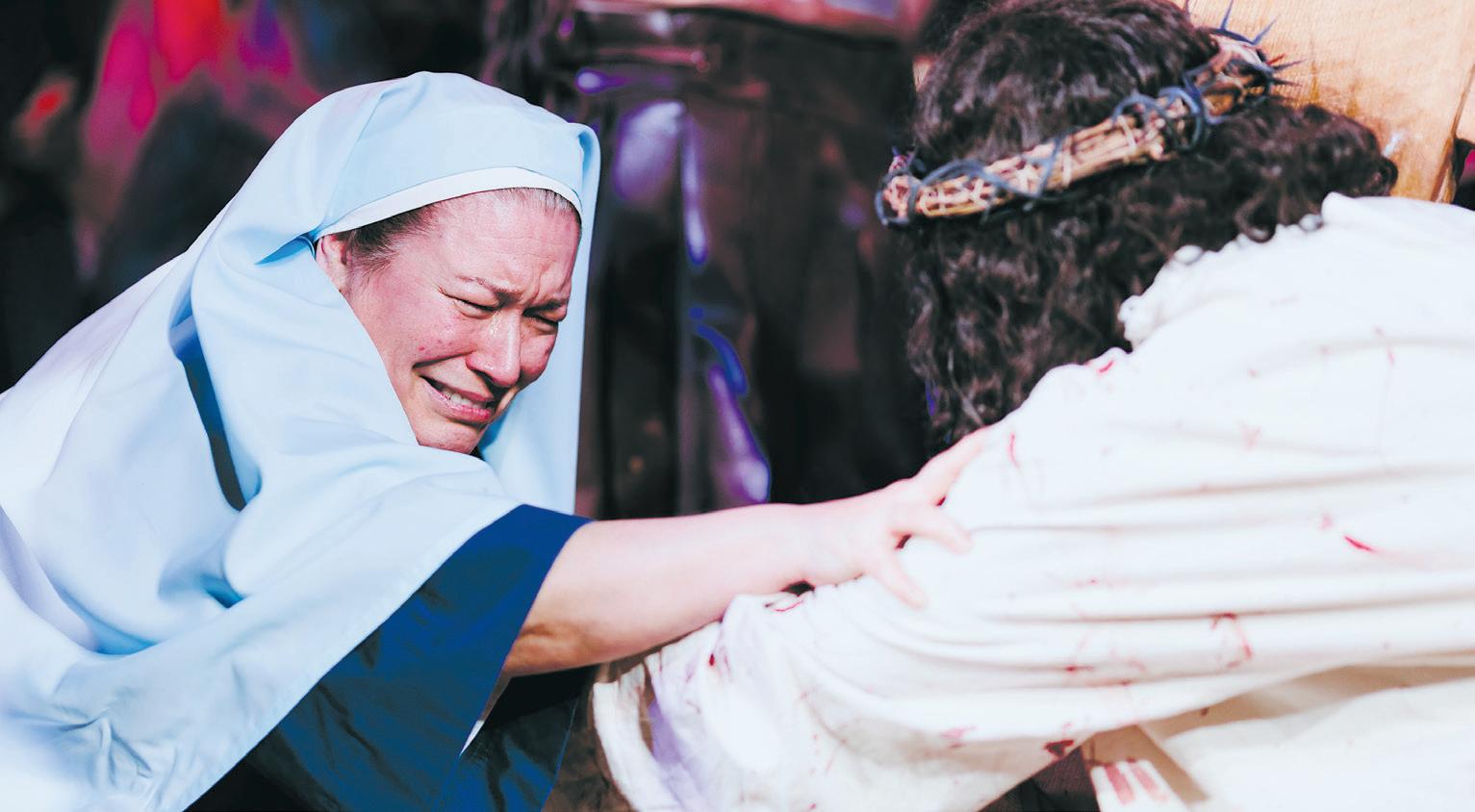
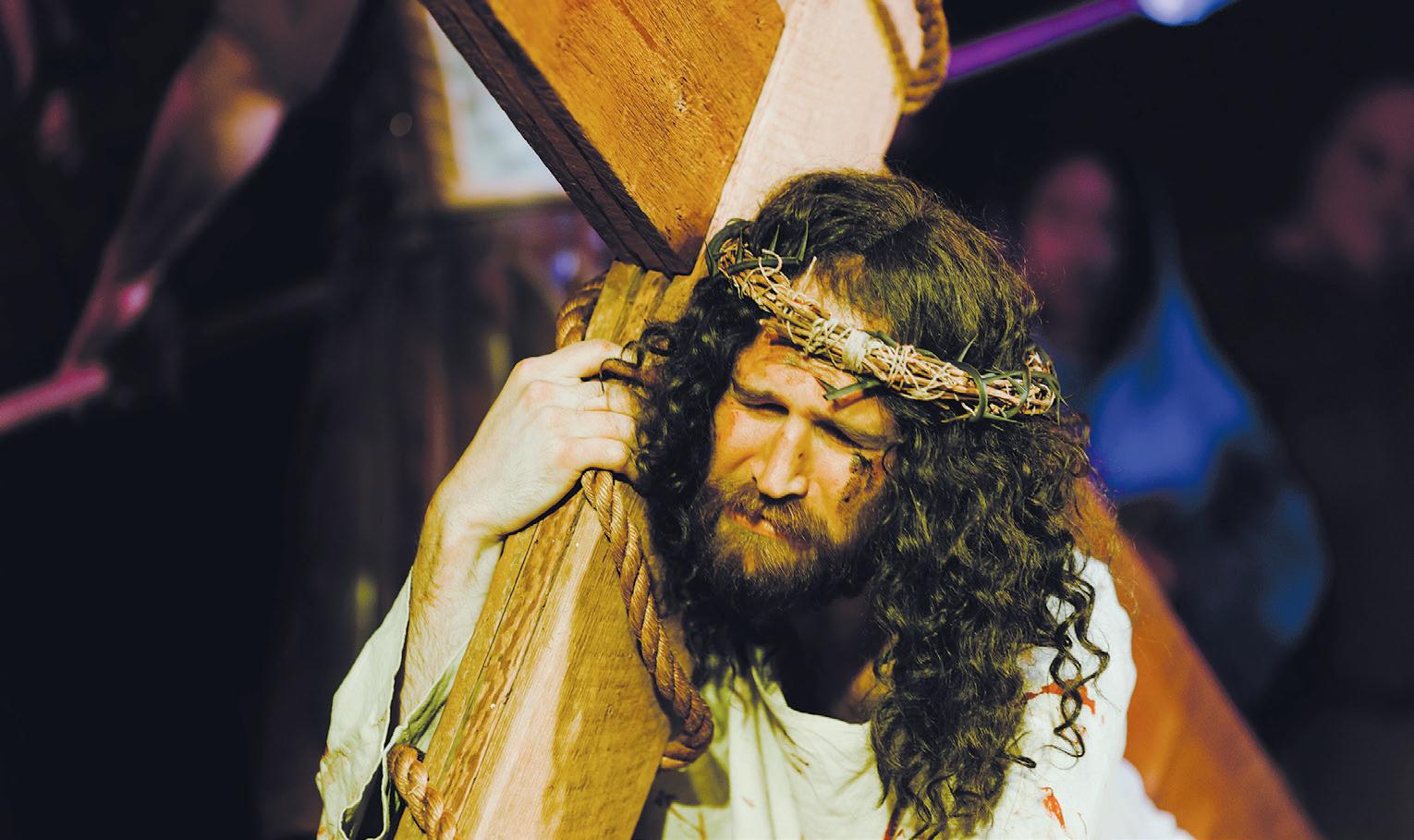
Brown played Jesus in several other plays as a teenager, and for him, “Being in the role of Jesus has really helped center it. This is what we’re truly celebrating, the sacrifice, and of being absolved of original sin.”
The passion play will close permanently after the March 25 performance, largely because its leaders are ready to retire and no one has come forward to take their place, said Mike Bemis, 67, who has directed the play for more than 10 years. As much as possible will be sold of the staging, costumes, props and lighting, which Kathleen Philipp, director of music for the play, has stored at her home for the past several years, leaders said.
Several Catholics who have been involved for decades, and some who joined the cast just last year, reflected recently on the play’s origins, some of their roles on and off stage, and the challenge of finding a new generation of leadership.
In 16 narrated scenes, the cast depicts Palm Sunday, the Last Supper, Stations of the Cross and the Resurrection. The actors do not speak or move much. Their facial expressions and the lighting, narration and music tell the story.
The play — which has been performed in all but three of the last 43 years — is an opportunity for prayer and reflection, said David Schmieg. Schmieg, 70, has been involved for 32 years and now produces, manages the publicity and helps direct the play.
“I always imagine myself alone looking at a beautiful painting in a museum almost,” he said. “The music just moves you in the right direction. It’s just a chance for reflection, which we don’t get very often in this world.”
Father Michael Becker said he saw
the play for the first time last year, not long after being assigned as pastor of Sts. Joachim and Anne. He said he appreciates the community that has been built around it.
Sts. Joachim and Anne parish was formed with the 2012 canonical merger of St. Mark, St. Mary and St. Mary of the Purification of Marystown. Thirty-two years before that, in 1980, the Shakopee Knights of Columbus Council 1685 brainstormed about Lenten activities at St. Mark, according to a history of the play. A parishioner, the late David Czaja, suggested organizing a passion play.
The pastor at that time, the late Father Robert Cassidy, wrote the script and directed the first play with 12 cast members. Father Cassidy’s script, without dialogue, has been enhanced but is still used, Schmieg said.
Philipp, who was parish choir director at that time, said she pulled together music for the first play from the choir’s Lenten hymns. The program now includes a variety of music, including several of Philipp’s own compositions, she said.
“What we’re doing in singing is we’re keeping up with the action of the play,” said Philipp, 86, who has directed the music for all 40 of the play’s productions. “It all goes together.”
During the play’s history, scenes have been added and changed and some character movement introduced, Bemis
said. A former parishioner, he started as an apostle in the cast in the early 1990s and now lives in Menominee Falls, Wisconsin.
Since the beginning, the Shakopee Knights of Columbus have supported the play, providing financial sponsorship for a number of years until the play could cover costs through donations and fundraisers, Schmieg said. The Knights continue to provide insurance and help with play setup. Cast, crew and choir members — both children and adults — are parishioners, including many Latinos, plus members of other parishes and Protestant churches. Some come from other towns, Bemis said.
While the play’s leaders take on tasks year-round to make certain the production is ready for the next Lent, all rehearsals and performances happen during a single week. Many cast and crew members know each other from participating year after year, Schmieg said. “You just look forward to seeing the people every year, celebrating the way we do.”
Schmieg said his first five years with the play were some of his best because he portrayed Jesus. “All you need to do is sort of try to experience what Jesus experienced and it moves you in certain ways.” He remembers the scourging scene that features a real whip. “For the most part it didn’t hurt, but it looked
LAST CALL
u�“The Passion of Jesus in Music, Word and Light” will be performed March 22-25 at the St. Mark campus of Sts. Joachim and Anne in Shakopee. The March 24 performance will be narrated in Spanish.
u� A musical prelude begins at 7:40 p.m., followed by the performance 8–9 p.m. u�Free admission; no reserved seating. uSt. Mark, 350 Atwood St. S., Shakopee.
pretty authentic,” he said. “When my kids came to the (play) it upset them that they were whipping me, so it must have looked pretty authentic.”
Jessica Plekkenpol, 16, played a spectator in her debut last year. She said she felt like part of a family. “I had a hard time putting my veil on my head, so some of the makeup people would help me … so I wouldn’t have to stress about that,” said the Shakopee High School sophomore, who attended the play with her family every year when her father was an usher for the performances.
Plekkenpol said the play helps her enter into Holy Week “because the passion play shows you almost everything. His last supper, his rising from the dead.”
Before performances, cast and crew members say a prayer. “Everybody can speak what they’re thinking about,” said Bemis, adding that nearly all have felt their faith affected by the play.
The play’s music affects Steve Wagner, who has been involved for 35 years. “What we do in the play to reflect back on what Jesus went through — it’s back to when it all happened,” he said.
Wagner, 76, said he first played an apostle during his 30 years in the cast. For the past five years, he’s worked behind the scenes, including putting up and taking down the stage and helping manage the cast.
The cast performs on a roughly 26-by20-foot wooden stage that rests on the church’s raised altar area. Cast members are barefoot to reduce noise, and change scenes on the darkened stage, he said.
LED lighting has replaced the original incandescent lights, Schmieg said.
Nature helped with lighting during a performance in the late 1980s, he said, when a lightning flash lit up the darkened church just as the choir sang “Jesus was crucified.”
Only fire and the pandemic have shut down the play. Fire damage to St. Mark’s church stopped the 2006 production and COVID-19 canceled the 2020 and 2021 productions.
The close of the final performance promises to be an emotional moment. Many involved in the play say its content already brings some people to tears — on and off the stage. But Bemis hopes the production won’t have a sad ending.
“All good things must end, I guess,” Bemis said, adding, “Since we announced it’d be our last year, we’re thinking maybe in the background somebody’s thinking, ‘Well, maybe I can carry this on.’ We’ll see,” he said. “That’s our hope.”
24 • THE CATHOLIC SPIRIT MARCH 9, 2023
THELASTWORD
COURTESY EMILY ISAKSON PHOTOGRAPHY
Anita Flores portrays Mary with Jesus as he carries the cross.
COURTESY EMILY ISAKSON PHOTOGRAPHY
Kristopher Brown as Jesus in last year’s production of “The Passion of Jesus in Music, Word and Light,” at St. Mark church in Shakopee. Brown will reprise his role this year.




































 By Dave Hrbacek
By Dave Hrbacek







 Father VanHoose is pastor of St. Jude of the Lake in Mahtomedi.
Father VanHoose is pastor of St. Jude of the Lake in Mahtomedi.












